Entering Japan
Below is a basic introduction to the Japanese immigration system. Contact your closest Japanese embassy or consulate outside Japan or an immigration bureau inside Japan for official advice.
All foreigners, including foreign residents, get fingerprinted and photographed upon entering Japan as a measure aimed at preventing terrorism and other illegal activities. Excluded from this procedure are persons under the age of 16 and a few special groups, such as diplomats and visiting dignitaries.
All foreigners receive a status of residence when entering Japan. There are more than twenty statuses of residence, including "temporary visitor" for tourists, and a range of statuses for students , workers and relatives of Japanese nationals and residents.
If you are a citizen of one of the over 50 countries with which Japan has a "general visa exemption arrangement", you need only a valid passport to enter Japan as a "temporary visitor". Otherwise, you need to obtain a visa before entering the country. Temporary visitors from most countries are allowed to stay for up to 90 days.
If you are a citizen of Austria, Germany, Ireland, Liechtenstein, Mexico, Switzerland or the United Kingdom, you have the possibility to extend your stay to a total of up to six months. You still initially enter Japan on a 90 day permit, but can then apply for an extension at an immigration bureau in Japan.
Visitors to Japan are encouraged to use Visit Japan Web to digitally submit immigration and customs-related information ahead of their arrival for a smoother entry into the country without the need to fill out paper forms. The system can be used to also create a tax exemption QR code for an enhanced tax-free shopping experience.
Temporary visitors are not allowed to engage in any paid activities. However, short term studies at Japanese language schools are permitted.
All foreign tourists in Japan are required to carry their passports with them at all times.

Longer stays for the wealthy and digital nomads
If you are a citizen of one of the over 50 countries with which Japan has a "general visa exemption arrangement" and have savings of over 30 million yen, you and your spouse may qualify to stay in Japan for up to one year for the purpose of sightseeing and recreation. Likewise, professionals with an annual income of over 10 million yen may qualify to work remotely from Japan for up to six months. Respective visas (for "long-term residents for sightseeing/recreation" or "digital nomads") have to be obtained before traveling to Japan.
White-collar work
Foreigners who wish to work in Japan need to get a work visa from a Japanese embassy or consulate outside of Japan to enter the country on a status of residence permitting work.
There are over a dozen such statuses of residence, each allowing the holder to work only in a specific professional field, for example, journalism, arts, research, education, engineering, entertainment, business management, international services, etc. If you change jobs while you are in Japan and your new job falls into a different professional field (e.g. from education to engineering), you will need to change your status of residence.
A university degree or considerable professional experience in the applicable field is required to qualify for most work visa types. Most also require you to have a prospective employer as a sponsor. Residence permission is granted in periods of 4 months to 5 years and is extendable.
Workers may bring their spouses and children to Japan on a dependent visa. Dependents are not allowed to engage in any paid activities unless they get permission from the immigration office, but even then, they may work only a set maximum number of hours per week.
Other work and trainees
The so-called "Specified Skills" status allows for work in one of over a dozen professional fields, including construction, hospitality, nursing and manufacturing. Applicants do not need a degree but have to pass a technical skills test and know some Japanese. There are two types: Type 1 allows workers to stay in Japan for up to five years, but they may not bring their family. Type 2 is for more highly qualified workers, can be extended indefinitely and allows for the family to live in Japan. Type 1 holders may upgrade to type 2 after five years.
Furthermore, there is the "Technical Intern Training Program", which lets foreign workers acquire skills at a workplace in Japan that they could not otherwise acquire in their home countries. After a few years, participants become eligible to switch to the above-mentioned "Specified Skill" type 1 status. Most trainees come from South East Asia.
Working holidays
This is a special visa type that allows some paid activity for citizens of Australia, Canada, Denmark, Germany, France, Ireland, Korea, New Zealand, the United Kingdom and a few other countries between the ages of 18 and 30. Consult the working holiday visa page for details.
Foreigners who wish to study in Japan (except for short term studies at language schools ) need to get a student visa at a Japanese embassy or consulate outside of Japan in order to enter the country on a status of residence that permits long term studies.
Sponsorship from an educational institution in Japan and proof of sufficient funds to cover all your expenses during your stay are required to qualify for a student visa. Residence permission is granted in periods of between 3 months and 4 years and 3 months and is extendable.
Students must not engage in paid activities unless they get permission from the immigration office. Even then, students may work only a set maximum number of hours per week.
Foreigners who are married to a Japanese national or to a permanent resident of Japan can obtain a spouse visa, which allows them to engage in any paid activity in Japan. Residence permission is granted in periods of 6 months or 1, 3 or 5 years and is extendable.
Staying in Japan
Inside Japan, most immigration-related matters, such as extending residence permission or changing the status of residence, are handled by the Immigration Services Agency, which has bureaus across the country.
Residence card
All new foreign residents are issued a residence card upon initially entering Japan at Narita , Haneda , Kansai or Chubu airports. New residents arriving through different ports can get their cards at their municipal offices.
The residence card is an important document required for opening a bank account , obtaining a cell phone , converting a drivers license and similar activities. It stores the holder's personal information, including the current address, the status of residence and period of stay. Foreign residents are required to carry their residence card with them at all times.
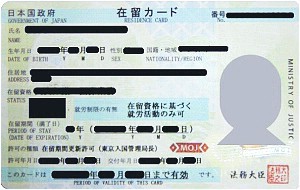
Extending residence permission
Most statuses of residence allow you to stay in Japan for a period between three months and five years. If you wish to stay longer, you must apply for an extension at an immigration bureau inside Japan before the expiry date of your current residence permission.
The application process is relatively simple, provided that you still fulfill the conditions for the specific status of residence. It typically takes a couple of days or weeks for the application to be processed, and you are allowed to remain in Japan during that time even if your previous residence permission expires in the meantime.
Changing status of residence
It is possible to change your status of residence (e.g. from instructor to arts or from student to engineer) at an immigration bureau inside Japan. You will have to provide similar documentation as you would when applying for a new status of residence at an embassy or consulate outside of Japan.
Re-entry permits
Foreign residents who wish to temporarily leave Japan for longer than a year, need to get a re-entry permit before departing Japan; otherwise, they lose their status of residence. Re-entry permits can be obtained at immigration offices in Japan. For absences of less than one year, re-entry permits are not required.
Permanent residence
Foreign residents, who have shown good conduct and have sufficient assets or ability to make an independent living, can be granted permanent residence if they reside in Japan for a certain number of consecutive years. For highly-skilled professionals and spouses of Japanese nationals, the minimum amount of years is typically one to five years, while for others it is typically ten years. Permanent residence status is indefinite and allows for any paid activity.
Naturalization
Foreigners, who have resided in Japan for at least five consecutive years (less if married to a Japanese national), have shown good conduct, have never plotted against the Japanese government, have sufficient assets or ability to make an independent living and are willing to renounce any other citizenship held, can be granted Japanese citizenship.
Questions? Ask in our forum .
Links and Resources
A guide to japanese visas, japan customs, guide to the animal quarantine service, the ministry of foreign affairs, immigration services agency of japan.

Travel to Japan
A record 24.04 million people visited Japan in 2016, welcomed by Japan's spirit of omotenashi . A nation where tradition and modernity share the same space, Japan offers an exciting, unique experience for everyone. From Tokyo’s urban sprawl to the peacefulness of Kyoto, from boisterous Osaka nightlife to Hiroshima's contemplative spirit, Japan’s attractions never fail to dazzle visitors. The amazing food, unique culture, and warm hospitality will keep you coming back!
To get you started, here are some useful tools for your trip: Convert US Dollars to Japanese Yen ・ Japan Weather Forecast ・ Japan train route finder (trip planner) ・ Another train route finder Download DC-based Japan Travel Agencies & JR Pass Distributors
Do I need to bring anything special?
Not usually - just a valid passport. If you are a US citizen, you do not need a visa to travel to Japan for up to 90 days with a roundtrip ticket. The purpose of your visit must be tourism, visiting relatives/acquaintances, attending a conference, etc.
Japan has made agreements to waive visa requirements for tourism with 61 countries and regions. You can find more information about this on the Embassy's visa section page . If you need to obtain a visa for your travels, please contact your nearest Consulate General of Japan or call the Visa Section of the Embassy at 202-238-6800.
Where should I visit in Japan?
What can i bring through customs, can i use a credit card, is japan a safe country, do japanese people speak english, what do i do if i need help or get lost, how can people call me while i'm in japan.
To call Japan from the U.S., dial 011 81 , followed by the area code and phone number. For Japanese cell phones, the area code is 80 or 90. Other common codes are 3 for Tokyo, 78 for Kobe, 75 for Kyoto, 6 for Osaka, and 82 for Hiroshima. If you're given a number that starts with 0, remove it and dial the rest. So, if the number is 080, just dial 80. You can also look up numbers via the Japan Phone Book.
Other options for calling abroad include VoIP services such as Skype .
How is Japan's public transportation system/How can I get a "JR Rail Pass"?
Excellent! Japan has an extremely modern subway and rail system, as well as the famous shinkansen bullet trains, and a large network of buses. Japan-Guide has an excellent guide to transportation in Japan, including information on the numerous tickets and passes available. You can also use the Japan train route finders at the top of this page.
The Japan Rail Pass is one of the most popular option if you'll be traveling long distances by train, or if you're looking for an economical solution for sightseeing. Japan-Guide has more information about the rail pass, but we also have a list of distributors in the DMV area available on our DMV Resources page . You must purchase an Exchange Order before you travel to Japan. You cannot buy a Japan Rail Pass in Japan.
For information about traveling on public transport system with a wheelchair or other disabilities, please check our special circumstances section below.
Can I use a drone/UAV in Japan for tourism?
UAVs are under the jurisdiction of the Ministry of Land, Infrastructure, Transport, and Tourism. Their website has a guide in English for those who would like to use UAVs in Japan.
For laws in specific cities and prefectures, you can try and contact local film offices, who might be able to provide you with information on filming with UAV.
What about prescription medications?
Medications are restricted by the Ministry of Health, Labour, and Welfare. Certain medications require a Yakkan Shoumei import/export certificate which can take over two weeks to process. For information and/or restrictions on specific medications, please check with Ministry of Health, Labour and Welfare .
For more information, please check the main Embassy's guide to bringing Medications into Japan . The Embassy of the United States in Japan also has good information on bringing medication for personal use, although we are not affiliated with them.
What if I'm in a wheelchair or have another disability?
What if i have a medical device (cpap machines, etc.), what if i have dietary restrictions.
Although Japanese food is considered some of the healthiest in the world, it can be difficult to find appropriate foods if you have dietary restrictions such as gluten-free, vegan, vegetarian, and more. Many major restaurants now include pictorgrams on their menus to help, but smaller restaurants may not have them.
If you are gluten-free , Legal Nomads has provide a gluten-free card in Japanese on her website , and Celiac Travel has a different version on their website .
For vegans and vegetarians , HappyCow , Japan Vegan and Vege-Navi all have resources to help you find good restaurants. Additionally, Is it Vegan? Japan offers help with reading packaging.
For those with halal food restrictions, the JNTO provides a guide to Muslim friendly food stores as well as a travel guide. Additionally, Veg-Travel Tokyo is a vegetarian, halal, and kosher restaurant search. The Jewish Community of Japan also has helpful kosher guides.
If you have food allergies , be aware that any products containing eggs, milk, wheat, buckwheat, peanuts, shrimp and crab will be labeled by law. The JNTO's English Tourist's Language Handbook includes information on how to indicate what you are allergic to.
The Ministry of Foreign Affairs website uses JavaScript. Please turn on "JavaScript" and use it.

FAQ about JAPAN eVISA
Q1: What is the JAPAN eVISA?
A1: JAPAN eVISA is a system that provides a way to apply for a visa online and issue an electronic visa (eVISA) required for entry to Japan.
Q2: What types of visas can I apply for through JAPAN eVISA?
A2: Currently, you can apply only for a single-entry short-term stay (up to 90 days) visa for the purpose of tourism. You must apply for a visa on paper at the Japanese overseas establishment (Japanese Embassy, Consulate-General or Consular Office) for other purposes such as visiting relatives/friends, business, study, work and transit, etc. Note: Foreign nationals/citizens who are exempt from short-term stay visa don’t need to apply for an eVISA. Refer to the URL below to check if you are eligible for entry under the visa exemption arrangements.
- Exemption of Visa (Short-Term Stay)
Q3: What is an electronic visa?
Q4: am i eligible to apply through japan evisa.
A4: JAPAN eVISA is available to all foreign nationals/citizens residing in certain countries, except those exempt from a short-term visa. Please refer to the website of the Ministry of Foreign Affairs of Japan for the latest information.
- The JAPAN eVISA system (electronic visa)
Please also note that only ordinary passport holders who travel to Japan by airplane are eligible to apply through JAPAN eVISA.
Q5: If I apply for an eVISA, will I no longer need to visit the Japanese overseas establishment?
A5: No, you don’t need to visit the Japanese overseas establishment, if you choose to pay your visa fee by credit card online. However, you may be requested to visit the Japanese overseas establishment for an interview or to submit additional documents for examination.
Temporary Visitor Visa
Who can use a temporary visitor visa, temporary visitors for business.
(1) The visa application form (see Documentation #1 below). (2) A valid passport (see Documentation #2 below). (3) A photo (see Documentation #3 below). (4) A certificate of completion of registration for the ERFS.
Additional documents may be requested.
Temporary Visitors Visiting Relatives or Acquaintances (*) *Only those who are deemed to have a relationship equivalent to relatives (betrothed or common-law marriage) or those who are deemed to have a need to visit Japan (to attend a wedding or funeral or to visit an acquaintance who is ill).
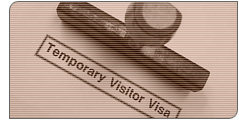
Visa Exemption
U.S. citizens and citizens of other countries which have a reciprocal visa exemption arrangement with Japan may be eligible to visit Japan without a visa for a short-term stay for the activities allowed to Temporary Visitors. For more information about reciprocal visa exemption arrangements, please click here . Important Notice :Border enforcement measures to prevent the spread of novel coronavirus (COVID-19)
Documentation
Please be aware that we will decline applications that have incomplete documents. Each Temporary Visitor Visa applicant must submit the following documents: * Consulate General of Japan will not make copies. If you need original documents, please bring the original plus one copy.
- An application form completed and signed. Blank forms are available at Japanese consular offices. You can also download by clicking on visa application form ( Sample ) in PDF format. Chinese citizens must write their names in Chinese characters, as well as in Roman letters. Korean citizens in principle are asked to write their names in Chinese characters, as well as in Roman letters. Please include your e-mail address and contact phone information. An applicant with an arrest or criminal record must provide a copy of his/her court and/or arrest record (including cases that ended with an acquittal or pardon), along with an English translation of those documents if they are in any language other than English. Even if the case did not go to trial, please provide a letter that explains in detail the circumstances surrounding the arrest. We would like to know about the charges, time served, fees paid, and probation (if any).
- Valid passport ( original plus one photo copy of the face page) with sufficient space for a visa (This means at least one empty, blank visa page. US passports use the rear pages for amendments, and are not acceptable as blank visa pages ). If you already have a valid Japanese visa in your passport, please include a signed consent form as shown in the sample at this link: http://www.ny.us.emb-japan.go.jp/en/d/Consent.pdf . If you submit a PERMIT TO REENTER THE UNITED STATES or a REFUGEE TRAVEL DOCUMENT issued by the U.S. government, it must have a validity date at least six months beyond the date of visa application.
- A passport-sized photograph: 2-inch x 1.4-inch photograph on glossy photo paper taken within the last six months with plain background. Photograph may be attached to the application form with glue (not tape or staples) or you may submit the photograph unattached.
- Green Card or valid I-94 and U.S. resident visa to re-enter the United States (F or J visa holder must show an I-20 or DS-2019 with the valid signature of an appropriate official in order for re-entry). If you will be entering a third country after leaving Japan, you must show a valid visa to enter that country (or a national passport of that country). We ask that all applicants submit their original immigration documents (green card, I-20, etc.) or a NOTARIZED copy of the documents. * Please note: In principle we do not accept an application from B-1 and B-2 U.S. visa status holders.
- A confirmed reservation record of your round-trip flight to/from Japan. An e-ticket or print-out from a travel agency, airline or travel website is acceptable. The print-out should include: -Your name. -Your confirmation number/record locator. -Your airlines, flights and all departure and destination cities. -Your complete round-trip flight itinerary, starting and ending in the US. This should include all of the countries you are visiting other than Japan, if applicable. * Please note: We do not require the purchase of tickets, but we do require a confirmed reservation. We are not responsible for tickets which may be unusable due to the delay or denial of a visa. For those with non-revenue ticket holders: a) Actual Non-Revenue ticket (original plus copy of all pages), plus a printed entire flight information from the airline company b) A copy of the employee ID of the airline employee who obtained the flight coupon, or a letter from the airline proving the employee works for the airline, and that the applicant is authorized to use the non-revenue ticket
- If traveling for BUSINESS, original letter from applicant’s company signed by an authorized executive officer, on company letterhead, stating: a) applicant’s position in the company, duration of employment, and monthly or annual salary b) nature/purpose of visit in detail c) dates/duration of stay intended d) contact person, company name, address and phone number of business contact in Japan e) guarantee of financial support during applicant’s stay in Japan and return transportation from Japan * Additional documents may be requested during the course of examination.
- If going to attend a CONFERENCE, conference brochures plus a paid registration form and invitation will be required. In addition, a letter from the home institution/company giving the circumstances of the trip as in 6.a ) ~ 6.c ) from the visa applicant’s home institution/company, plus the applicant’s financial resources such as listed on 8.a) will be required.
Visa Fees Visa fees are determined according to reciprocal arrangements between Japan and the country of the applicant's nationality. Click here for Visa Fees.
Processing Time Please refer to our introduction page .
Applications by mail Please refer to our introduction page .
Note for Chinese nationals In general, Japanese Embassy/Consulates in China are not accepting Japanese tourist visa applications from Chinese nationals residing in other countries, and if you are planning to sightsee in Japan during your temporary stay in China or on the way back to the US, we recommend applying for a Japanese visa before leaving the US.
Note for Nationals of India Click here for outline of application procedures for Multiple Entry VISA ( English / Japanese )
Note for Nationals of Indonesia, the Philippines, and Vietnam Click here for outline of application procedures for Multiple Entry VISA ( English / Japanese )
What you need to know about Japan visa requirements

Dec 24, 2023 • 3 min read
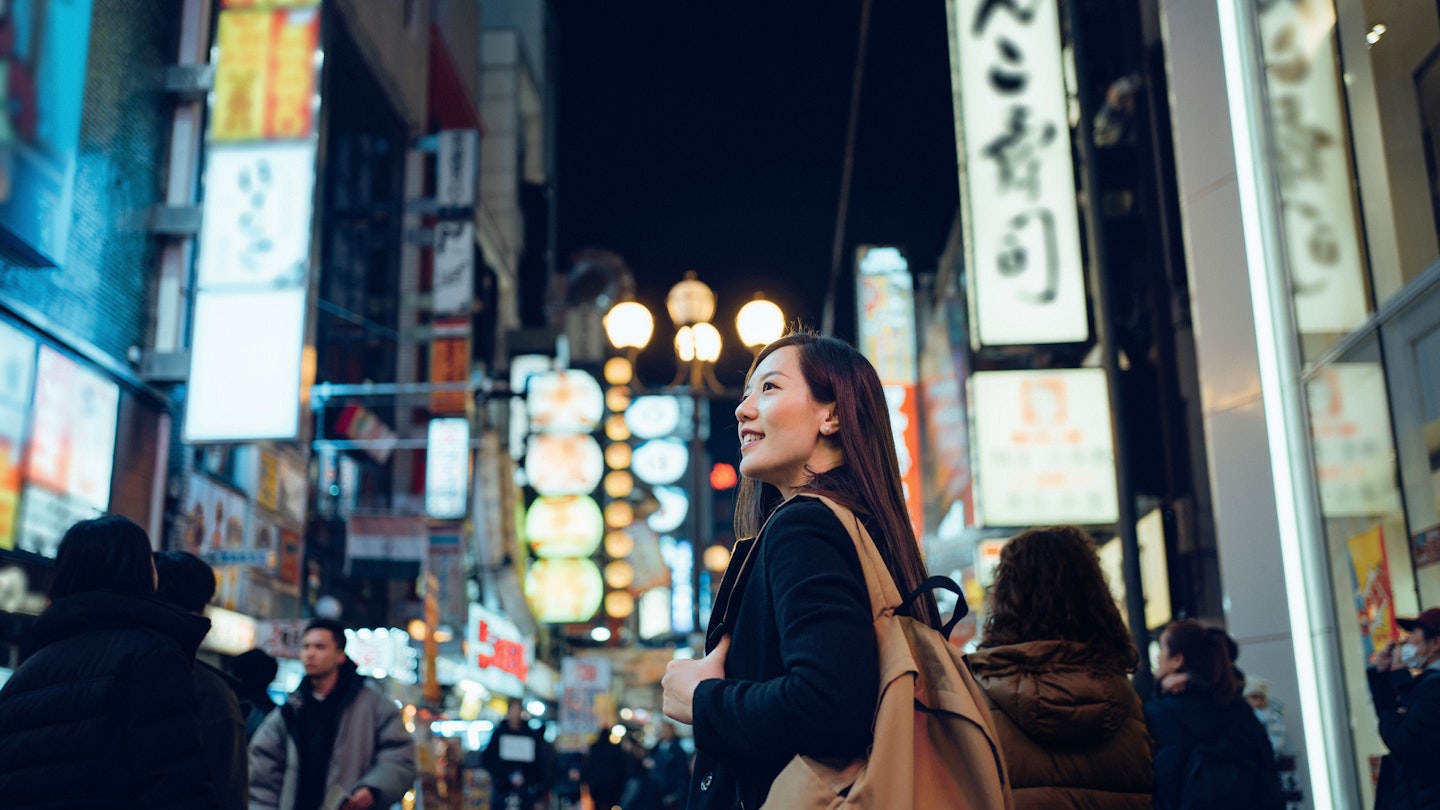
Visitors from 68 countries can travel to Japan with a free visa on arrival © d3sign / Shutterstock
With its pulsing, modern cities, beautiful rural landscapes and world-renowned cuisine, Japan is one of the top stops for travelers seeking a fully immersive Asian experience. And there's good news: travelers dreaming of a long-awaited trip to Japan need wait no longer – after establishing some of the world’s strictest border control policies during COVID-19, Japan has opened visa-free travel for visitors from most countries.
Read on for a rundown of Japan’s latest entry requirements, and consult Japan’s Ministry of Foreign Affairs website for the most up-to-date information ahead of your travels.
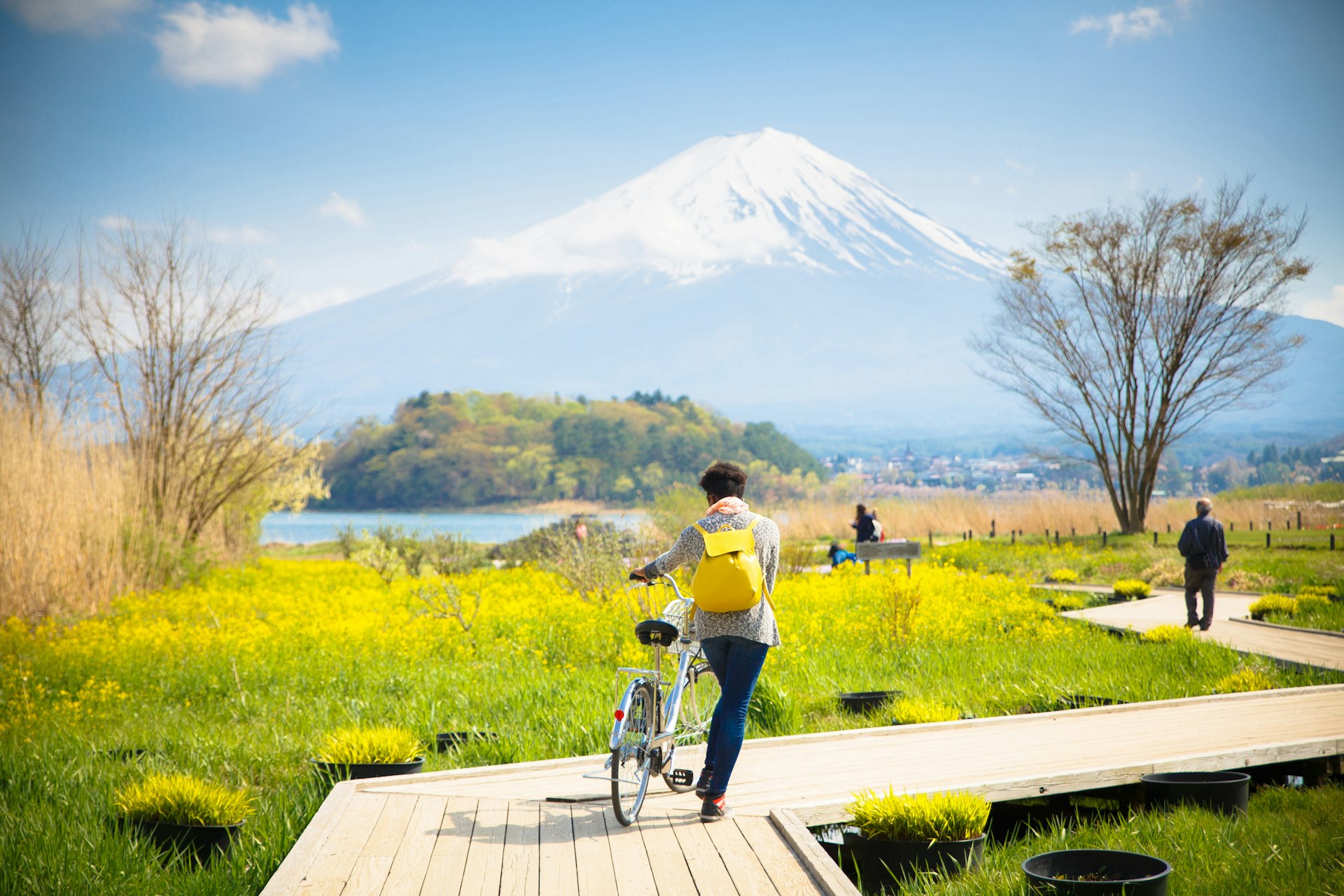
Entry procedures – before you arrive
Ahead of your trip, register at Visit Japan Web , where you can submit your documentation for customs and immigration, and then download your QR code to your smartphone.
When you arrive in Japan, simply show the QR code when requested during the entry process.
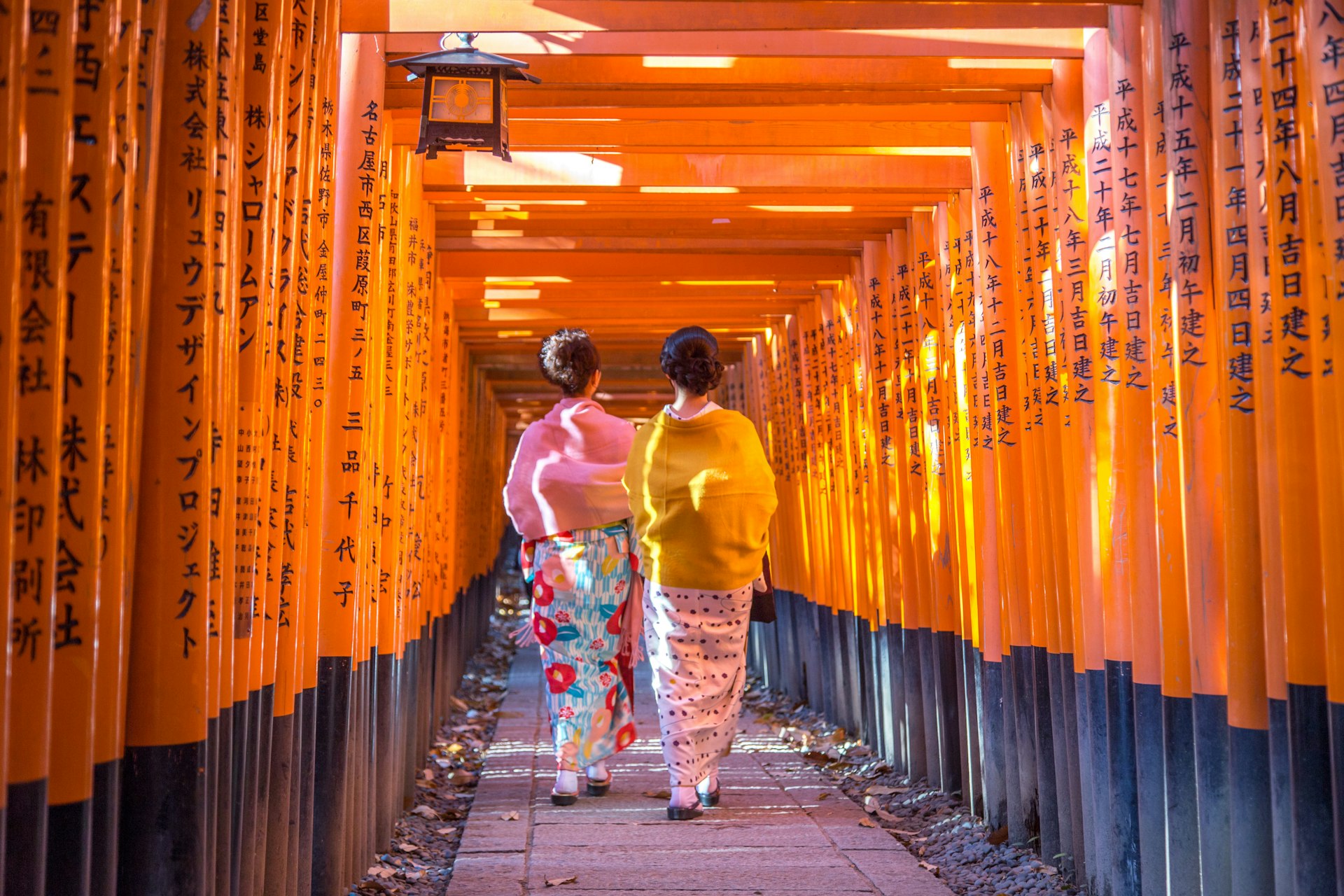
How to get a visa
Residents of 68 countries can enter Japan for up to 90 days for tourism purposes with a free visa upon arrival; this is considered a visa exemption. These countries include the UK, USA, Canada, Mexico, Australia, Singapore, Malaysia and most countries in Europe. For a complete list of visa-exempt countries and visa durations, consult the Japanese Ministry of Foreign Affairs .
On entering Japan, all holders of foreign passports are photographed and fingerprinted. If asked, travelers arriving with a visa upon arrival should be able to provide proof of onward travel or sufficient means to purchase an air or ferry ticket out of Japan. In practice, this is rarely requested. Your passport should also be valid for the proposed duration of your stay.
Travelers not from a visa-exempt country will need to apply for one via their nearest Japanese embassy in their home nation or organize one with an accredited travel agent approved by the Japanese Embassy. The cost of visas is approximately 3,000 yen for a single-entry visa and 6,000 yen for a double- or multiple-entry visa. Fees are collected in the currency of the country in which the embassy is located.
The processing period for visas is five business days from the day after the acceptance of the application. For more information about the requirements of applying for a Japanese visa in specific countries, see the Japanese Ministry of Foreign Affairs website.

What if I need to extend my visa?
Extending a visa is possible from within Japan for citizens of Austria, Germany, Ireland, Lichtenstein, Mexico, Switzerland and the UK; these travelers may be able to extend their temporary visitor visa once, for another 90 days. Visitors wishing to do this will need to apply at a regional immigration bureau in Japan before the initial visa expires. If approved, the extension fee is 4,000 yen.
For other nationalities, extending a temporary visa is difficult unless you have family or business contacts in Japan who can act as a guarantor on your behalf. Options should be discussed at your nearest regional immigration bureau.
Longer, working visas are also available to visitors of Japan, which allow people to study, train or work in the country. These usually grant entry for either three years, one year, six months or three months. These visas must be applied for in advance of travel, via an embassy in your country of origin.
There is also a specific working holiday visa , which allows visitors to engage in small-scale employment while visiting the country for tourism purposes. These are available to people between the ages of 18 to 30 (25 in some cases) from 26 countries including Australia, New Zealand, Canada, Korea, the UK and a number of countries in Europe. The number of hours that can be worked and the type of work permitted are limited under this visa.
This article was first published Mar 17, 2021 and updated Dec 24, 2023.
Explore related stories

Tips & Advice
May 23, 2024 • 12 min read
The stunning beaches of Seychelles are in close reach when you use points and miles. Here's how to get started.
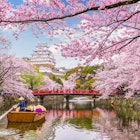
May 3, 2024 • 14 min read
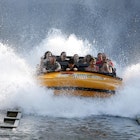
Apr 14, 2024 • 6 min read
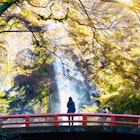
Mar 31, 2024 • 7 min read

Mar 28, 2024 • 7 min read
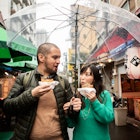
Mar 28, 2024 • 6 min read
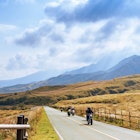
Mar 26, 2024 • 8 min read
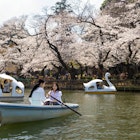
Mar 25, 2024 • 6 min read

Feb 9, 2024 • 9 min read
Security Alert May 17, 2024
Worldwide caution, update may 10, 2024, information for u.s. citizens in the middle east.
- Travel Advisories |
- Contact Us |
- MyTravelGov |
Find U.S. Embassies & Consulates
Travel.state.gov, congressional liaison, special issuance agency, u.s. passports, international travel, intercountry adoption, international parental child abduction, records and authentications, popular links, travel advisories, mytravelgov, stay connected, legal resources, legal information, info for u.s. law enforcement, replace or certify documents.
Before You Go
Learn About Your Destination
While Abroad
Emergencies
Share this page:
Travel Advisory January 8, 2024
Japan - level 1: exercise normal precautions.
Japan – Level 1: Exercise Normal Precautions
Reissued after periodic review without changes.
Exercise normal precautions in Japan.
Read the country information page for additional information on travel to Japan.
If you decide to travel to Japan:
- Enroll in the Smart Traveler Enrollment Program (STEP) to receive Alerts and make it easier to locate you in an emergency.
- Follow the Department of State on Facebook and Twitter .
- Follow Embassy Tokyo’s American Citizen Services section on Facebook and Twitter .
- Review the Country Security Report for Japan.
- Visit the CDC page for the latest Travel Health Information related to your travel.
- Prepare a contingency plan for emergency situations. Review the Traveler’s Checklist .
Embassy Messages
View Alerts and Messages Archive
Quick Facts
Duration of intended period of stay. Please note you cannot travel on a passport you have previously declared as lost or stolen even if you subsequently locate it
One page required for entry stamp
Amounts equivalent to ¥1,000,000 or above subject to declaration
Embassies and Consulates
U.S. Embassy Tokyo 1-10-5 Akasaka, Minato-ku, Tokyo 107-8420 Japan Telephone: 81-3-3224-5000 Emergency After-Hours Telephone: 81-3-3224-5000 Fax: 81-3-3224-5856 Our Navigator Assistant will guide you to the information you need.
U.S. Consulate General Osaka-Kobe 2-11-5, Nishitenma, Kita-ku, Osaka 530-8543, Japan Telephone: 81-6-6315-5900 Emergency After-Hours Telephone: 81-3-3224-5000 Fax: 81-6-6315-5914 Our Navigator Assistant will guide you to the information you need.
U.S. Consulate General Naha 2-1-1 Toyama, Urasoe City, Okinawa, Japan Telephone: 81-98-876-4211 Emergency Telephone: 81-3-3224-5000 Fax: 81-98-876-4243 Our Navigator Assistant will guide you to the information you need.
U.S. Consulate General Sapporo Kita 1-jo Nishi 28-chome, Chuo-ku, Sapporo 064-0821, Japan Telephone: 81-11-641-1115 Emergency After-Hours Telephone: 81-11-641-1115 Fax: 81-11-643-1283 Our Navigator Assistant will guide you to the information you need. All assistance at the Consulate General Sapporo is by appointment only.
U.S. Consulate Fukuoka 5-26 Ohori 2-chome, Chuo-ku, Fukuoka 810-0052, Japan Telephone: 81-92-751-9331 Emergency After-Hours Telephone: 81-3-3224-5000 Fax: 81-92-713-9222 [email protected] Our Navigator Assistant will guide you to the information you need. Routine services are provided by appointment only.
U.S. Consulate Nagoya Nagoya International Center Bldg. 6th floor, 1-47-1 Nagono, Nakamura-ku, Nagoya 450-0001, Japan Telephone: 81-52-581-4501 Emergency After-Hours Telephone: 81-3-3224-5000 Fax: 81-52-581-3190 Our Navigator Assistant will guide you to the information you need. Emergency services are provided by U.S. Consulate General Osaka-Kobe.
Destination Description
See the Department of State’s Fact Sheet on Japan for information on U.S-Japan relations.
Entry, Exit and Visa Requirements
Visit the Embassy of Japan website for the most current visa information.
There are no COVID-related entry requirements for U.S. citizens.
Entry & Exit:
- You must have a valid passport and an onward/return ticket for tourist/business "visa free" stays of up to 90 days. Your passport must be valid for the entire time you are staying in Japan.
- You cannot work on a 90-day "visa free" entry.
- "Visa free" entry status may not be changed to another visa status without departing and then re-entering Japan with the appropriate visa, such as a spouse, work, or study visa.
- Visit the Embassy of Japan website for the most current information on all visa categories.
- Japanese immigration officers may deny you entry if you appear to have no visible means of support.
- All foreign nationals are required to provide fingerprint scans and to be photographed at the port of entry. Exceptions to this requirement include diplomatic and official visa holders, minors, and individuals covered under SOFA Article IX.2. For further information about landing procedures, please visit the Immigration Bureau of Japan’s website .
- Make sure your passport is valid. Note you cannot travel on a passport you have previously declared as lost or stolen even if you subsequently locate it. Japanese authorities will likely deny you entry into Japan if you attempt to do so. If you have reported your passport lost or stolen, you must apply for a new passport before travel.
Transiting Japan:
- Ensure that your passport and visa are valid and up-to-date before you leave the United States. Passport services are not available at the airport.
- Airlines in Japan may deny you boarding for transit if you do not have the required travel documents for an onward destination in another country or if your passport does not have six months of validity remaining. For the entry requirements of the country you are traveling to, visit the State Department's Country Specific Information website.
Military/SOFA Travelers: While active-duty U.S. military personnel may enter Japan under the Status of Forces Agreement (SOFA) with proper Department of Defense (DoD) identification and travel orders, all SOFA family members, civilian employees, and contractors must have valid passports to enter Japan. Please consult the DOD Foreign Clearance Guide before leaving the United States.
See the Immigration Bureau of Japan’s website for various immigration procedures.
HIV/AIDS Restrictions: The U.S. Department of State is unaware of any HIV/AIDS entry restrictions for visitors to or foreign residents of Japan.
Find information on dual nationality , prevention of international child abduction and customs regulations on our websites.
Safety and Security
For police services in Japan, dial 110. For fire or ambulance services, dial 119.
Crime: Crime against U.S. citizens in Japan is generally low and usually involves personal disputes, theft, or vandalism. In addition:
- Robberies committed after a victim has been drugged from a spiked drink can occur, especially in nightlife districts.
- Sexual assaults are not often reported, but they do occur, and victims may be randomly targeted. Victim's assistance resources or shelters are difficult for foreigners to access.
- Hate-related violent crimes rarely occur, although some U.S. citizens have reported being the target of discrimination because of their nationality or their race.
- Pick pocketing can occur in crowded shopping areas, on trains, and at airports.
- Police reports must be filed before leaving Japan, as Japanese police will not accept reports filed from overseas.
- In instances involving credit card theft or fraud, Japanese police often provide a report number rather than a police report. You can provide this report number to your credit card company to confirm the incident with the police.
Entertainment and Nightlife Districts in Tokyo:
- Exercise caution in all entertainment and nightlife districts throughout Japan, especially Roppongi, Kabuki-cho, Shibuya, and Ikebukuro.
- Incidents involving U.S. citizens in these areas include physical and sexual assaults, drug overdoses, theft of purses, wallets, cash and credit cards at bars or clubs, and drugs slipped into drinks.
- Drink spiking at bars and entertainment venues, especially in areas such as Roppongi and Kabuki-cho, near Shinjuku, has led to robbery, physical and sexual assaults, and credit card fraud. Some victims regain consciousness in the bar or club; other victims may awaken on the street or other unfamiliar locations.
- U.S. citizens have reported being threatened with gun or knife violence in such venues so that they will pay exorbitant bar tabs or withdraw money. U.S. citizens have also reported being beaten when they have refused to pay or hand over money.
- There have been reports of U.S. citizens being forcibly taken to ATMs and robbed, or made to withdraw funds after being unable to pay exorbitant bar tabs.
- Please be aware that Roppongi, Kabuki-cho, and other entertainment and nightlife districts have also been the scenes of violence between criminal syndicates.
See the Department of State and the FBI pages for information on scams.
Police reports must be filed at the nearest police station prior to departure from Japan. The Japanese police cannot accept reports filed from overseas. Report crimes to the local police at 110 and contact the U.S. Embassy at 03-3224-5000 (011-81-3-3224-5000 from overseas). Remember that local authorities are responsible for investigating and prosecuting the crime.
See our webpage on help for U.S. victims of crime overseas .
- help you find appropriate medical care;
- assist you in reporting a crime to the police;
- contact relatives or friends with your written consent;
- explain the local criminal justice process in general terms;
- provide a list of local attorneys;
- provide information on victim’s compensation programs in the U.S. ;
- provide an emergency loan for repatriation to the United States and/or limited medical support in cases of destitution
- help you find accommodation and arrange flights home; and/or
- replace a stolen or lost passport.
Contacting Police, Fire and Ambulance Services: You can reach the police throughout Japan by dialing 110. Fire and ambulance services can be contacted by dialing 119. Note that English-speaking dispatchers may not be available. Please review advice on “Calling for Help” on our website . If you need assistance, you should be able to describe your address/location in Japanese or find someone who can do so, since few police officers speak English.
Domestic Violence: Victim's assistance resources or battered women's shelters exist in major urban areas, but are difficult for foreigners to access. These types of resources are also generally unavailable in rural areas. Investigations of sexual assault crimes are often conducted without female police officers present, and police typically ask about the victim's sexual history and previous relationships.
Tourism: The Victim's assistance resources or battered women's shelters exist in major urban areas, but are difficult for foreigners to access. These types of resources are also generally unavailable in rural areas. Investigations of sexual assault crimes are often conducted without female police officers present, and police typically ask about the victim's sexual history and previous relationships.
See our webpage for more information on insurance providers for overseas coverage.
Local Laws & Special Circumstances
Criminal Penalties: You are subject to Japanese law while you are in Japan. If you violate Japanese laws, even unknowingly, you may be arrested, imprisoned, or deported. If you are arrested in Japan, even for a minor offense , you may be held in detention without bail for several months or more during the investigation and legal proceedings.
Some offences are also prosecutable in the United States, regardless of Japanese law. For examples, see our website on crimes against minors abroad and the Department of Justice website.
The vast majority of arrests of U.S. citizens in Japan are for drug-related offenses. Japanese authorities aggressively pursue drug smugglers and users, including recreational users with sophisticated detection equipment, "sniffing" dogs, blood tests, “stop and frisk” tactics, and other methods. Penalties for possessing, using, or trafficking a drug that is illegal in Japan are severe, and convicted offenders can expect long jail sentences and fines. Please note that some drugs which may be legal in certain jurisdictions outside of Japan, including marijuana and synthetic drugs, remain illegal in Japan. This also applies to certain prescription drugs that doctors in the United States may prescribe. Japanese law makes no distinction between medical and recreational marijuana; therefore, having a prescription for medical marijuana will not help you avoid arrest or prosecution. Even possession of a small amount of marijuana for personal medical or recreational use can result in a long jail sentence and fine. Japanese customs officials carefully screen incoming packages, and individuals who are mailed drugs can be arrested and prosecuted as drug traffickers.
Confiscation of Prescription Drugs and Other Medication: It is important to note that some medications that are routinely prescribed in the United States, including Adderall and marijuana, are strictly prohibited in Japan. The Japanese government decides which medications may be imported legally into Japan. The Embassy and Consulates of Japan in the United States have limited information available and do not have a comprehensive list of specific medications or ingredients. Please see more information on importing medicines into Japan.
You must carry your U.S. passport or Japanese Residence Card (Zairyu Kado) with you at all times. In Japan, you may be taken in for questioning if you do not have your passport or Japanese residence card to show your identity and status in Japan (e.g., as a visitor, student, worker, or permanent resident).
It is illegal to work in Japan while in tourist or visa-waiver status. Overstaying your visa or working illegally may lead to fines of several thousands of dollars, and in some cases, re-entry bans as long as 10 years, or indefinitely for drug offenders. For additional information, please see Japan’s Immigration Control and Refugee Recognition Act and contact the Japanese Embassy or nearest Japanese Consulate in the United States for more information.
Driving under the influence of alcohol could also land you immediately in jail. The blood-alcohol limit in Japan is 0.03%. Punishments can be up to 10,000 USD in fines and up to five years in prison.
Possession of a gun or ammunition is a crime in Japan. Carrying a knife with a locking blade, or a folding blade that is longer than 5.5 cm (a little more than two inches), is illegal in Japan. U.S. citizens and U.S. military personnel have been arrested and detained for more than 10 days for carrying pocket knives that are legal in the United States but illegal in Japan. The possession of lock-picking tools is illegal in Japan.
Establishing a Business : Individuals establishing a business or practicing a profession that requires additional permits or licensing should seek information from the competent local authorities, prior to practicing or operating a business.
A list of English-speaking lawyers located throughout Japan is available on our website .
Arrest Notification : If you are arrested or detained, ask police or prison officials to notify the U.S. Embassy immediately. See the Department of State’s webpage and the Embassy’s website for additional information.
Counterfeit and Pirated Goods: Although counterfeit and pirated goods are prevalent in many countries, they may still be illegal according to local laws. You may also pay fines or have to give them up if you bring them back to the United States. See the U.S. Department of Justice’s website for more information .
Faith-Based Travelers: See our following webpages for details:
- Faith-Based Travel Information
- International Religious Freedom Report – see country reports
- Human Rights Report – see country reports
- Hajj Fact Sheet for Travelers
- Best Practices for Volunteering Abroad
LGBTQI+ Travelers: There are no legal restrictions on same-sex sexual relations or the organization of LGBTI+ events in Japan.
Laws governing rape, sexual commerce, and other activity involving sexual relations do not apply to same-sex sexual activity. This leads to lower penalties for perpetrators of same-sex rape and sexual assault and greater legal ambiguity surrounding same-sex prostitution.
See our LGBTQI+ Travel Information page and section 6 of our Human Rights report for further details.
Travelers with Disabilities: The law in Japan prohibits discrimination against persons with disabilities. Japanese disability laws require the public sector to provide reasonable accommodations and the private sector to make best efforts in employment, education, access to health care, or the provision of other services; however, there are no penalties for noncompliance. Social acceptance of persons with disabilities in public is not as prevalent as in the United States.
Although Japan’s accessibility laws mandate that new construction projects for public use include provisions for persons with disabilities, older buildings are not likely to have been retrofitted for accessibility. At major train stations, airports, and hotels, travelers with disabilities should encounter few accessibility problems. Note that many smaller stations are inaccessible to those who cannot climb stairs. Information on travel in Japan for travelers with disabilities is available at Accessible Japan .
Travelers with disabilities can learn more about resources available in country from the Japan National Tourism Organization’s traveling with a disability page .
Students: See our Students Abroad page and FBI travel tips .
Women Travelers: See our travel tips for Women Travelers .
Conditions at Prisons and Detention Facilities: Japanese prisons and detention facilities maintain internal order through a regime of very strict discipline. U.S. citizen prisoners often complain of stark, austere living conditions and psychological isolation. Heating in winter can be inadequate in some facilities, food portions can be significantly smaller than what many may be accustomed to, and access to specialized medical care, particularly mental health care, at detention facilities and prisons is sometimes limited. Additional information on arrests in Japan is available on our embassy website.
Customs Regulations: Please contact the Japanese Embassy or nearest Japanese consulate in the United States, or visit the Japanese Customs website for specific information regarding import restrictions and customs requirements.
Japanese customs authorities encourage the use of an Admission Temporaire/Temporary Admission (ATA) Carnet in order to temporarily import professional equipment, commercial samples, and/or goods for exhibitions and trade fairs into Japan. For additional information, please call (212) 354-4480, or email the U.S. CIB for details.
Pets: The Japanese Animal Quarantine Service (AQS) sets procedures for importing pets. At a minimum, the process will take seven to eight months, though the process can take up to a year before a pet may enter Japan. Advance planning is critical. You can find more information about importing a pet into Japan or information about exporting a pet from Japan on our Embassy website.
Employment Issues: U.S. citizens should not come to Japan to work without having the proper employment visa arranged ahead of time. Teaching English, even privately, and serving as hosts/hostesses are both considered "work" in Japan and are illegal without the proper visa.
Some U.S.-based employment agencies and Japanese employers do not fully or correctly represent the true nature of employment terms and conditions. A minimum requirement for effectively seeking the protection of Japanese labor law is a written and signed work contract. If there is no signed contract, Japanese authorities are not able to act on behalf of foreign workers. If you are coming to Japan to work, carefully review your contract and the history and reputation of your Japanese employer before traveling to Japan. Complaints against U.S.-based employment agencies or recruiters may be directed to the Better Business Bureau or the Office of the Attorney General in the relevant state(s).
Disaster Preparedness : Japan is prone to natural disasters, including earthquakes, typhoons, tsunamis, and landslides. See the Embassy’s webpage for recommendations and steps you can take to prepare for an emergency. The Japan Tourism Organization’s Safety Tips app and NHK World app provide Japanese government emergency “J-Alerts” to your cell phone in English through push notifications. “J-Alerts” can provide early warning emergency alerts on earthquakes predicted in a specific area, sometimes seconds before an earthquake hits.
Radiation: Fukushima Daiichi Nuclear Power Plant : The Government of Japan continues to closely monitor the conditions at and around the Fukushima Daiichi Nuclear Power Plant. You should comply with all travel restrictions and cautions put into place by the Government of Japan for areas surrounding the plant. For more information, contact the Japan Nuclear Regulation Authority .
For police service in Japan, dial 110. For fire or ambulance, dial 119.
Ambulance services are widely available but receiving hospitals may decline to accept inbound patients unless they can provide proof of funds to pay for services.
COVID-19 Testing:
- Travelers should contact Japanese local health providers to determine the location of testing facilities within Japan. A non-comprehensive list of some COVID-19 testing facilities can be found here on the Embassy website.
COVID-19 Vaccines:
- The COVID-19 vaccine is available for U.S. citizens to receive in Japan.
- Review the Government of Japan’s English language website on COVID-19 vaccinations in Japan.
- Visit the FDA's website to learn more about FDA-approved vaccines in the United States.
The Department of State does not pay medical bills. Be aware that U.S. Medicare/Medicaid does not apply overseas. Most hospitals and doctors overseas do not accept U.S. health insurance.
Medical Insurance: Make sure your health insurance plan provides coverage overseas. Some care providers in Japan only accept cash payments. See our webpage for more information on insurance providers for overseas coverage. Visit the U.S. Centers for Disease Control and Prevention for more information on type of insurance you should consider before you travel overseas.
We strongly recommend supplemental insurance to cover medical evacuation.
If traveling with prescription medication, check with the government of Japan’s Ministry of Health website to ensure the medication is legal in Japan; possession, use, or importation of a prescription drug that is illegal in Japan may result in arrest and criminal prosecution. Always carry your prescription medication in original packaging with your doctor’s prescription. U.S. prescriptions are not honored in Japan, so if you need ongoing prescription medicine, you should arrive with a sufficient supply for your stay in Japan or enough until you are able to see a local care provider.
Vaccinations: Be up-to-date on all vaccinations recommended by the U.S. Centers for Disease Control and Prevention.
Further health information:
- World Health Organization
- U.S. Centers for Disease Control and Prevention (CDC)
Japan has a national health insurance system which is available only to those foreigners with long-term visas for Japan. National health insurance does not pay for medical evacuation. Medical caregivers in Japan may require payment in full at the time of treatment or concrete proof of ability to pay before they will treat a foreigner who is not a member of the national health insurance plan.
U.S.-style and standard psychological and psychiatric care can be difficult to locate outside of major urban centers in Japan and generally is not available outside of Japan's major cities. Extended psychiatric care can be very difficult to obtain.
Air Quality: Visit AirNow Department of State for information on air quality at U.S. Embassies and Consulates.
Travel and Transportation
Road Conditions and Safety : Driving in Japan can be complicated and expensive. Traffic moves on the left side of the road. Those who cannot read the language will have trouble understanding road signs. Highway tolls can be very high, and city traffic is often very congested. A 20-mile trip in the Tokyo area may take two hours. There is virtually no legal roadside or curbside parking; however, traffic is commonly blocked or partially blocked by those illegally parked curbside. In mountainous areas, roads are often closed during the winter, and cars should be equipped with tire chains. Roads in Japan are much narrower than those in the United States.
Traffic Laws : Japanese law provides that all drivers in Japan are held liable in the event of an accident, and assesses fault in an accident on all parties. Japanese compulsory insurance (JCI) is mandatory for all automobile owners and drivers in Japan. Most short-term visitors choose not to drive in Japan. Turning right or left on red lights is not permitted in Japan, and all passengers are required to fasten their seat belts.
Japan has a national 0.03 percent blood-alcohol-level standard for driving, and drivers stopped for driving under the influence of intoxicants will have their licenses confiscated. If you are found guilty of driving under the influence, speeding, or blatantly careless driving resulting in injury, you are subject to up to 15 years in prison.
See our Road Safety page for more information. The National Police Agency (NPA) oversees the administration and enforcement of traffic laws in Japan. You can find further information in English on the NPA English website . Information about roadside assistance, rules of the road, and obtaining a Japanese driver's license is available in English from the Japan Automobile Federation (JAF) web site . See the Japan National Tourism Organization’s website for car rental and driving in Japan.
Emergency Assistance : For roadside assistance, please contact the Japan Automobile Federation (JAF) at 03-5730-0111 in Tokyo, 072-645-0111 in Osaka, 011-857-8139 in Sapporo, 092-841-5000 in Fukuoka, or 098-877-9163 in Okinawa.
International Driving Permits (IDPs): An international driving permit (IDP) issued in the United States by the American Automobile Association (AAA) or the American Automobile Touring Alliance (AATA) is required of short-term visitors who drive in Japan. You must obtain an IDP issued in your country of residence prior to arriving in Japan. The U.S. Embassy andU.S. consulates do not issue IDPs. IDPs issued via the Internet and/or by other organizations are not valid in Japan.
Foreign residents in Japan who use an IDP may be fined or arrested. In practice, the term “resident” involves more than simply visa status or length of stay in Japan and is determined by the police. In short, a driver license from country outside Japan is not a substitute for a valid Japanese license for foreign residents. See the U.S. Embassy’s website for more information on driving in Japan.
Aviation Safety Oversight : The U.S. Federal Aviation Administration (FAA) has assessed the government of Japan’s Civil Aviation Authority as being in compliance with International Civil Aviation Organization (ICAO) aviation safety standards for oversight of Japan’s air carrier operations. Further information may be found on the FAA's safety assessment page .
Maritime Travel : Mariners planning travel to Japan should also check for U.S. maritime advisories and alerts in the Alerts section of the Embassy’s messages. Information may also be posted to the U.S. Coast Guard homeport website , and the National Geospatial-Intelligence Agency (NGA) broadcast warnings website portal select “broadcast warnings.”
For additional travel information
- Enroll in the Smart Traveler Enrollment Program (STEP) to receive security messages and make it easier to locate you in an emergency.
- Call us in Washington, D.C. at 1-888-407-4747 (toll-free in the United States and Canada) or 1-202-501-4444 (from all other countries) from 8:00 a.m. to 8:00 p.m., Eastern Standard Time, Monday through Friday (except U.S. federal holidays).
- See the State Department’s travel website for the Worldwide Caution and Travel Advisories .
- Follow us on Twitter and Facebook .
- See traveling safely abroad for useful travel tips.
Review information about International Parental Child Abduction in Japan . For additional IPCA-related information, please see the International Child Abduction Prevention and Return Act ( ICAPRA ) report.
Travel Advisory Levels
Assistance for u.s. citizens, learn about your destination, enroll in step.

Subscribe to get up-to-date safety and security information and help us reach you in an emergency abroad.
Recommended Web Browsers: Microsoft Edge or Google Chrome.
Make two copies of all of your travel documents in case of emergency, and leave one with a trusted friend or relative.
Afghanistan
Antigua and Barbuda
Bonaire, Sint Eustatius, and Saba
Bosnia and Herzegovina
British Virgin Islands
Burkina Faso
Burma (Myanmar)
Cayman Islands
Central African Republic
Cote d Ivoire
Curaçao
Czech Republic
Democratic Republic of the Congo
Dominican Republic
El Salvador
Equatorial Guinea
Eswatini (Swaziland)
Falkland Islands
France (includes Monaco)
French Guiana
French Polynesia
French West Indies
Guadeloupe, Martinique, Saint Martin, and Saint Barthélemy (French West Indies)
Guinea-Bissau
Isle of Man
Israel, The West Bank and Gaza
Liechtenstein
Marshall Islands
Netherlands
New Caledonia
New Zealand
North Korea (Democratic People's Republic of Korea)
Papua New Guinea
Philippines
Republic of North Macedonia
Republic of the Congo
Saint Kitts and Nevis
Saint Lucia
Saint Vincent and the Grenadines
Sao Tome and Principe
Saudi Arabia
Sierra Leone
Sint Maarten
Solomon Islands
South Africa
South Korea
South Sudan
Switzerland
The Bahamas
Timor-Leste
Trinidad and Tobago
Turkmenistan
Turks and Caicos Islands
United Arab Emirates
United Kingdom
Vatican City (Holy See)
External Link
You are about to leave travel.state.gov for an external website that is not maintained by the U.S. Department of State.
Links to external websites are provided as a convenience and should not be construed as an endorsement by the U.S. Department of State of the views or products contained therein. If you wish to remain on travel.state.gov, click the "cancel" message.
You are about to visit:
Visa Traveler
Exploring the world one country at a time
Japan Visa for Tourists in 2024: A Comprehensive Guide
Updated: March 26, 2024
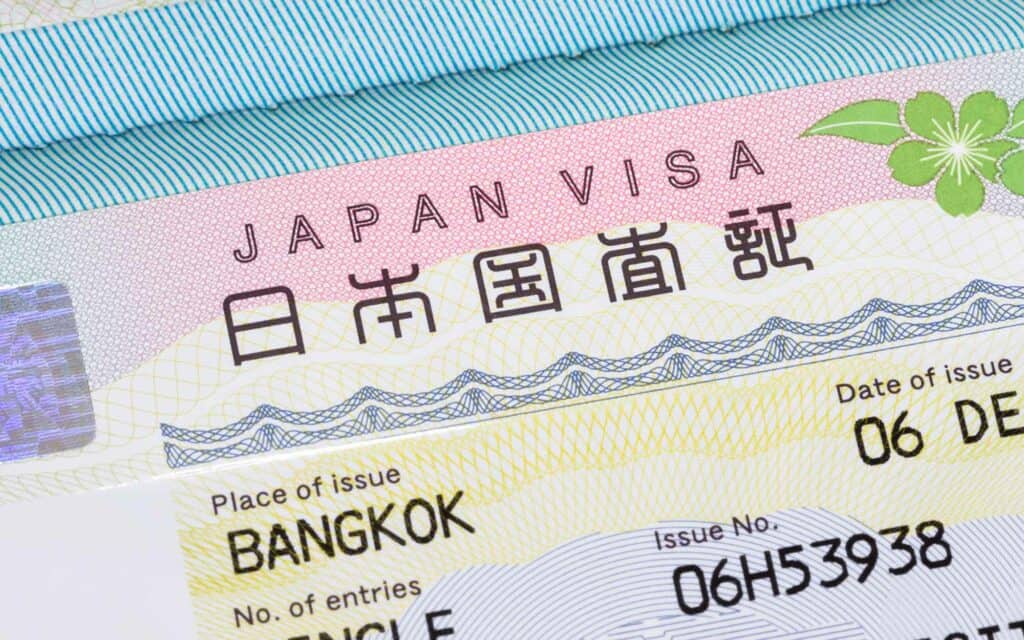
After being completely closed for tourism for more than 2 years, Japan finally reopened on October 11, 2022, restoring the previous visa exemptions and reducing the visa requirements.
Many nationalities are exempt from having to get a visa. Nationals and residents of select countries can obtain an eVisa online and everyone else can visit one of the over 200 embassies and consulates worldwide.
Table of Contents
Visa policy and visa types.
Nationals from 70 countries can travel to Japan visa-free . Most can stay up to 90 days.
Unless exempt, nationals and residents from 11 countries can apply for an eVisa online. They may still have to visit their nearest Japanese embassy. The eVisa allows stays for up to 90 days.
Everyone else must obtain a regular tourist visa from a Japanese overseas mission before traveling.
Japan does not have a visa on arrival.
Below is a summary of available visa types for tourists.
Entry Requirements
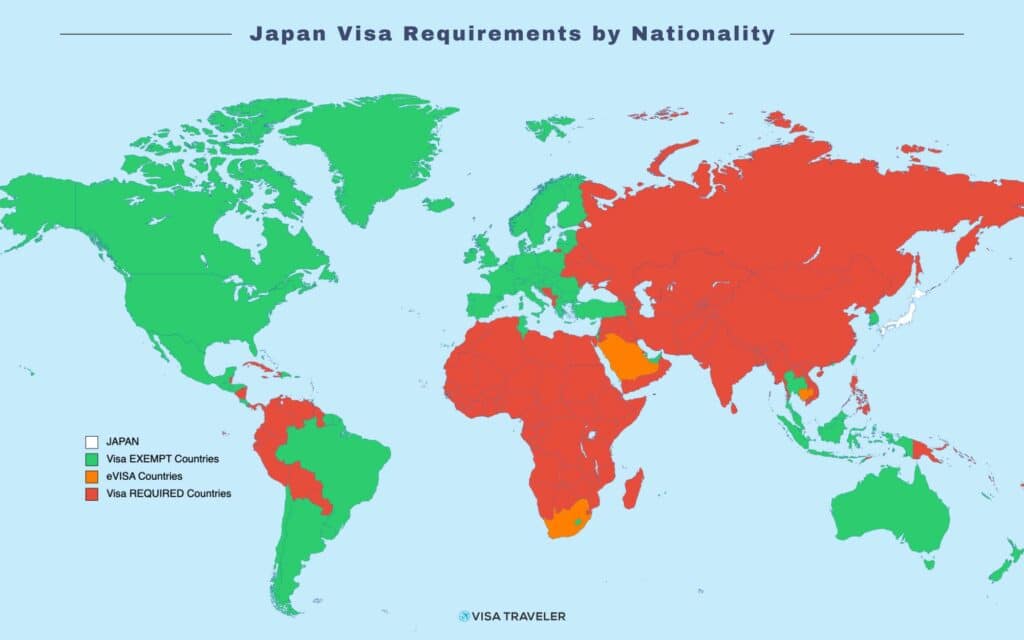
The following requirements apply to all visitors to Japan:
- Passport, which will remain valid during the period of stay
- Proof of sufficient funds to cover the cost of stay
- Return or onward ticket
Border officials rarely ask about the last 2.
For the specific visa requirements, see the corresponding section below.
Visa Exemption
Nationals of 70 countries are visa-exempted to travel to Japan. 65 countries are allowed to stay 90 days and the remaining 5 countries are allowed to say 14 to 30 days depending on the nationality.
There are additional requirements for some nationalities, outlined below. It’s best to check the official Japanese Foreign Ministry website for details.
- Austria (6)
- Barbados (5)
- Czech Republic
- Dominican Republic
- El Salvador
- Germany (6)
- Hong Kong (3)
- Ireland (6)
- Lesotho (5)
- Liechtenstein (6)
- Malaysia (2)
- Netherlands
- New Zealand
- North Macedonia
- South Korea
- Switzerland (6)
- United Kingdom (6)
- United States
- United Arab Emirates (2)
- Indonesia (1)
- Thailand (2)
- Must register an ePassport at a Japanese embassy in the respective country. Registration is valid for 3 years but not longer than the passport’s expiry date.
- Must have an ePassport, otherwise, need a visa.
- Only for passports issued by the corresponding Special Administrative Region.
- Must have a personal ID number.
- Must have a Machine-Readable Passport .
- Eligible to extend their stay to up to 6 months. Applications are made at a Regional Immigration Bureau inside Japan.
Japan eVisa
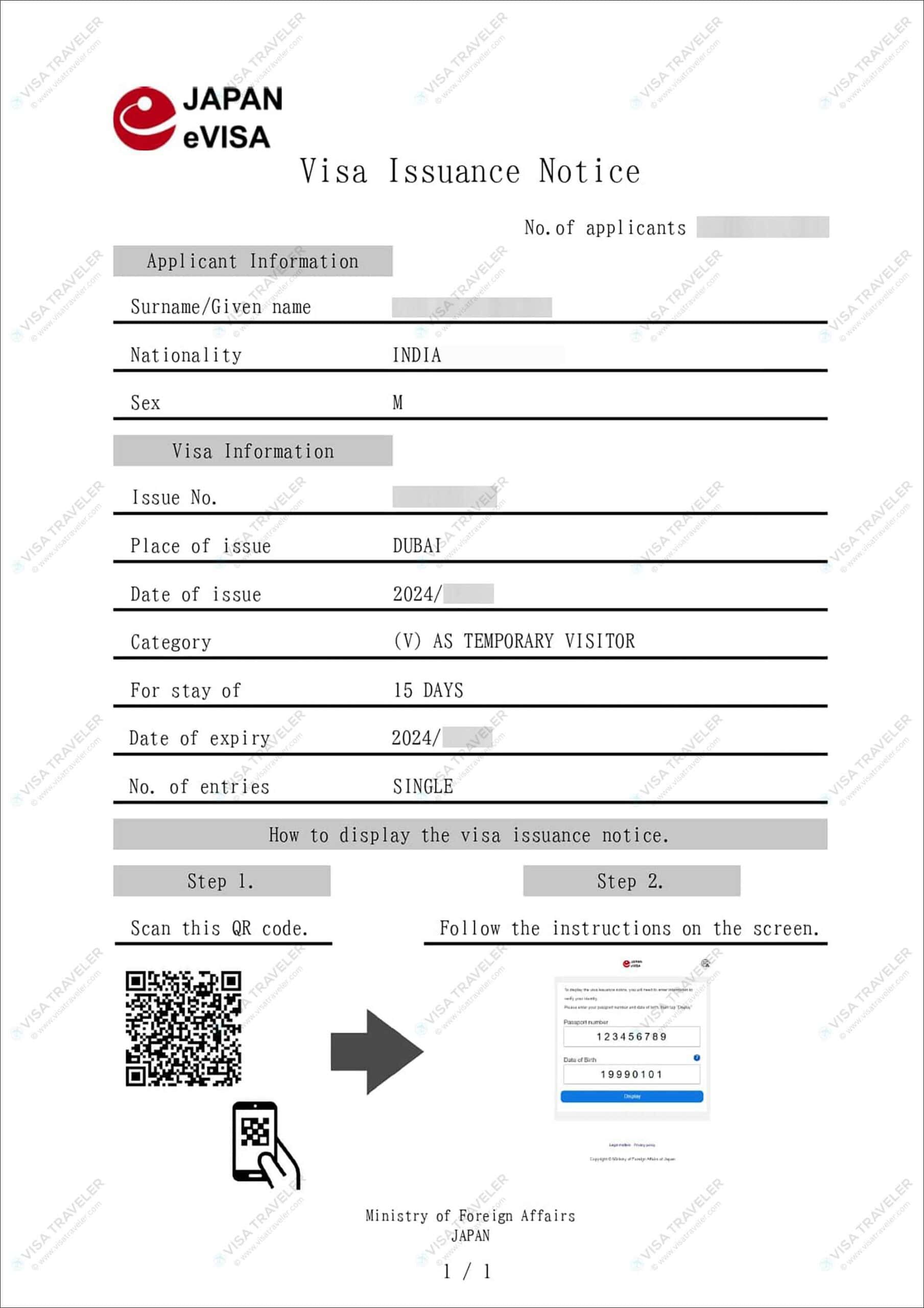
All nationals and residents from below 14 countries are eligible to apply for Japan eVisa. Those already visa-exempt don’t need to apply.
- Saudi Arabia
- South Africa
- United Arab Emirates
- United Kingdom
- Mongolia*
*Required to apply through an agency (see below).
Characteristics
- Only for tourism
- Valid for 3 months, single-entry only
- Duration of stay up to 90 days
- Fee 3,000 JPY or equivalent. Payable online or in person at the embassy. Some nationalities are exempt from the fee (check with your embassy)
- Processing takes 5 days to issue but could sometimes take longer
Documents required
What documents are required depends on your nationality and residence. These are the most commonly asked documents but check on the eVisa portal online for an exact list.
- Passport scan
- Color picture taken within the last 6 months
- Proof of immigration status (e.g. Permanent Residence Card or Visa if applicable )
- Flight itinerary (you don’t have to buy the tickets in advance, an itinerary from an airline is sufficient)
- Recent bank statement
- Travel itinerary (must be specific format, download eVisa travel itinerary template here)
- Proof of current residential address (e.g. driver’s license, state ID, utility bill, or lease agreement)
- Visa for the country you will visit after Japan (unless it’s your own country)
Application procedure
Applying online is incredibly simple. You can check out this video from Japan’s MOFA or follow the steps below.
- Go to Japan eVisa portal
- Register an account
- Fill out the application and upload the necessary documents
- Wait for your documents to be examined. You may be asked to submit additional documents. You will receive an email inviting you to pay when this step is complete.
- Pay online or in person
- After the eVisa has been issued, log in and make sure you can show the “ Visa Issuance Notice ” on your smartphone.
There’s no need to print any documents. On the contrary, you must show the visa on a digital device. Screenshots are not accepted either.
At the border, show the visa issuance notice with the QR code.
Once inside the country, you will receive an email saying your eVisa has expired. Don’t panic. This means you cannot use it to enter Japan again. You are allowed to stay up to 90 days inside Japan.
Applying from China, Vietnam, and Mongolia
Obtaining an eVisa for Japan in these three countries comes with special provisions.
EVisa is available to nationals of China who reside in China (excluding Hong Kong and Macau). You must apply through a Japan Visa Application Center or an accredited travel agency.
The eVisa grants entry to Japan for up to 30 days. Read more about it on the Japanese embassy in China website .
EVisa is available to nationals of Vietnam, who reside in Vietnam. You must book a packaged tour organized by a travel agency.
EVisa is available ONLY to foreign nationals who reside in Mongolia. You must apply at the Japan Visa Application Center (VAC) in Mongolia. Check with the Japanese embassy in Mongolia for more information.
Read the Japan eVisa article for more in-depth information on eVisa requirements, processing times, application process and border procedures.
Japan Tourist Visa
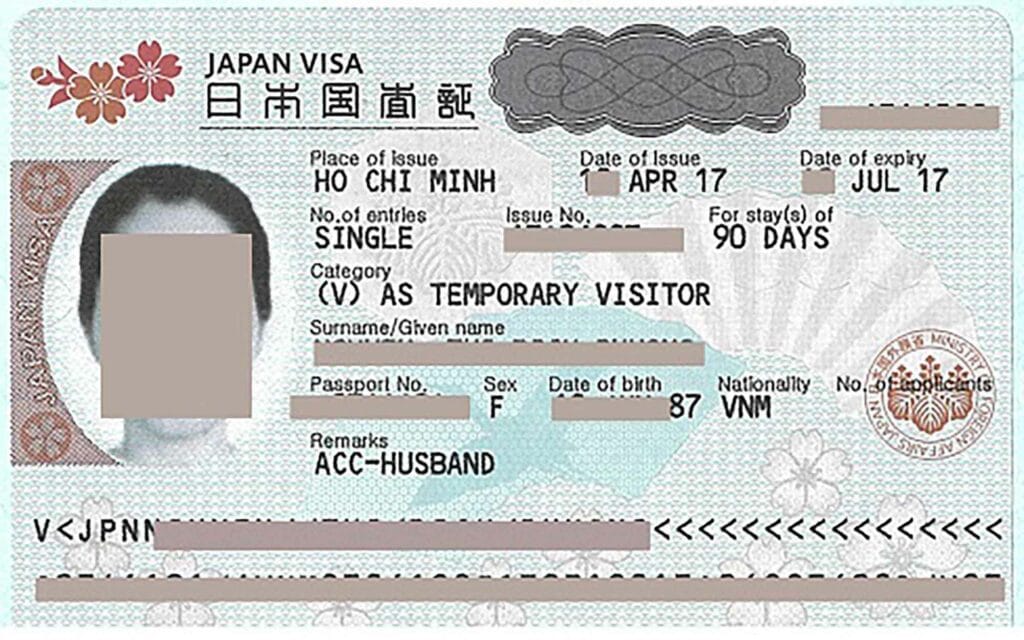
Everyone who’s not visa-exempt must obtain a visa to travel to Japan. If the eVisa isn’t an option, then you must obtain a tourist visa from a Japanese embassy.
Tourist visas are mostly single-entry. The term of stay can be either 15, 30 or 90 days from the date of entry. The visa itself is valid for 3 months for single entry and up to 5 years for multiple entry.
Requirements
The requirements for a tourist visa may differ depending on your nationality and the embassy you apply from. In most cases, they are:
- Passport with at least 2 blank pages
- Completed Visa Application Form
- 1 Passport-sized color photo taken within the last 6 months
- Flight itinerary
- Hotel reservation unless staying in an invitee’s home. It must cover the entire stay in Japan .
- Detailed, day-by-day itinerary in Japan .
- Most recent bank statement
- Proof of immigration status (if applicable)
The visa costs 3,000 JPY (~21$) or equivalent.
For further reading, check out the Japan Tourist Visa article for details such as when to apply, photo requirements and the application process.
Benefits of Japan tourist visa
Japan’s tourist visa is becoming a strong visa these days. That means Japanese visas have added benefits such as VISA-FREE travel to many other countries. As of 2024, you can travel to 14 countries with a Japanese visa. Read the VISA-FREE countries for Japan visa article for more details.
Transiting in Japan
Not leaving the airport.
If you are not already visa-exempt, you can transit in Japan without a visa only if:
- You stay within the international transit area of the airport;
- You have the necessary documents needed for the next country of destination;
- within 72 hours for Tokyo Haneda Airport or Kansai Airport (Osaka);
- within the same calendar day for all other airports.
Transit Visa
If you intend to pass through immigration and enter Japan for a short period, you must obtain a transit visa.
The requirements and procedures for obtaining transit visas are identical to regular tourist visas.
The main differences are in cost and duration of stay. The transit visa costs 700 JPY (~5$) and is issued for a maximum of 15 days but usually just 2-3 days until your next flight.
Japan Shore Pass
If you are transiting in Japan for less than 72 hours and you have a connecting flight that’s NOT on the same day, you may be able to obtain the Japan Shore Pass.
The application for it is usually done by the airline so it’s best to consult them.
To be eligible for the shore pass, you must arrive and depart from airports and seaports within the same group.
- Airports : Narita, Haneda, Nagoya, Niigata, Komatsu, Yokota.
- Seaports : Tokyo, Yokohama, Niigata, Nagoya.
- Airports : Osaka, Nagoya, Komatsu.
- Seaports : Osaka, Kobe, Nagoya.
- Airports : Fukuoka, Nagasaki, Kumamoto, Kagoshima, Naha, Kadena.
- Seaports : Hakata, Shimonoseki, Naha.
- Airports : Chitose.
- Seaports : Tomakomai, Otaru, Hakodate, Muroran.
Entry Procedure at the Airports
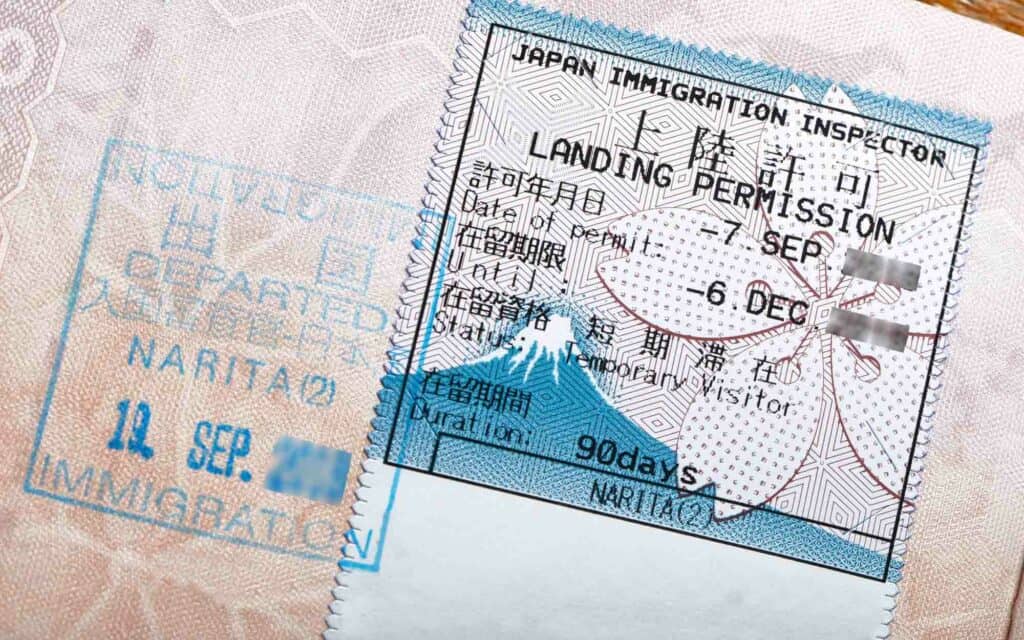
You may use the Visit Japan Web to submit all required information online. It’s not mandatory. Instead of paper forms, you will show QR codes.
After landing, you will sequentially go through immigration and customs.
If you got the eVisa, show your visa issuance notice on a smartphone. Otherwise, just your passport. Get a stamp and enjoy Japan.
Frequently Asked Questions (FAQs)
Is a covid vaccination certificate required to travel to japan.
COVID vaccination certificates and tests are not required since April 29, 2023.
Can I apply for a Japan visa online?
Yes but only if you’re a national or resident of the 11 eligible countries listed above.
How much does a Japan visa cost?
Japan visa costs 3000 YEN or equivalent in another currency.
How long does visa processing take?
Japan visa processing normally takes 5 working days but it could take more. It’s a good idea to apply for a visa at least a month before you travel.
Can I get a multiple-entry visa?
Japan eVisas are single-entry only. Embassies may issue multiple-entry visas depending on your circumstances.
WRITTEN BY THIRUMAL MOTATI

Thirumal Motati is an expert in tourist visa matters. He has been traveling the world on tourist visas for more than a decade. With his expertise, he has obtained several tourist visas, including the most strenuous ones such as the US, UK, Canada, and Schengen, some of which were granted multiple times. He has also set foot inside US consulates on numerous occasions. Mr. Motati has uncovered the secrets to successful visa applications. His guidance has enabled countless individuals to obtain their visas and fulfill their travel dreams. His statements have been mentioned in publications like Yahoo, BBC, The Hindu, and Travel Zoo.
PLAN YOUR TRAVEL WITH VISA TRAVELER
I highly recommend using these websites to plan your trip. I use these websites myself to apply for my visas, book my flights and hotels and purchase my travel insurance.
01. Apply for your visa
Get a verifiable flight itinerary for your visa application from DummyTicket247 . DummyTicket247 is a flight search engine to search and book flight itineraries for visas instantly. These flight itineraries are guaranteed to be valid for 2 weeks and work for all visa applications.
02. Book your fight
Find the cheapest flight tickets using Skyscanner . Skyscanner includes all budget airlines and you are guaranteed to find the cheapest flight to your destination.
03. Book your hotel
Book your hotel from Booking.com . Booking.com has pretty much every hotel, hostel and guesthouse from every destination.
04. Get your onward ticket
If traveling on a one-way ticket, use BestOnwardTicket to get proof of onward ticket for just $12, valid for 48 hours.
05. Purchase your insurance
Purchase travel medical insurance for your trip from SafetyWing . Insurance from SafetyWing covers COVID-19 and also comes with a visa letter which you can use for your visas.
Need more? Check out my travel resources page for the best websites to plan your trip.
LEGAL DISCLAIMER We are not affiliated with immigration, embassies or governments of any country. The content in this article is for educational and general informational purposes only, and shall not be understood or construed as, visa, immigration or legal advice. Your use of information provided in this article is solely at your own risk and you expressly agree not to rely upon any information contained in this article as a substitute for professional visa or immigration advice. Under no circumstance shall be held liable or responsible for any errors or omissions in this article or for any damage you may suffer in respect to any actions taken or not taken based on any or all of the information in this article. Please refer to our full disclaimer for further information.
AFFILIATE DISCLOSURE This post may contain affiliate links, which means we may receive a commission, at no extra cost to you, if you make a purchase through a link. Please refer to our full disclosure for further information.
MORE VISA GUIDES

UNITED KINGDOM

VIEW ALL VISA GUIDES
- Cookie Policy
- Copyright Notice
- Privacy Policy
- Terms of Use
- Flight Itinerary
- Hotel Reservation
- Travel Insurance
- Onward Ticket
- Testimonials
Search this site
Japan is slowly reopening to tourists: Here's how I visited without a group tour

Japan currently requires almost everyone without a Japanese passport to apply for a visa to enter the country. And for most of the pandemic, tourist visas weren't available.
Finally, in June, Japan began allowing tourists on guided package tours to apply for visas.
Visiting Japan on a guided package tour wasn't very appealing to me, however. I wanted control over what I saw. Plus, I wanted to redeem points and miles for my hotels and flights. I figured I'd wait to visit Japan until the country resumed visa-free entry for U.S. passport holders.
But late last year, my husband found and booked two ANA first-class seats on one of ANA's 777-300 aircraft with The Suite first class for a flight from Tokyo's Haneda Airport (HND) to New York. As the flight approached, Japan showed no signs of returning to visa-free travel, so we decided to visit Seoul on the trip instead. But we still wanted to fly from Japan on this aspirational, difficult-to-book award flight. So, we booked an award flight from Seoul's Incheon International Airport (ICN) into HND and planned to remain in the transit area until departing on our ANA first-class flight.
The issue: Limited award availability to Tokyo Haneda meant we'd need to spend almost 24 hours airside in HND .
Not wanting to spend the night in the airport, I started researching just how difficult it would be to get a tourist visa to enter Japan between flights. It turned out it was very feasible — and we could do mostly what we wanted while in Japan.
Here's what you need to know about how to visit Japan as a tourist right now.
Get the latest points, miles and travel news by signing up for TPG's free daily newsletter .
Find a travel agent located in Japan
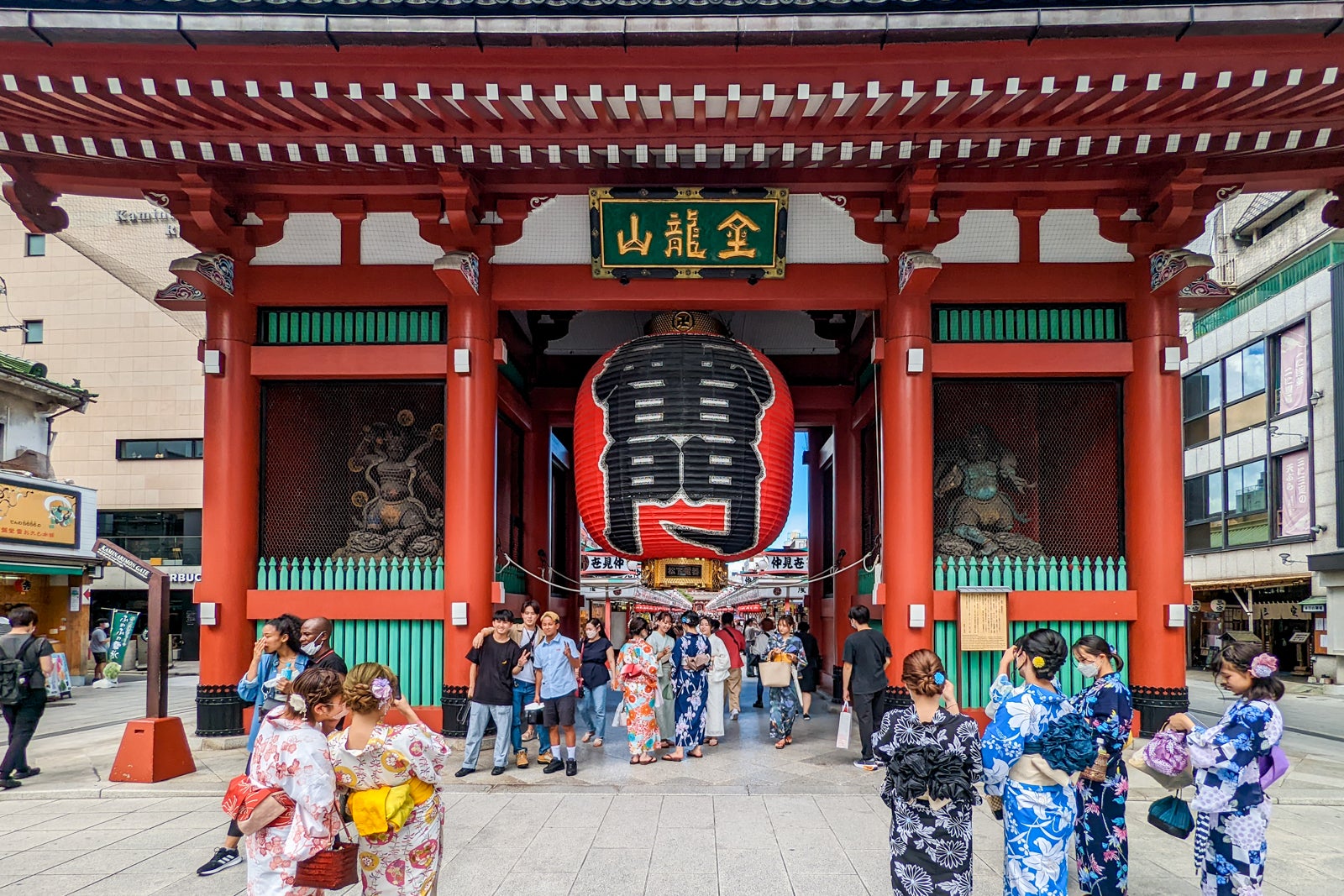
To visit Japan as a tourist, you'll need a certificate for completion of registration to the Entrants, Returnees Follow-up System (ERFS) system before you can apply for a visa. Tourists can get this certificate from travel agencies in Japan. But, especially after the policy changes effective September 7 , this may be the most confusing part of visiting Japan for many tourists.
Based on the current Japanese regulations , there are two ways to be eligible for this certificate (and hence a tourist visa):
- Book a package tour — including round-trip air travel to Japan and accommodation while in Japan — from a travel agency in Japan (you don't have to be accompanied by a tour conductor on this type of tour; this option is new as of Sept. 7, 2022).
- Book a tour from a travel agency in Japan (your tour should have a set itinerary; a tour conductor must accompany you and manage your itinerary while you're in Japan).
We went with the second option — the only option when we entered on Sept. 5 — using GoWithGuide as our travel agency.
Each travel agency has different policies, requirements and fees that you must meet before they'll help you get everything you need for an e-visa. So, shop around and see which agency provides the best options for your tour.
In the end, you're looking for an agency that will provide you a certificate for completion of registration to the ERFS system, as this is what you need to apply for a visa.
To provide the certificate and other information we might need when applying for a visa, GoWithGuide required that we book tours with their guides to cover each day of our trip. However, after the Sept. 7 policy changes, GoWithGuide has changed its requirements and now requires tourists to book at least a six-hour tour every other day and pay a service fee based on the cost of the tours.
Related: Getting a taste of Japan in JAL business class from Tokyo to Chicago
Apply for an e-visa
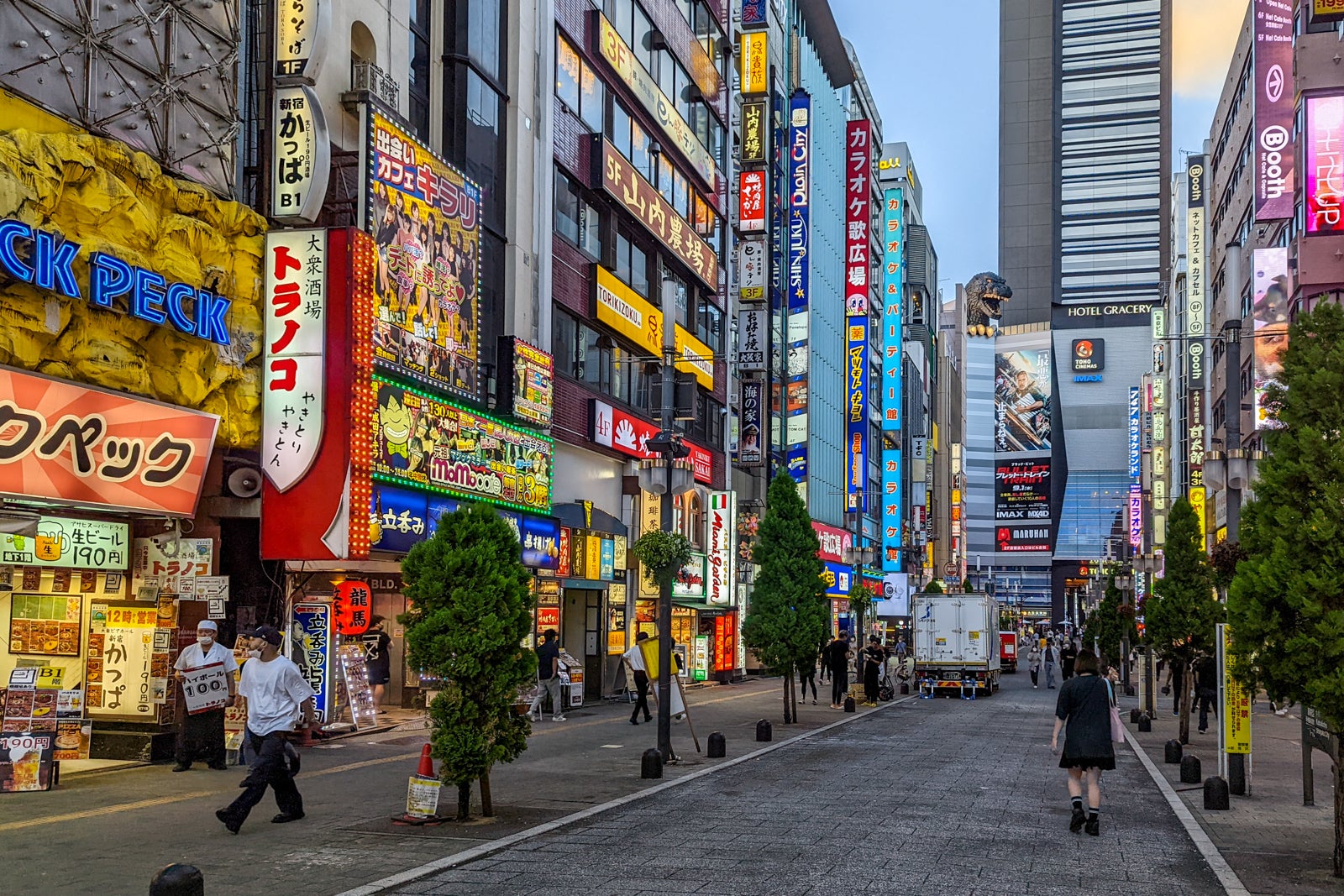
Once you have a certificate stating that your travel agency has registered you in the ERFS system, you can apply for a single-entry e-visa if you are an American national residing in the U.S. or a Canadian national residing in Canada.
The e-visa is free for Canadian and American nationals and usually takes about five business days to be processed once you submit your application (assuming there's nothing problematic about your application). The Consulate General of Japan in Miami issued our e-visas in about 12 hours, but this may have been due to us applying just a couple of weeks before arrival.
I don't recommend applying too far in advance. First, Japan may drop its visa requirement for American and Canadian nationals. Second, the e-visa is only valid for three months from when it was issued.
Related: Cleared for Takeoff: Using points and miles for a birthday trip to Japan
Check for updated requirements
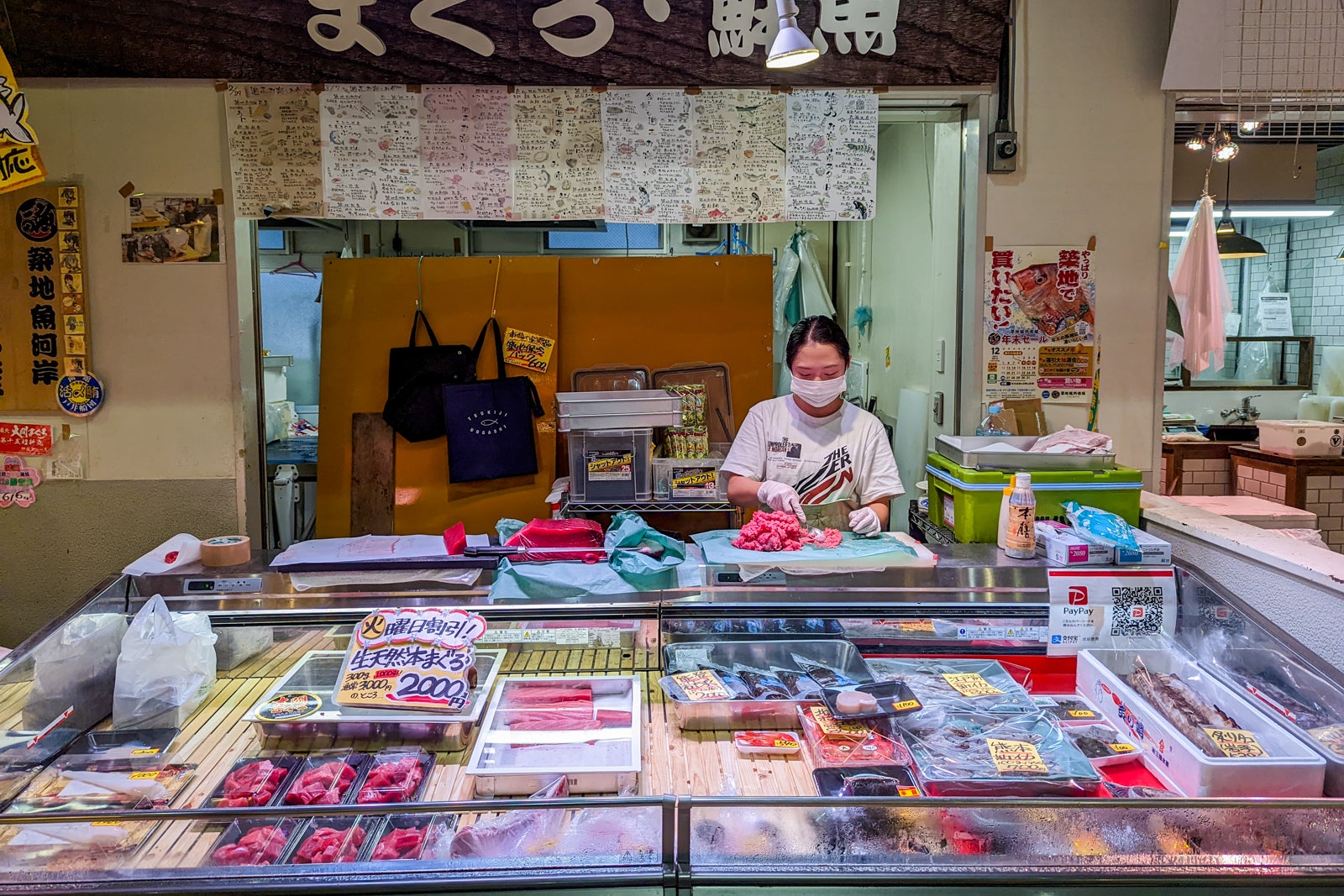
Before you depart for Japan, I recommend checking for updated requirements of things you may need to do. For example, I needed to get a PCR test within 72 hours of departure (this requirement was dropped as of Sept. 7, 2022, if you have a valid vaccination certificate of COVID-19 and are traveling from a country or region where the B.1.1.529 Omicron variant is dominant), install the MySOS app and enter my data into the app so I could use Japan's Fast Track quarantine policy .
Don't wait until the day before you leave to check the current requirements. After all, if you need a new vaccine card or COVID-19 test, you'll need some time to get those. I recommend checking the current requirements on the U.S. Mission Japan site or your airline's website.
Related: Sweet Spot Sunday: West coast to Japan in ANA business class for 45,000 points one-way
What it was like to visit Japan as a tourist now
Deplaning in Tokyo, I wasn't sure what to expect. But I found an efficient process with plenty of staff to guide us through the process. The staff first checked the MySOS app on my phone and gave me a blue card. Then I walked to a set of tables along with the other blue-card passengers, where I scanned the QR code on my MySOS app and presented my passport. Then I continued to immigration, baggage claim and customs in a way that matched my experience pre-pandemic. In total, the process took just 16 minutes from the jetway to exiting customs.
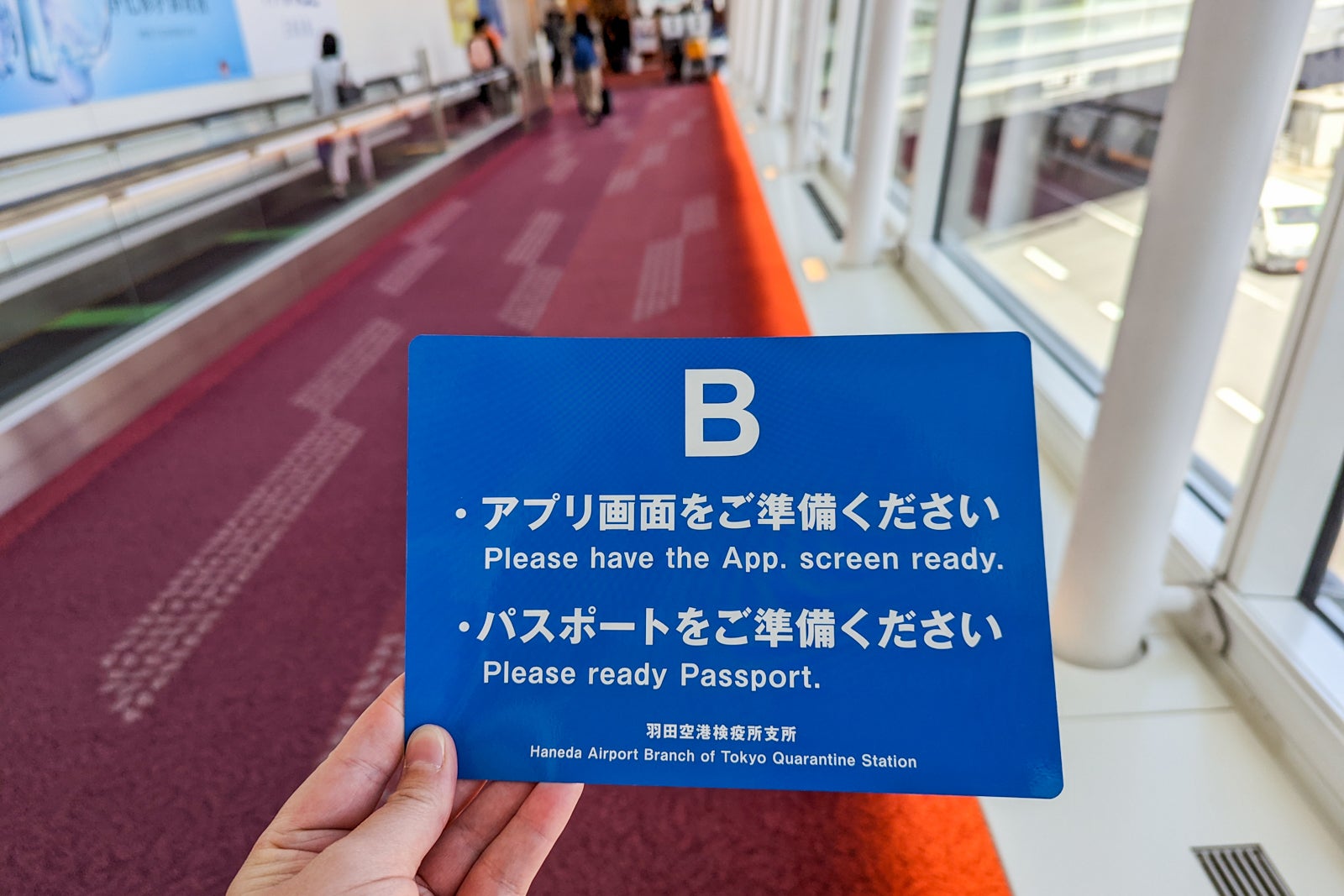
Since this was faster than I expected, my husband and I were now in the relatively quiet arrivals area. We had figured the entry procedures would take longer, so our guide wasn't scheduled to arrive for another 30 minutes. We'd thought someone might be at the customs exit checking that tourists had guides to accompany them. But, there were no checks — tourists were left to follow the rules themselves.
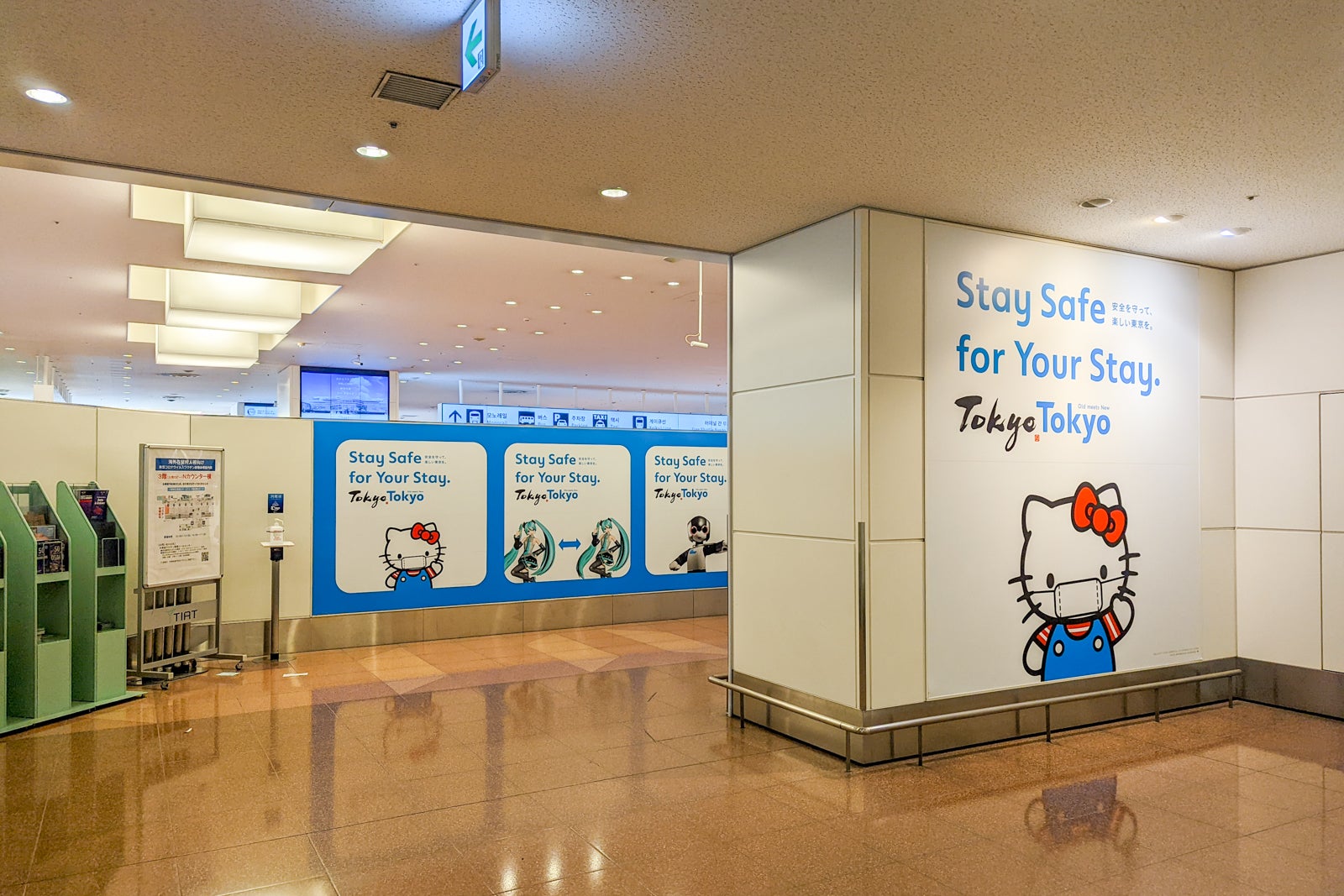
Due to a change of plans, we needed to add an extra eight-hour tour with less than 24 hours notice. GoWithGuide confirmed with the Consulate General of Japan in Miami — the consulate that issued our e-visas — that we could move up our arrival by a day. Luckily, an American woman named Keely on the GoWithGuide platform was available at the last minute to meet us at Tokyo Hanada and guide us for eight hours before dropping us at our hotel.
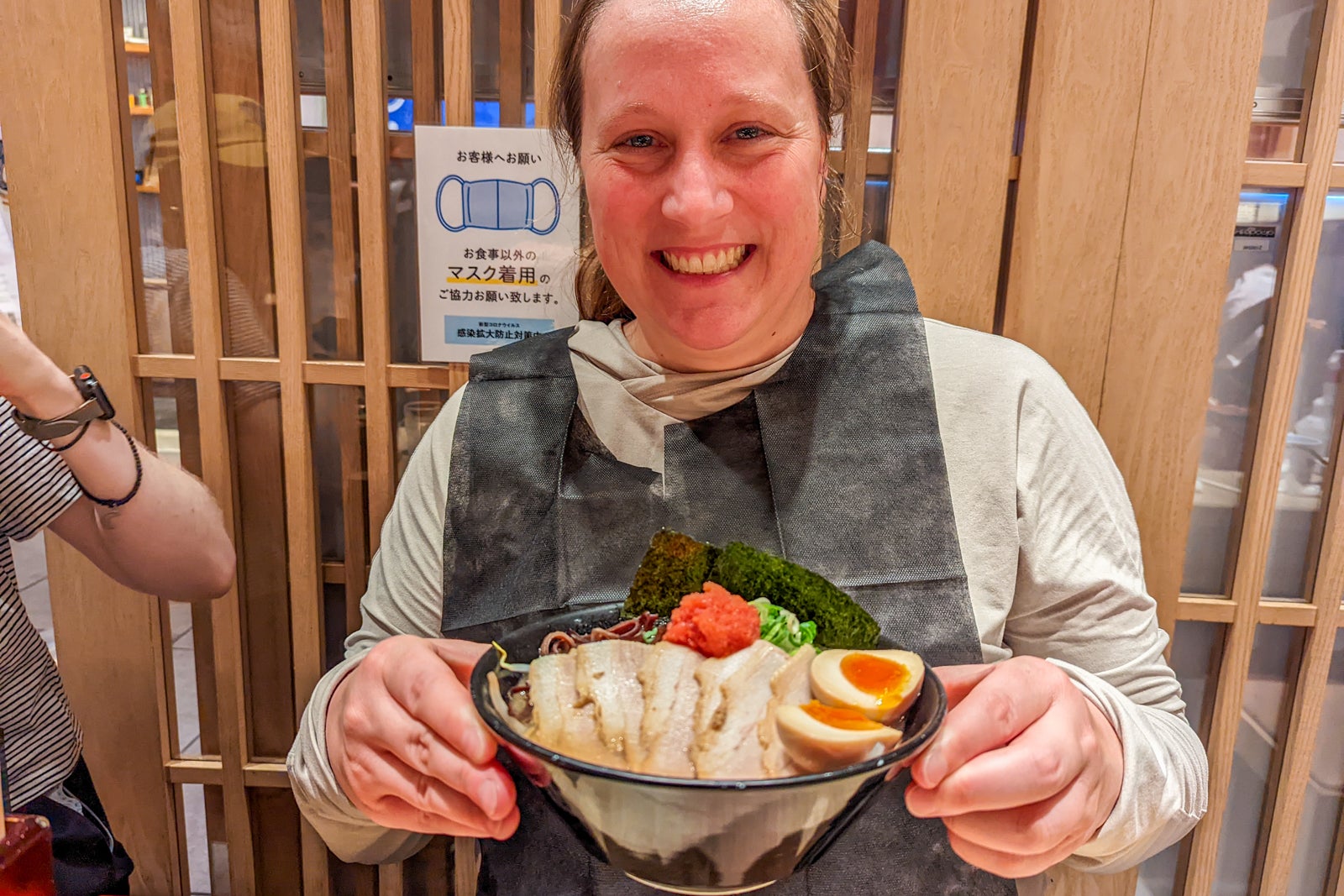
Since the tour was last minute, Keely quickly put together an itinerary with some of our favorite places we wanted to revisit. After dropping off our luggage at our hotel, we explored the city, chatting with Keely like a long-lost friend. As we wandered Tokyo, we saw mostly Tokyo residents and domestic tourists.
On our second day, we explored Tokyo with an experienced professional guide named Kyoko . Despite also revisiting some of our favorites on this tour (at our request), we discovered new aspects of some of our favorite sites. And we went to some new-to-us sites, ate at our favorite Japanese ramen chain and tried some delicious tuna sashimi.
Related: Sweet Spot Sunday: Round-trip business class to Asia for 75K miles
Other thoughts on visiting Japan now
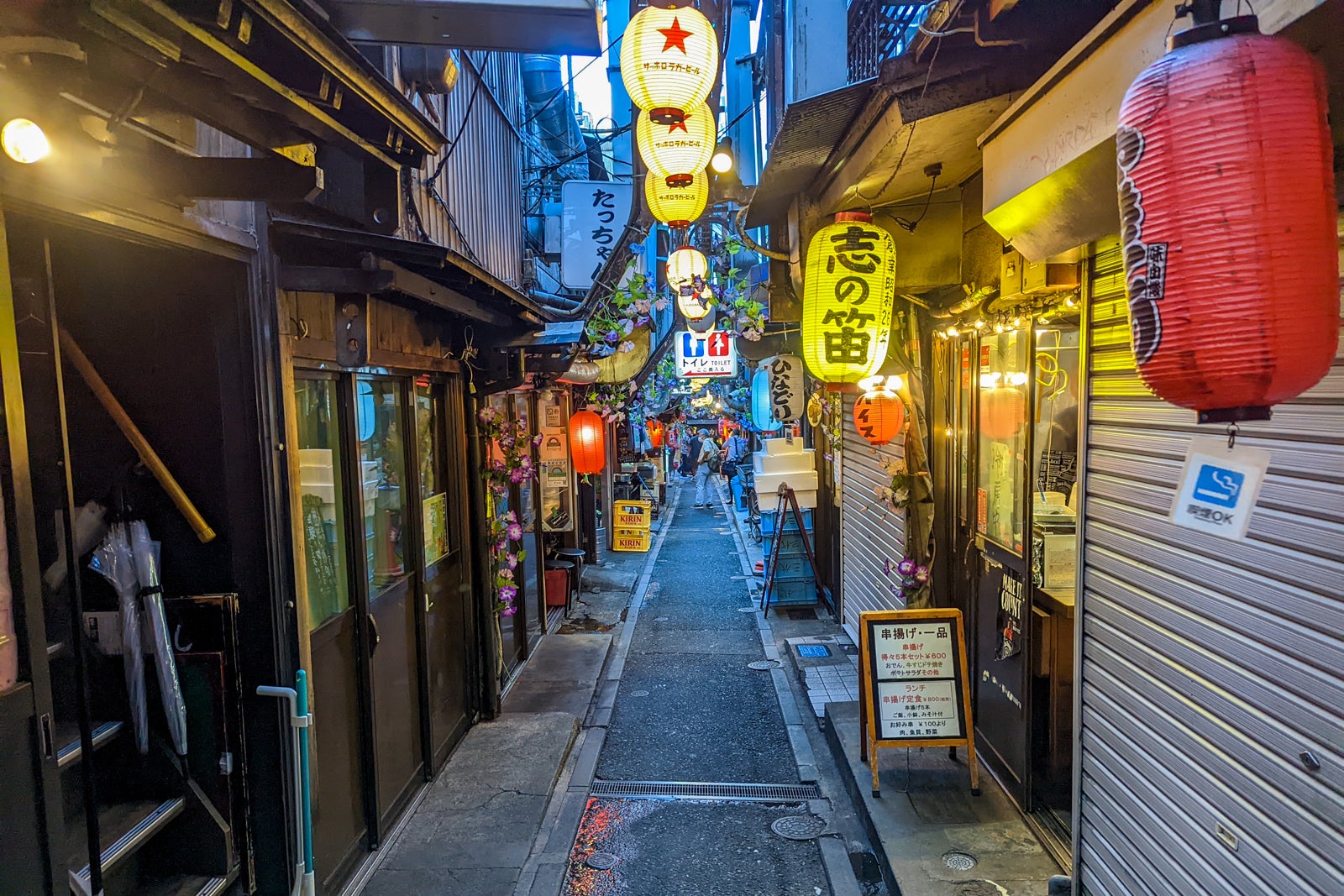
As long as you work with a travel agent in Japan to get a certificate for completion of registration to the ERFS system, obtain an e-visa and then follow whatever policies your travel agent sets, you shouldn't face any issues.
In our case, GoWithGuide required us to book tours on our arrival and departure days and full-day tours on any other days (as mentioned now, they only require you to book a tour every other day but charge a service fee for the ERFS certificate). According to the GoWithGuide website, we were allowed to venture from our hotel without a guide to a nearby grocery store or restaurant. Still, we weren't supposed to do any sightseeing activities alone.
Many travel agencies in Japan offer tours and services that may help you get an ERFS certificate. Now that the Japanese government doesn't require tourists to be guided, you may find a travel agent that only needs to know your itinerary and lodging to file your ERFS in exchange for a fee. Although I don't think this quite follows the letter of the new government policy, you may be able to get an e-visa approved with the certificate and other materials the agency produces. And once you have an approved e-visa, I don't expect you'll have any issues.
After all, even as we went on our tour with Keely — who likely looked more like our friend than our guide — no one inquired about the location of our guide.
Just remember that your travel agency (and you) will presumably be on the hook if you act irresponsibly and don't follow the regulations of the Japanese government and your agency.
Related: Tokyo Narita vs. Haneda: Which airport should I fly into?
Bottom line
Is now the absolute easiest time to visit Japan? No. But am I happy I jumped through the hoops to visit Japan as it reopens? You bet.
I expect Japan will continue to shift its policies regarding the steps needed to get a tourist visa. So I wouldn't recommend making arrangements with a travel agent and then working on getting an e-visa until your trip is within a month or so. After all, Japan may drop or reduce its requirements for tourist visas before your trip.

TIPS: What you need to know about getting a Japan visa
Planning to travel to Japan any time soon?
Applying for a visa can be daunting, but it shouldn't stop you from taking that trip to see the Land of the Rising Sun. With some proper preparation of all the necessary documents, you'll be able to get approved for your Japan vacation.
There are different types of Japanese visas but we'll focus more on the tourist ones for those who want to go on a quick leisure trip to experience the country. There are two common tourist visas: the single-entry allowing holders to enter Japan once and stay for as long as 90 days, and the multiple entry visa which lets the holder enter the country many times within a specified period for at least 15 to 30 days each stay. Here are the requirements you'll need to get ready.
- Valid Philippine passport in good condition, must be signed and have at least two blank visa pages
- Visa application form which you can download here
- Your itinerary in Japan which includes your port of entry, where you intend to stay and the contact number of the accommodation
- A passport photo 2 x 1.4 inches with a white background taken within six months
- If your birth certificate is "late registration," you must also submit a Baptismal Certificate and a Form 137 from high school or elementary, both of which must be issued within at least three months
- You only need to submit a birth certificate if you have never applied for a Japan visa before
- You will also need to write a letter of authorization for the Japan Embassy to verify your birth certificate
- Original Marriage Certificate (if married) issued within one year
- Bank Certificate of a personal account (not company/business) issued within three months
- A copy of your latest Income Tax Return
If someone else will be shouldering your travel expenses, you must also submit the following:
- Guarantee letter
- Proof of relationship between applicant and guarantor
- Bank Certificate and Income Tax Return of the guarantor
Once you've acquired all the requirements, choose an accredited travel agency from this list from the Japanese Embassy. Fees may cost P950 to P1,200 for a single entry visa, depending on the travel agency.
Multiple-entry requirements
Want to get a multiple-entry visa? This type of visa has some conditions for issuance, so it may not be as easy to get one. For instance, you will need to have a history of travel as a temporary visitor to the country in the last three years.
If you pass the conditions, you will need the same requirements as above but also include an explanation letter for requesting multiple entry, proof of your travel to Japan in the last three years, and proof of financial capacity.
So how much money do you need in your bank account to get your visa approved? The Japanese Embassy hasn't really specified a certain amount but what's advised is to have enough to fund your travel expenses.
As for how long a tourist visa is processed, it will usually take seven to 10 business days. It's best to get your visa processed a month before your trip so you have ample time to request documents that you might not have around.
Additionally, you don't need to book a hotel or a flight before your visa is processed. In fact, travel agencies advise against it. It's best to book once your visa is approved.
Remember, just because you submitted all your documents, it doesn't automatically mean that you'll be granted the visa.
This article TIPS: What you need to know about getting a Japan visa was originally published in PhilSTAR L!fe
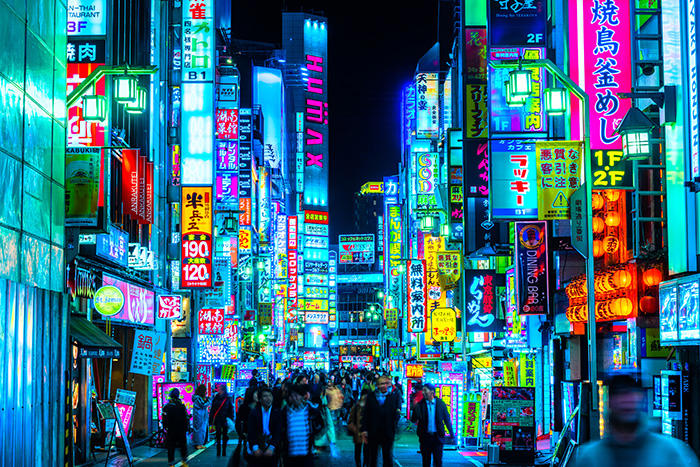
- Itineraries
- Tours and Activities
- Travel Guides
- Best of Japan
JRailPass.com » Japan Travel Blog » Japan Visa
Do I need a Visa for Japan? Japan Visa Policy
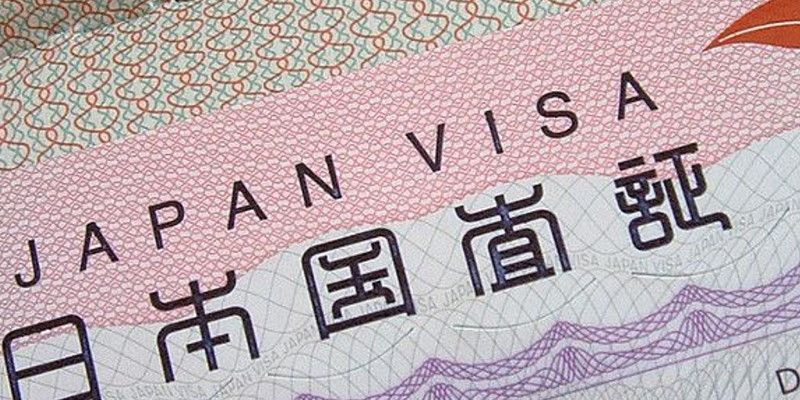
There are a number of different types of Japanese visas which are designed by the Japanese government for different purposes and lengths of time.
There are over 60 countries whose citizens can enter visa-free for tourism or business. Other nationalities currently need to go to a Japanese embassy or consulate to apply for a visa.
Japan introduced an eVisa for citizens of the US and Canada in 2022 that simplified the application process to acquire a Japan visa during pandemic visa suspensions.
Canadians and Americans no longer need a visa for Japan for short stays, but the eVisa is expected to launch for other visa-required nationalities in the near future.
Japan visa types
There are several types of visas for Japan and more will be introduced in the future, including the eVisa.
Visas are obtained directly from Japanese embassies and consulates, although the application process for the eVisa will be completed entirely online.
Japanese visas can be grouped in 3 main categories :
Working visa
Non-working visa.
- Family Related Visas
Working visas are considered long-term stay visas and cover the kind of work that requires high-level professional knowledge or skills and ‘thus, they do not include simple labor tasks. Jobs like waiter, construction workers, sales people, etc. cannot obtain a working visa. Typical working visas:
- Engineer, Specialist in Humanities, International Services Engineer. Engineers and Specialists in Humanities must have a university degree in their corresponding fields or 10 years of professional experience. International Services Engineers must have 3 years of professional experience in their field.
- Intra-company Transferee. This status applies to expats of foreign companies or the subsidiary companies of Japanese firms located overseas who have worked more than one year in the said office in overseas.
- Skilled Labor. Jobs involving foreign cooking, architecture, or civil engineering characteristic to foreign countries, training animals, instructing sports, sommeliers, processing precious stones will fall into this status. It’s mandatory to have at least 3 years of professional experience in the field.
- Business Manager. Those who are going to start a business or invest into a business in Japan. It also applies to those managing business on behalf of investors.
- Highly-Skilled Professional. This visa aims to attract workers who are likely to contribute to the Japanese economy.
Those with a certain status, knowledge, or skills can get the following working visas:
- Diplomats or Officials, Personnel of the embassies and consular offices, Diplomatic missions, Government personnel and their families.
- Research and education at university or equivalent educational institutions.
- Instruction of foreign languages or other education at elementary schools, high schools, etc. Those instructors looking to work in private language schools must apply for the Specialist in Humanities / International Services visa.
- For those whose artistic activities provide enough income to support their living in Japan.
- Religious activities. Missionaries sent to Japan from foreign religious organizations.
- Those journalists who have signed contracts with foreign media organizations. It includes freelance journalists.
- Legal and Accounting services.
- Medical Services. Medical specialists with Japanese qualifications.
- For those researchers working under a contract with public or private organizations in Japan.
- All of those working in show business and sports.
Anyone who holds a non-working visa is allowed to work as long as the immigration office grants them permission. This type of visas is considered a short-term stay visa and some restrictions apply. Those doing some work under a non-working visa cannot exceed the number of authorized hours per week.
Who can benefit:
- The visa application is submitted through the school.
- Those training to acquire technology, skills or knowledge. This status is granted only when the candidate will work in a job requiring that technology, skills or knowledge once he returns to his home country.
- Technical Internships. That covers internships after training under trainee visa.
- Spouses or children of people staying in Japan under the work visa and non-working visa (except for temporary visitors and trainees).
- Cultural Activities. Cultural or artistic activities with no income.
- Students or researchers of Japanese cultural or artistic activities.
- University students taking part in an internship without remuneration.
- Temporary Visitors (also known as Tourist visa ). This status includes visitors on vacation, sports, family visits, participants in seminars and conferences, business meetings, market research, and those traveling to Japan to engage in PR activities.
There is also another epigraphe for non-working visas that is granted case by case: Designated Activities. Students on internship, working holidays, diplomats’ housekeepers are some of the people who can apply for this visa.
Family related visas
Family related visas are considered short-term stay visas and have no retrictions when it comes to employment, so you can engage in more than one activity or change jobs. Those who can apply to these visas are:
- Spouses and children of Japanese nationals
- Long Term Residents
- Permanent Residents
- Spouses and children of Permanent Resident
Japan tourist visa
Any tourist wanting to visit Japan must obtain a tourist visa prior to entering the country. Nonetheless, Japan excludes several nationalities from having to comply with this requirement.
For instance, citizens from most European countries, United States, Australia, and Argentina do not need to get the Japan Tourist Visa since they are considered visa-exempt countries for tourism purposes. Nationals from any of those regions can stay in Japan for a maximum of 90 days visa-free and are assigned Temporary Visitor status.
Japan tourist visa is a short-term stay visa for the purposes of sightseeing, visiting friends, or attending conferences or courses . A tourist visa is normally valid for a single-entry stay of up to 90 days.
Tourists can also apply for a double-entry visa for 2 short trips within a 6-month period. It is important to note that the Japan tourist visa does not allow travelers to engage in paid work while in the country.
Other short-term stay visas
- Business visa: There is a temporary business visa for stays of up to 90 days which can single or double-entry visa (if both trips are within a 6-month period). Business purposes include conferences, meetings, signing contracts, and market surveys.
- Transit visa: Some nationalities need a transit visa to stop over in Japan when going to an onward destination. Many travelers do not need this as long as they stay within the allocated zone and do not leave the airport.
Which countries need a tourist visa?
All nationalities who are not visa-exempt need a visa to enter Japan. Citizens of certain countries can enter with Temporary Visitor status for limited periods of time ( 15 to 90 consecutive days ) for tourism or business purposes.
Visitors receive a stamp in their passport which is a requirement for the Japan Rail Pass . The rules are very strict and it is not possible to get the pass without showing the stamp (tourists with other types of visas are not eligible for the Pass).
The following nationalities are eligible for Temporary Visitor status (all others need a visa to enter):
The nationalities listed above can enter for tourism , visiting relatives, and business purposes. However, visitors cannot be paid for work under Temporary Visitor status. In these cases, it is necessary to obtain a work visa .
Citizens of the following countries will need a Japan tourist visa in order to enter Japan:
- Philippines
- CIS countries and Georgia
Book your Japan Rail Pass now
Japan tourist visa requirements
To successfully apply for a tourist visa for Japan, applicants must meet the following visa requirements :
- Hold a valid passport with at least 6 months remaining and 2 blank pages
- A completed visa application form
- Provide a recent color passport photo and a certified copy of your birth certificate
- If married, submit a marriage certificate (if issued within the last year)
- You must have the intention to leave Japan at the end of your authorized stay
- Proof of financial ability demonstrating you can support yourself financially during your stay in Japan
- Provide a certificate of your financial situation for the previous 6 months issued by your bank
- Submit the applicant’s tax return
- If applying without a sponsor, a copy of your Certificate of Employment must be submitted
- Provide a schedule and travel plans for the trip
If you still have questions about what you need in order to obtain the Japan tourist visa, you can find out more by checking the Japan entry requirements FAQ.
Japan tourist visa validity
Single-entry visas are valid for 3 months upon issue and usually allow you to stay in the country for up to 90 days. It is not possible to extend its validity.
Double-entry visas have a validity of 6 months from the date of issue.
Multiple-entry visas are usually good for a period of 1 to 5 years, depending on the visitor’s nationality, the purpose of the visit, and the type of passport they hold. Multiple-entry visas allow you to visit Japan multiple times within this period of 1 to 5 years since the issuing date, but each stay cannot exceed the 15 or 30-day period.
Japan tourist visa fees
A fee must be paid in order to obtain your Japan tourist visa. These fees vary depending on whether you are applying for a single-entry visa, a double-entry or a multiple-entry visa, as well as on the nationality of the tourist.
It is a good idea to check with your Japanese embassy or consulate before submitting your application since fees are subject to change at any time. Also, please note fees are collected in the local currency where the embassy or consulate is located and must be paid at the time of submitting your application. Once that has been done, you will receive proof of payment.
Japan Tourist eVisa
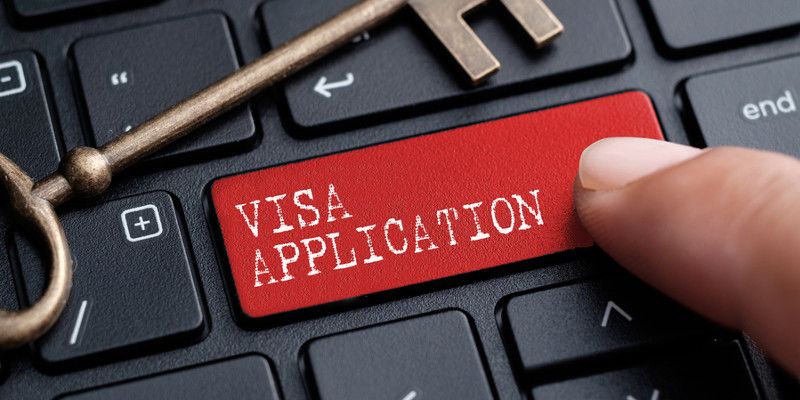
A Japan Tourist eVisa launched in August 2022 as part of the government’s wider plan to reach 60 million foreign visitors a year by 2030.
The eVisa for Japan was available for Canadians and US citizens, but these nationalities are now once again able to enter Japan visa-free. However, it may it is expected to launch for other nationalities in the future.
The online application form will be straightforward to complete and means that tourists do not need to go to an embassy or consulate to complete the application. It has been designed to simplify the visa application process.
It will be necessary to make a payment by credit or debit card to submit the application. Once an application has been submitted and approved , the eVisa approval notice will be sent to applicants by email.
More information: https://www.mofa.go.jp/j_info/visit/visa/index.html
Related Tours & Activities
Planning a trip to Japan? Here's what you need to know
From mid-October, Australians will once again be able to travel to Japan without a visa or tour group.
It's great news for Australians who have been waiting to travel to Japan after the pandemic.
But there are some important things to consider if you're planning a trip to Japan yourself.
Here's what you need to know.
How Japan's border restrictions are changing
From October 11, Japan is making several important changes to its border controls .
To break it down for you, the key points are:
- Tourists from Australia (and other countries with visa exemptions) can now travel to Japan without a visa;
- Tourists no longer required to travel on package tours;
- Travellers are no longer required to return a COVID-19 test on arrival unless they are suspected of being infected with COVID-19; and
- There is no longer a cap on daily arrivals to Japan. Previously, Japan was only allowing 50,000 entrants per day.
What documents do you need to enter Japan?
To enter Japan, you will need to provide a valid COVID-19 vaccination certificate with at least three doses or provide proof of a negative COVID-19 test taken within 72 hours prior to departure .
It's important to note that rapid antigen tests are not accepted — you will need to take an approved test, such as a PCR.
You will also need to fill out a COVID-19 questionnaire as part of Japan's quarantine procedures.
Japan's authorities recommend you upload your documents and fill out the questionnaire using the 'Fast Track' pre-application system and MySOS app .
When you're in Japan, you can simply open the app your phone to show quarantine officials.
"That's got your medical history. You show that app and it's all very efficient and done very smoothly," says Anthony Luxton, a Japan-focused travel agent in Kingscliff, New South Wales.
Do I need to wear a mask?
In Japan, you'll be expected to wear a mask when you can't social distance.
"Japan is still very conservative in terms of its approach to its pandemic and the virus," Mr Luxton says.
"Mask wearing is a must and social distancing is a must and hand-sanitising and temperature checks are everywhere."
Some restaurants will also enforce social distancing by physically separating diners.
"In restaurants themselves, you [may] have protectors between you and your partner. You can't simply sit and have a meal one-on-one, there is a plastic protector separating you," Mr Luxton says.
If you're planning a trip to a theme park or other major attraction, keep in mind that it might be harder to a purchase a ticket than before the pandemic.
"There's a lot of things that aren't the same: the frequency of some of the transfer services, and entries into the major theme parks [because] they're limiting pre-purchasing of tickets and controlling numbers," Mr Luxton says.
Is it expensive to travel to Japan now?
Japan is a relatively affordable travel destination, but flights are more expensive now than they were pre-COVID.
Mr Luxton says to expect to pay at least $1,700 for return flights from Sydney or Melbourne to Tokyo in coming months. However, there are often cheaper deals available on budget carriers.
"Even though more capacity comes on, pricing seems to creep up," he explains.
"[The airline industry] has to regain a lot of lost territory. There are other factors at play too, fuel prices and so on."
The good news is that once you're in Japan, you'll find your wallet stretches more than it would back home.
"The value for money is fantastic, no question," Mr Luxton says.
While Japan is a relatively cheap destination to start with, Australians might also benefit from the weak yen .
Each Australian dollar is now worth over 90 yen , a higher rate than at nearly any time in the last five years.
What to do in Japan
Whether you want to experience the hustle and bustle of Tokyo, stroll through the ancient capital of Kyoto or visit Japan's famous ski slopes, there's plenty on offer for tourists.
Japan is now entering autumn, which is a great time to explore the outdoors, Mr Luxton says.
"The country is ablaze in colour and the Japanese are great nature lovers," he explains.
"That rolls into the winter season, and there are quite a few Australians who are so keen to get [to Japan's ski slopes] because they haven't been for the last two seasons.
"The ski seasons in Japan have been brilliant [in recent years]."
The peak travel season is spring, from March to May. During spring, the weather is mild, and tourists can see Japan's famous cherry blossoms in bloom.
"It's a wonderful country to visit as the seasons roll on."
"It keeps offering different reasons [to travel] … it's very attractive from that point of view," Mr Luxton says.
Where you can get the latest travel information for Japan
- Embassy of Japan in Australia
- SmartTraveller Japan
- Information about current border measures from Japan's Ministry of Health, Labour and Welfare
ABC Everyday in your inbox
Get our newsletter for the best of ABC Everyday each week
- X (formerly Twitter)
Related Stories
Can a family travel overseas with only carry-on luggage taegan did.
'Don't be too scared to talk to randos': How to make the most of solo travel
This family's found a way to fund a years-long overseas adventure (without winning lotto)
Beaches, karaoke and food for days: What I discovered on my first trip to Korea
My first weeks in Japan: I was in a permanent state of curiosity and disbelief

- Skip to main content
- Skip to "About this site"
Language selection
Search travel.gc.ca.
Help us to improve our website. Take our survey !
COVID-19: travel health notice for all travellers
Japan travel advice
Latest updates: The Need help? section was updated.
Last updated: May 23, 2024 08:16 ET
On this page
Safety and security, entry and exit requirements, laws and culture, natural disasters and climate, japan - take normal security precautions.
Take normal security precautions in Japan.
Back to top
Fukushima nuclear power plant and surrounding area
Following the 2011 incident at the Fukushima Daiichi nuclear power plant, Japanese authorities have placed restrictions, including travel and overnight stay bans, on the plant's surrounding area due to the risk of exposure to radiation. Restricted areas are clearly identified.
Follow the instructions of local authorities.
Assistance of Residents Affected by the Nuclear Incidents – Japanese Ministry of Economy, Trade and Industry
Tensions on Korean Peninsula
The regional security situation on the neighbouring Korean Peninsula could deteriorate suddenly. Tensions may increase before, during and after North Korean nuclear and missile tests. Military exercises and activities may also escalate tension.
- Remain vigilant
- Monitor developments to stay informed on the current situation
- Follow the instructions of local authorities, including the Cabinet Secretariat's guidance on civil protection
Cabinet Secretariat Civil Protection Portal
Crime against foreigners is generally low. However, petty crime, such as pickpocketing and purse snatching, occurs from time to time. Be cautious in entertainment and nightlife districts throughout Japan, especially in these four in Tokyo:
If you are the victim of a crime, file a police report at the closest station of the incident. Occasionally, local police may be hesitant to prepare a report for foreigners. If this happens, contact the Embassy of Canada to Japan for assistance.
Drug trafficking
An increasing number of travellers report having been used as unwitting drug couriers.
Penalties for drug-related criminal activities are severe. Even unsuspecting individuals transporting packages containing narcotics can be criminally charged and face long jail sentences.
Be wary of individuals, even those you know, who ask you to carry a package to Japan on their behalf.
Useful links
Drugs, alcohol and travel
- International Drug Smuggling Scams
Spiked food and drinks
Never leave food or drinks unattended or in the care of strangers. Be wary of accepting snacks, beverages, gum or cigarettes from new acquaintances. These items may contain drugs that could put you at risk of sexual assault and robbery.
There are reports of incidents where staff, or other customers at bars and nightclubs, have mixed drugs and copious amounts of alcohol into drinks of unsuspecting clients. These incidents are particularly frequent in the districts of Kabukicho and Roppongi in Tokyo. The intend is usually to defraud, overcharge services, rob or assault the person.
Credit card and ATM fraud occurs. There have been incidents of overcharging at bars and clubs. Disputes over overcharging have led to violence.
Be cautious when using debit or credit cards:
- pay careful attention when your cards are being handled by others
- use ATMs located in well-lit public areas or inside a bank or business
- avoid using card readers with an irregular or unusual feature
- cover the keypad with one hand when entering your PIN
- check for any unauthorized transactions on your account statements and contact your financial institution as soon as possible if irregularities
Overseas fraud
Women's safety
Women travelling alone may be subject to some forms of harassment and verbal abuse. Inappropriate physical contact may occur on busy subways and trains. There are women-only train cars during rush hour on some subway and train lines.
Advice for women travellers
Road safety
Road conditions and road safety are generally good throughout the country. However, roads may be narrow.
Japan Road Traffic Information Center (in Japanese)
Public transportation
Taxis are generally safe.
- Use only officially marked taxis
- Negotiate fares in advance, or insist that the driver use the meter, as you may be overcharged
- Have your destination written in Japanese as drivers may not understand English
Taxis in Japan – Japan National Tourism Organization
Train and subway
Travel by subway and train is quick and convenient. Signs are usually in Japanese but signage in English is becoming more common, especially in larger cities and at tourist destinations.
General safety information
Emergency information and advice for tourists is available from the Japan National Tourism Organization .
We do not make assessments on the compliance of foreign domestic airlines with international safety standards.
Information about foreign domestic airlines
Every country or territory decides who can enter or exit through its borders. The Government of Canada cannot intervene on your behalf if you do not meet your destination’s entry or exit requirements.
We have obtained the information on this page from the Japanese authorities. It can, however, change at any time.
Verify this information with the Foreign Representatives in Canada .
Entry requirements vary depending on the type of passport you use for travel.
Before you travel, check with your transportation company about passport requirements. Its rules on passport validity may be more stringent than the country’s entry rules.
Regular Canadian passport
Your passport must be valid for the expected duration of your stay in Japan. If you plan to travel to other countries in the region, check passport validity requirements for the countries you plan to visit.
Passport for official travel
Different entry rules may apply.
Official travel
Passport with “X” gender identifier
While the Government of Canada issues passports with an “X” gender identifier, it cannot guarantee your entry or transit through other countries. You might face entry restrictions in countries that do not recognize the “X” gender identifier. Before you leave, check with the closest foreign representative for your destination.

Other travel documents
Different entry rules may apply when travelling with a temporary passport or an emergency travel document. Before you leave, check with the closest foreign representative for your destination.
- Foreign Representatives in Canada
- Canadian passports
Tourist visa: not required for stays up to a maximum of 90 days Business visa: required Work visa: required Student visa: required
You can’t apply for a business, work or student visa if you have already entered Japan as a tourist.
Business travellers need a visa if they are to receive compensation in addition to their regular salary for work carried out while in Japan.
Overstaying the 90-day, tourist visa-free limit or any other visa time limit is a criminal offence. If you overstay, you may be subject to fines and deportation, and you may be barred from re-entry to Japan.
Other entry requirements
Customs officials may ask you to show them a return or onward ticket, confirmed accommodations arrangements and proof of sufficient funds to cover your stay.
Japanese officials will photograph and fingerprint visitors upon arrival. Exceptions may apply.
Immigration Services Agency of Japan
Registration
Japanese regulations require that visiting foreigners give detailed information when checking in at hotels or other lodging facilities.
Foreigners must also allow their passports to be photocopied.
Children and travel
Learn more about travelling with children .
Yellow fever
Learn about potential entry requirements related to yellow fever (vaccines section).
Relevant Travel Health Notices
- Global Measles Notice - 13 March, 2024
- COVID-19 and International Travel - 13 March, 2024
This section contains information on possible health risks and restrictions regularly found or ongoing in the destination. Follow this advice to lower your risk of becoming ill while travelling. Not all risks are listed below.
Consult a health care professional or visit a travel health clinic preferably 6 weeks before you travel to get personalized health advice and recommendations.
Routine vaccines
Be sure that your routine vaccinations , as per your province or territory , are up-to-date before travelling, regardless of your destination.
Some of these vaccinations include measles-mumps-rubella (MMR), diphtheria, tetanus, pertussis, polio, varicella (chickenpox), influenza and others.
Pre-travel vaccines and medications
You may be at risk for preventable diseases while travelling in this destination. Talk to a travel health professional about which medications or vaccines may be right for you, based on your destination and itinerary.
Yellow fever is a disease caused by a flavivirus from the bite of an infected mosquito.
Travellers get vaccinated either because it is required to enter a country or because it is recommended for their protection.
- There is no risk of yellow fever in this country.
Country Entry Requirement*
- Proof of vaccination is not required to enter this country.
Recommendation
- Vaccination is not recommended.
* It is important to note that country entry requirements may not reflect your risk of yellow fever at your destination. It is recommended that you contact the nearest diplomatic or consular office of the destination(s) you will be visiting to verify any additional entry requirements.
About Yellow Fever
Yellow Fever Vaccination Centres in Canada
Tick-borne encephalitis (TBE) is a risk in some areas of this destination. It is a viral disease that affects the central nervous system (brain and spinal cord). It is spread to humans by the bite of infected ticks or occasionally when unpasteurized milk products are consumed.
Travellers to areas where TBE is found may be at higher risk during April to November, and the risk is highest for people who hike or camp in forested areas.
Protect yourself from tick bites . The vaccine is not available in Canada. It may be available in the destination you are travelling to.
Measles is a highly contagious viral disease. It can spread quickly from person to person by direct contact and through droplets in the air.
Anyone who is not protected against measles is at risk of being infected with it when travelling internationally.
Regardless of where you are going, talk to a health care professional before travelling to make sure you are fully protected against measles.
Japanese encephalitis is a viral infection that can cause swelling of the brain. It is spread to humans through the bite of an infected mosquito. Risk is very low for most travellers. Travellers at relatively higher risk may want to consider vaccination for JE prior to travelling.
Travellers are at higher risk if they will be:
- travelling long term (e.g. more than 30 days)
- making multiple trips to endemic areas
- staying for extended periods in rural areas
- visiting an area suffering a JE outbreak
- engaging in activities involving high contact with mosquitos (e.g., entomologists)
Hepatitis B is a risk in every destination. It is a viral liver disease that is easily transmitted from one person to another through exposure to blood and body fluids containing the hepatitis B virus. Travellers who may be exposed to blood or other bodily fluids (e.g., through sexual contact, medical treatment, sharing needles, tattooing, acupuncture or occupational exposure) are at higher risk of getting hepatitis B.
Hepatitis B vaccination is recommended for all travellers. Prevent hepatitis B infection by practicing safe sex, only using new and sterile drug equipment, and only getting tattoos and piercings in settings that follow public health regulations and standards.
Coronavirus disease (COVID-19) is an infectious viral disease. It can spread from person to person by direct contact and through droplets in the air.
It is recommended that all eligible travellers complete a COVID-19 vaccine series along with any additional recommended doses in Canada before travelling. Evidence shows that vaccines are very effective at preventing severe illness, hospitalization and death from COVID-19. While vaccination provides better protection against serious illness, you may still be at risk of infection from the virus that causes COVID-19. Anyone who has not completed a vaccine series is at increased risk of being infected with the virus that causes COVID-19 and is at greater risk for severe disease when travelling internationally.
Before travelling, verify your destination’s COVID-19 vaccination entry/exit requirements. Regardless of where you are going, talk to a health care professional before travelling to make sure you are adequately protected against COVID-19.
The best way to protect yourself from seasonal influenza (flu) is to get vaccinated every year. Get the flu shot at least 2 weeks before travelling.
The flu occurs worldwide.
- In the Northern Hemisphere, the flu season usually runs from November to April.
- In the Southern Hemisphere, the flu season usually runs between April and October.
- In the tropics, there is flu activity year round.
The flu vaccine available in one hemisphere may only offer partial protection against the flu in the other hemisphere.
The flu virus spreads from person to person when they cough or sneeze or by touching objects and surfaces that have been contaminated with the virus. Clean your hands often and wear a mask if you have a fever or respiratory symptoms.
In this destination, rabies may be present in some wildlife species, including bats. Rabies is a deadly disease that spreads to humans primarily through bites or scratches from an infected animal.
If you are bitten or scratched by an animal while travelling, immediately wash the wound with soap and clean water and see a health care professional.
Before travel, discuss rabies vaccination with a health care professional. It may be recommended for travellers who will be working directly with wildlife.
Safe food and water precautions
Many illnesses can be caused by eating food or drinking beverages contaminated by bacteria, parasites, toxins, or viruses, or by swimming or bathing in contaminated water.
- Learn more about food and water precautions to take to avoid getting sick by visiting our eat and drink safely abroad page. Remember: Boil it, cook it, peel it, or leave it!
- Avoid getting water into your eyes, mouth or nose when swimming or participating in activities in freshwater (streams, canals, lakes), particularly after flooding or heavy rain. Water may look clean but could still be polluted or contaminated.
- Avoid inhaling or swallowing water while bathing, showering, or swimming in pools or hot tubs.
Typhoid is a bacterial infection spread by contaminated food or water. Risk is higher among children, travellers going to rural areas, travellers visiting friends and relatives or those travelling for a long period of time.
Travellers visiting regions with a risk of typhoid, especially those exposed to places with poor sanitation, should speak to a health care professional about vaccination.
Insect bite prevention
Many diseases are spread by the bites of infected insects such as mosquitoes, ticks, fleas or flies. When travelling to areas where infected insects may be present:
- Use insect repellent (bug spray) on exposed skin
- Cover up with light-coloured, loose clothes made of tightly woven materials such as nylon or polyester
- Minimize exposure to insects
- Use mosquito netting when sleeping outdoors or in buildings that are not fully enclosed
To learn more about how you can reduce your risk of infection and disease caused by bites, both at home and abroad, visit our insect bite prevention page.
Find out what types of insects are present where you’re travelling, when they’re most active, and the symptoms of the diseases they spread.
There is a risk of chikungunya in this country. The risk may vary between regions of a country. Chikungunya is a virus spread through the bite of an infected mosquito. Chikungunya can cause a viral disease that typically causes fever and pain in the joints. In some cases, the joint pain can be severe and last for months or years.
Protect yourself from mosquito bites at all times. There is no vaccine available for chikungunya.
- In this country, risk of dengue is sporadic. It is a viral disease spread to humans by mosquito bites.
- Dengue can cause flu-like symptoms. In some cases, it can lead to severe dengue, which can be fatal.
- The level of risk of dengue changes seasonally, and varies from year to year. The level of risk also varies between regions in a country and can depend on the elevation in the region.
- Mosquitoes carrying dengue typically bite during the daytime, particularly around sunrise and sunset.
- Protect yourself from mosquito bites . There is no vaccine or medication that protects against dengue fever.
Animal precautions
Some infections, such as rabies and influenza, can be shared between humans and animals. Certain types of activities may increase your chance of contact with animals, such as travelling in rural or forested areas, camping, hiking, and visiting wet markets (places where live animals are slaughtered and sold) or caves.
Travellers are cautioned to avoid contact with animals, including dogs, livestock (pigs, cows), monkeys, snakes, rodents, birds, and bats, and to avoid eating undercooked wild game.
Closely supervise children, as they are more likely to come in contact with animals.
Person-to-person infections
Stay home if you’re sick and practise proper cough and sneeze etiquette , which includes coughing or sneezing into a tissue or the bend of your arm, not your hand. Reduce your risk of colds, the flu and other illnesses by:
- washing your hands often
- avoiding or limiting the amount of time spent in closed spaces, crowded places, or at large-scale events (concerts, sporting events, rallies)
- avoiding close physical contact with people who may be showing symptoms of illness
Sexually transmitted infections (STIs) , HIV , and mpox are spread through blood and bodily fluids; use condoms, practise safe sex, and limit your number of sexual partners. Check with your local public health authority pre-travel to determine your eligibility for mpox vaccine.
Medical services and facilities
Health care is very good. Service is available throughout the country.
Services in English could be limited, especially in rural areas. The cost of health-care services is similar to Canada. As a foreigner, you will likely have to pay in advance or provide a document proving that the bill will be paid prior to discharge.
Make sure you get travel insurance that includes coverage for medical evacuation and hospital stays.
Travel health and safety
Health insurance for foreign workers
As a Canadian working in Japan, you must have medical and health services coverage for the duration of your stay. If not provided by your Japanese employer, you must subscribe to the national health insurance plan.
If you need to consult medical professionals, the following organizations can refer you to medical facilities with English and other foreign language-speaking staff:
- Japan National Tourism Organization
- Tokyo Metropolitan Health and Medical Information Centre (in Japanese)
- AMDA International Medical Information Center
Keep in Mind...
The decision to travel is the sole responsibility of the traveller. The traveller is also responsible for his or her own personal safety.
Be prepared. Do not expect medical services to be the same as in Canada. Pack a travel health kit , especially if you will be travelling away from major city centres.
You must abide by local laws.
In many cases, arrested or detained suspects are denied oral or written communication with anyone other than their lawyer or a Canadian consular representative for an extended period.
If you are detained, even for a minor offence, you may be held without charge for up to 23 days. Police officers may begin their initial questioning before you see a lawyer. You could also be in detention for weeks or months during the investigation and legal proceedings.
- Overview of the criminal law system in Japan
- Arrest and detention
Penalties for possession, use or trafficking of illegal drugs are severe. Convicted offenders can expect jail sentences and heavy fines. Japan has a zero-tolerance policy with respect to drugs, including recreational drugs and cannabis. Severe penalties are imposed for the possession of even a small quantity.
Medications
Certain medications are banned in Japan, including:
- amphetamines
- methamphetamines
- pseudoephedrine
You may bring a one-month supply of prescription medication or a two-month supply of non-prescription medication into Japan, as long as the medication does not contain narcotics (including codeine). You cannot bring banned substances with you, even with a prescription.
You must have a doctor’s note that states your full name, address, the reason for use, and dosage, along with your prescribed medication. Local authorities may also request a detailed listing of the contents of the medication.
If you wish to bring in larger supplies of medication or bring in prescription medication that contains narcotics, you must apply in advance for import certification. You should do so several months prior to arrival.
Bringing medicines for personal use into Japan – Japanese Ministry of Health, Labour and Welfare
2SLGBTQI+ travellers
Japanese law doesn't prohibit sexual acts between individuals of the same sex. However, homosexuality is not widely socially accepted.
Travel and your sexual orientation, gender identity, gender expression and sex characteristics
Dual citizenship
Dual citizenship is not legally recognized in Japan.
If local authorities consider you a citizen of Japan, they may refuse to grant you access to Canadian consular services. This will prevent us from providing you with those services.
Travellers with dual citizenship
If you acquire 2 or more citizenships at birth, you can keep them all, including Japanese citizenship, until the age of 18. At 18, you must choose between your Japanese citizenship or other citizenships within a 2-year period.
Japanese family law is different from Canadian family law.
In Japan, joint custody of a child after separation is not a legal option if one of the parents is a Japanese national. As a result, access rights for a non-custodial parent can be limited, if granted.
If you are involved in a custody or other family law dispute in Japan, consult a Japanese family lawyer.
International Child Abduction
The Hague Convention on the Civil Aspects of International Child Abduction is an international treaty. It can help parents with the return of children who have been removed to or retained in certain countries in violation of custody rights. The convention applies between Canada and Japan.
If your child was wrongfully taken to, or is being held in Japan, and if the applicable conditions are met, you may apply for the return of your child to the Japanese court.
If you are in this situation:
- act as quickly as you can
- contact the Central Authority for your province or territory of residence for information on starting an application under The Hague Convention
- consult a lawyer in Canada and in Japan to explore all the legal options for the return of your child
- report the situation to the nearest Canadian government office abroad or to the Vulnerable Children’s Consular Unit at Global Affairs Canada by calling the Emergency Watch and Response Centre
If your child was removed from a country other than Canada, consult a lawyer to determine if The Hague Convention applies.
Be aware that Canadian consular officials cannot interfere in private legal matters or in another country’s judicial affairs.
- List of Canadian Central Authorities for the Hague Convention
- International Child Abduction: A Guidebook for Left-Behind Parents
- Travelling with children
- The Hague Convention - Hague Conference on Private International Law
- Canadian embassies and consulates by destination
- Emergency Watch and Response Centre
Identification
You must carry your passport or residence card at all times.
A photocopy will not satisfy authorities. Police officers in Japan may ask for your identification documents at any time.
If you fail to do so, you could face arrest or detention.
Working in Japan
Working without an appropriate visa is illegal. Offenders may be subject to imprisonment, a fine and deportation.
If you are considering employment offers in Japan, contact the Japanese embassy or consulate nearest you before coming to Japan.
Foreign diplomatic missions and consulates in Canada
Teaching English
You should carefully review a contract to teach English before you sign. There have been incidents of employers not adhering to their contractual obligations.
Ensure that all terms and conditions of employment are clearly stated in the contract and that you meet all requirements before accepting an offer.
More on teaching English in Japan
You may be denied entry to public establishments such as swimming pools, hot springs, beaches and some gyms if you have a tattoo.
Some establishments may ask that you cover your tattoo.
Traffic drives on the left.
You must carry an international driving permit along with your Canadian licence, or a Japanese driver’s licence.
International Driving Permit
You must also obtain Japanese insurance. There are two types of driving insurance available:
- compulsory insurance, which is basic government-mandated insurance covering your legal liability
- voluntary insurance, obtained on your own from a private company and designed for your needs
Should you have an accident, compulsory insurance may not be sufficient.
Drinking and driving
Penalties for drinking and driving are severe.
Under Japanese law, it’s forbidden to:
- drive if you have been drinking
- lend a car to someone who has been drinking
- serve alcohol to someone who has to drive
If you are a passenger in a car whose driver is under the influence of alcohol, you both are subject to prosecution.
The currency of Japan is the yen (JPY).
Credit cards are accepted in most major hotels and restaurants, but Japan is a predominantly cash-based society.
ATMs are widely available, but many don’t accept foreign debit cards.
Typhoons usually occur between June and October. During this period, even small storms can quickly develop into major typhoons. Southern areas, including Okinawa and surrounding islands, are more vulnerable.
These severe storms can put you at risk and hamper the provision of essential services.
If you decide to travel to Japan during the typhoon season:
- know that you expose yourself to serious safety risks
- be prepared to change your travel plans on short notice, including cutting short or cancelling your trip
- stay informed of the latest regional weather forecasts
- carry emergency contact information for your airline or tour operator
- follow the advice and instructions of local authorities
- Tornadoes, cyclones, hurricanes, typhoons and monsoons
- Large-scale emergencies abroad
- Japan Meteorological Agency
Seismic activity
Japan is located in an active seismic zone and is prone to a multitude of natural disasters such as earthquakes, tsunamis, flooding, volcanic eruptions. Strong earthquakes occur, as well as tsunamis.
Earthquakes
Each year, Japan experiences thousands of earthquakes of varying magnitudes, some triggering tsunamis. Deaths, injuries and significant damage may occur.
Earthquakes - Government of Canada
Japan is prone to tsunamis. A tsunami can occur within minutes of a nearby earthquake. However, the risk of tsunami can remain for several hours following the first tremor. If you’re staying on the coast, familiarize yourself with the region’s evacuation plans in the event of a tsunami warning.
Tsunami alerts - U.S. Tsunami Warning System
There are a number of active volcanoes. The Japan Meteorological Agency lists active volcanoes and associated warnings.
If you are travelling near a volcano, check for the latest activity and warnings. Always follow the advice and instructions of local authorities.
Volcanic alert levels and warnings - Japan Meteorological Agency
Seasonal risks
Snowstorms occur in western Honshu and Hokkaido from December to March.
Avalanches can occur in mountainous areas, including at ski resorts. These can cause power disruptions, make roads impassable and limit the ability of responders to reach these areas in case of emergency.
- Information in case of natural disasters - Japan National Tourism Organization
Local services
In case of emergency, dial:
- police: 110
- medical assistance: 119
- firefighters: 119
Consular assistance
For emergency consular assistance, call the Embassy of Canada to Japan, in Tokyo, and follow the instructions. At any time, you may also contact the Emergency Watch and Response Centre in Ottawa.
When calling from within Japan, the area code is preceded by a 0. There is no 0 when calling from outside Japan. If placing a call to a cellular phone number, you do not need to enter the code.
The decision to travel is your choice and you are responsible for your personal safety abroad. We take the safety and security of Canadians abroad very seriously and provide credible and timely information in our Travel Advice to enable you to make well-informed decisions regarding your travel abroad.
The content on this page is provided for information only. While we make every effort to give you correct information, it is provided on an "as is" basis without warranty of any kind, expressed or implied. The Government of Canada does not assume responsibility and will not be liable for any damages in connection to the information provided.
If you need consular assistance while abroad, we will make every effort to help you. However, there may be constraints that will limit the ability of the Government of Canada to provide services.
Learn more about consular services .
Risk Levels
take normal security precautions.
Take similar precautions to those you would take in Canada.
Exercise a high degree of caution
There are certain safety and security concerns or the situation could change quickly. Be very cautious at all times, monitor local media and follow the instructions of local authorities.
IMPORTANT: The two levels below are official Government of Canada Travel Advisories and are issued when the safety and security of Canadians travelling or living in the country or region may be at risk.
Avoid non-essential travel
Your safety and security could be at risk. You should think about your need to travel to this country, territory or region based on family or business requirements, knowledge of or familiarity with the region, and other factors. If you are already there, think about whether you really need to be there. If you do not need to be there, you should think about leaving.
Avoid all travel
You should not travel to this country, territory or region. Your personal safety and security are at great risk. If you are already there, you should think about leaving if it is safe to do so.
Cookies on GOV.UK
We use some essential cookies to make this website work.
We’d like to set additional cookies to understand how you use GOV.UK, remember your settings and improve government services.
We also use cookies set by other sites to help us deliver content from their services.
You have accepted additional cookies. You can change your cookie settings at any time.
You have rejected additional cookies. You can change your cookie settings at any time.
- Passports, travel and living abroad
- Travel abroad
- Foreign travel advice
Entry requirements
This advice reflects the UK government’s understanding of current rules for people travelling on a full ‘British citizen’ passport from the UK, for the most common types of travel.
The authorities in Japan set and enforce entry rules. If you’re not sure how these requirements apply to you, contact the Japanese Embassy in the UK .
COVID-19 rules
There are no COVID-19 testing or vaccination requirements for travellers entering Japan.
Travel in Japan
There are no official COVID-19 restrictions on travel, dining out or other activities. However, the Japanese government still recommends social distancing, mask wearing and other basic precautions. Public compliance with these recommendations is high.
Passport validity requirements
If you’re visiting Japan, your passport must be valid for the length of your stay. No additional period of validity is required.
Check with your travel provider that your passport and other travel documents meet requirements. Renew your passport if you need to.
You will be denied entry if you do not have a valid travel document or try to use a passport that has been reported lost or stolen.
Visa requirements
If you have a ‘British citizen’ passport, you can travel to Japan for tourism or business for up to 90 days. You will get a visa in your passport on arrival, and you do not need to apply before you travel. The Japanese immigration authorities may extend your visa by another 90 days at their discretion. You will need to apply for an extension.
If you have another type of British passport, you must get a visa.
To stay longer (to work or study, for or for other reasons), you must meet the Japanese government’s entry requirements. Check which type of visa or work permit you need with the Japanese Embassy in the UK .
It is illegal to work in Japan without the correct visa however informal or temporary the work.
If you overstay your permission to remain in Japan, you risk arrest, detention and a heavy fine.
For residency information, see the Japanese Immigration Services Agency website and living in Japan .
Vaccination requirements
At least 8 weeks before your trip, check the vaccinations and certificates you need in TravelHealthPro’s Japan guide .
Customs rules
There are strict rules about goods you can take into or out of Japan . You must declare anything that may be prohibited or subject to tax or duty.
It is illegal to bring meat products (including sausages, bacon and ham) to Japan without permission from the Japanese Animal Quarantine Service . Penalties include a heavy fine and prison sentence.
Whale meat is available in Japan but importing it into the UK and EU is illegal. If you import whale meat to the UK, you can get a fine of up to £5,000 and a prison sentence. Customs officers will seize the meat.
Taking money into Japan
People mainly use cash in Japan.
You may have difficulty using credit and debit cards issued outside Japan. Cirrus, Maestro, Link and Delta cash cards are not widely accepted. Japanese post offices, 7-Eleven stores and JP Post Bank have cash machines that will accept some foreign cards during business hours.
Check with your bank before travelling and take alternative sources of money.
Related content
Is this page useful.
- Yes this page is useful
- No this page is not useful
Help us improve GOV.UK
Don’t include personal or financial information like your National Insurance number or credit card details.
To help us improve GOV.UK, we’d like to know more about your visit today. Please fill in this survey (opens in a new tab) .
- Media & Industry
- Meetings & Events
- Select Language 简体中文 繁體中文(香港) 繁體中文(臺灣) India (English) Bahasa Indonesia 한국어 ภาษาไทย Tiếng Việt Singapore (English) Philippines (English) Malaysia (English) Australia/New Zealand (English) Français Deutsch Italiano Español United Kingdom (English) Nordic countries(English) Canada (English) Canada (Français) United States (English) Mexico (español) Português العربية Japan(日本語) Global (English)
- India (English)
- Bahasa Indonesia
- Singapore (English)
- Philippines (English)
- Malaysia (English)
- Australia/New Zealand (English)
- United Kingdom (English)
- Nordic countries(English)
- Canada (English)
- Canada (Français)
- United States (English)
- Mexico (español)
- Global (English)
- Fujiyoshida
- Shimonoseki
- Ishigaki Island
- Miyako Island
- Kerama Island
- Tokyo Island
- Koka & Shigaraki
- Hida Takayama
- Ginza, Nihonbashi
- Beppu & Yufuin (Onsen)
- Ginzan Onsen
- Nagasaki Islands

- Kumano Kodo
- Shikoku Karst
- Amami Oshima
- Hachimantai
- Omihachiman
- Aizuwakamatsu

- Diving in Japan
- Skiing in Japan
- Seasonal Flowers in Japan
- Sustainable Outdoors
- Off the Beaten Track in Japan
- Scenic Spots
- World Heritage
- Home Stays & Farm Stays

- Japanese Gardens
- Japanese Crafts
- Temple Stays
- Heritage Stays
- Festivals and Events
- Theater in Japan
- Japanese Tea Ceremony
- Cultural Experiences in Japan
- Culture in Japan

- Local Cuisine Eastern Japan
- Local Cuisine Western Japan
- Local Street Food
- Japan's Local Ekiben
- Japanese Whisky
- Vegetarian and Vegan Guide
- Sushi in Japan Guide
- Japanese Sake Breweries

- Art Museums
- Architecture
- Performing Arts
- Art Festivals
- Japanese Anime and Comics
- Japanese Ceramics
- Local Crafts

- Scenic Night Views
- Natural Wonders
- Theme Parks
- Samurai & Ninja
- Iconic Architecture

- Wellness Travel in Japan
- Japanese Ryokan Guide
- A Guide to Stargazing in Japan
- Relaxation in Japan
- Forest Bathing (Shinrin-yoku)

- Experiences in Japan
- Enjoy my Japan
- National Parks
- Japan's Local Treasures
- Japan Heritage
- Snow Like No Other
- Wonder Around Japan

- Visa Information
- Getting to Japan
- Airport Access
- COVID-19: Practical Information for Traveling to Japan
- Anime Tourism
- Countryside Stays
- Accessible Tourism
- Hokkaido Great Outdoors
- Scenic World Heritage in Tohoku
- Shikoku’s Nature and Traditions
- Southern Kyushu by Rail

- Traveling by Rail
- How to Travel by Train and Bus
- JR Rail Passes
- Scenic Railways
- Renting a Car
- Sustainable Travel in Japan
- Travel Brochures
- Useful Apps
- Online Reservation Sites
- Eco-friendly Accommodation
- Luxury Accommodations
- Traveling With a Disability
- Hands-free Travel
- How to Book a Certified Tour Guide
- Volunteer Guides
- Tourist Information Center

- Japanese Manners
- Spring in Japan
- Summer in Japan
- Autumn in Japan
- Winter in Japan
- Cherry Blossom Forecast
- Autumn Leaves Forecast

- Japan Visitor Hotline
- Travel Insurance in Japan
- Japan Safe Travel Information
- Accessibility in Japan
- Vegetarian Guide
- Muslim Travelers
- Safety Tips

- JAPAN Monthly Web Magazine
- Arts & Cultures
- Nature & Outdoor
- Festivals & Events
- Insider Blog
- Things to do
- Local Guides
- Food & drink
- Traditional
- Hokuriku Shinetsu

My Favorites
${v.desc | trunc(25)}
Planning a Trip to Japan?
Share your travel photos with us by hashtagging your images with #visitjapanjp
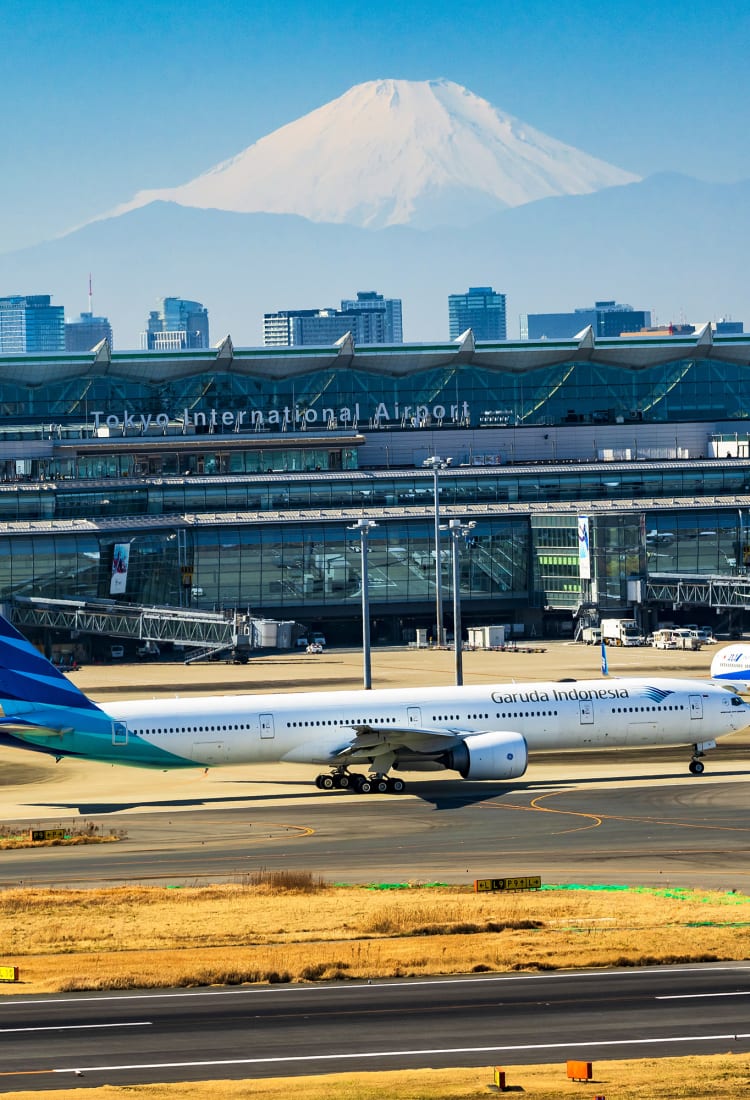
For Travelers Process Map and Checklist
All information here is gathered from the relevant authorities. Due to the regularly changing situation, it is essential for you to always check and follow the latest guidance.
Last updated: Wednesday, May 31st, 2023
Get ready for your dream trip to Japan! Japan is now open to travelers from all countries or regions! Those who enter Japan on or after April 29th 2023 are not be required to present a valid vaccination certificate or a Covid-19 negative test certificate.
Process Map -From April 29th 2023-
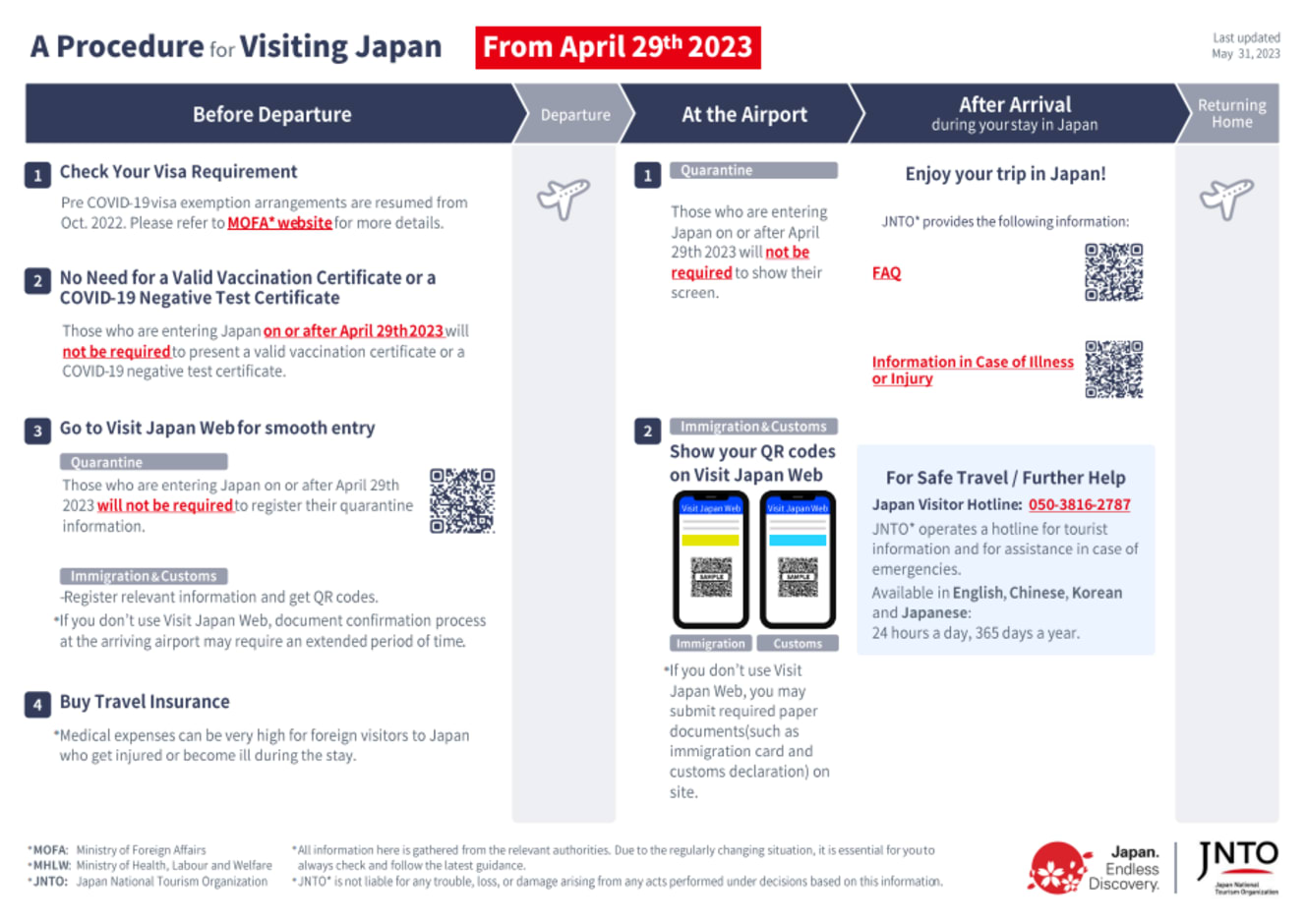
Checklist for Travelers
Before Departure
At the arrival airport in japan, after arrival, returning home, did this information help you.
out of found this information helpful.
Thank you for your feedback.
Other useful information.
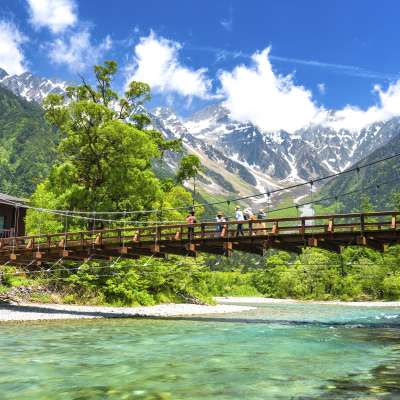
- For Travelers
Please Choose Your Language
Browse the JNTO site in one of multiple languages
We’re sorry, this site is currently experiencing technical difficulties. Please try again in a few moments. Exception: request blocked

Search Smartraveller

Latest update
Exercise normal safety precautions in Japan.
Higher levels apply in some areas.
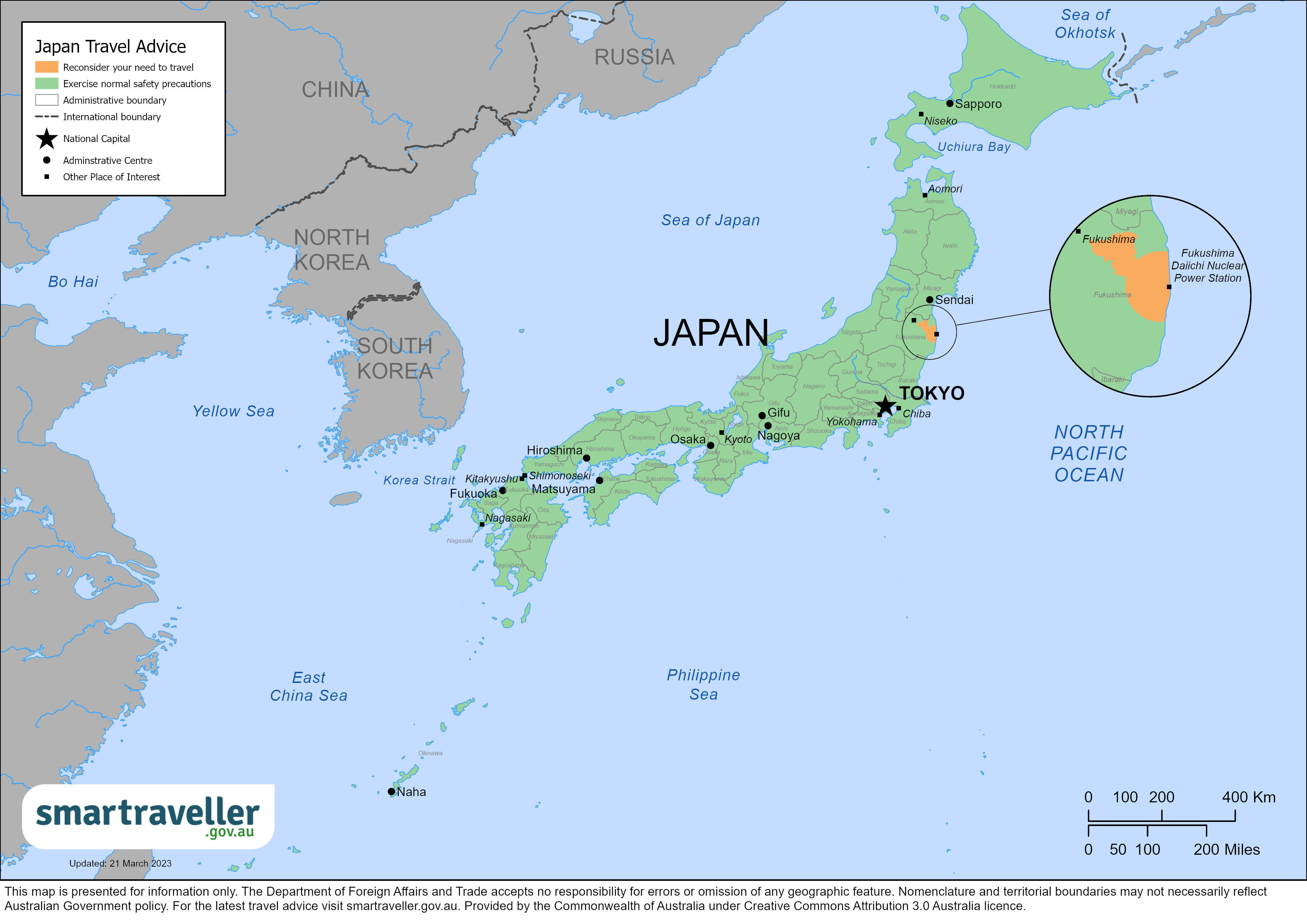
Japan (PDF 460.84 KB)
Asia (PDF 2.21 MB)
Local emergency contacts
Fire and rescue services, medical emergencies.
Call 110 or contact the local police at the nearest police station.
For Tokyo English-speaking Police, call 3501 0110 (Monday to Friday 8:30am to 5:15pm).
Advice levels
Reconsider your need to travel to the restricted areas near the Fukushima Dai-ichi nuclear power plant.
- Japan is prone to earthquakes and tsunamis. Japanese authorities have detailed plans to respond to natural disasters. In an earthquake, follow the advice of local authorities and emergency signage. Move to higher ground immediately if you're in a coastal region after a major earthquake. Check the Disaster Prevention Portal for more information.
- All major disaster warnings are published by the Japan Meteorological Agency . We recommend downloading NHK’s smart phone application to keep up to date with a natural disaster or other emergency alerts.
- A series of earthquakes occurred in Ishikawa Prefecture in Central Japan on and after 1 January 2024. Some infrastructure may remain impacted. Follow the advice of local authorities if travelling to affected areas.
- Regional tensions and the security situation, including with North Korea, could worsen with little warning. Tensions, which may affect Japan, could arise because of missile tests by North Korea. For advice see Japan's Civil Protection Portal Site .
- Japan has a low crime rate. Petty theft can happen, like bag snatching at popular tourist attractions. There's a risk of crime in bars and nightclubs. Crimes include overcharging, credit card fraud, forced withdrawal of large amounts of cash at ATMs, drink spiking and assault. Avoid taking large amounts of money and be vigilant in carrying your debit/credit card) when in bars or clubs and at parties.
Full travel advice: Safety
- Japan has strict rules about bringing medicine into the country, including some ingredients in ADHD and cold and flu medication. If you plan on bringing in medication, check if it's legal before you travel. See the Ministry of Health, Labour and Welfare website for more information.
- Restricted zones exist around the Fukushima Dai-ichi nuclear power plant. The 2011 earthquake caused the release of lethal radiation. Radiation levels in most parts of Japan, including Tokyo, are within the normal range.
- Medical facilities are of a high standard. You can find English-speaking medical staff in most major cities. You may need to pay upfront before you're treated.
Full travel advice: Health
- You must carry your passport (or Japanese residency card) with you at all times.
- Don't use or carry illegal drugs. Authorities can charge you if they find trace amounts of illegal drugs in your blood or urine.
- Japanese family law, including divorce and child custody, is very different to Australian law. For example, joint custody of a child after divorce is not a legal option, and there are limits to access for a non-custodial parent. The Family Courts in Japan generally consider that it is in a child's best interests for them to remain in their "usual place of residence". Courts, therefore, usually give sole custody to the parent who has taken care of the child most recently. If you're involved in custody or other family disputes, it is important to seek legal advice about your options both in Japan and in Australia. We have produced some general information about custody, child abduction and parental rights.
- Some employment agents mislead and encourage foreigners to work in Japan without the correct paperwork. If you want to work in Japan, verify the work offered and get the correct visa. Get legal advice before signing a contract.
- Japan has strict alcohol laws. The legal drinking age is 20. It's illegal to drive with any alcohol in your bloodstream. Allowing someone who has been drinking to drive is also illegal. Laws restrict alcohol consumption in specific areas on certain days, such as in Shibuya around Halloween night (31 October) and New Year's Eve. Smoking on the street is illegal in Tokyo and some other cities.
Full travel advice: Local laws
- Australians are eligible for Japan's visa exemption scheme for short-stay tourism and business travel. You don't need a visa to travel to Japan for up to 90 days. Entry and exit conditions can change at short notice. It is your responsibility to verify visa requirements from the nearest embassy or consulate of Japan.
- If you're travelling for any other reason, contact your nearest Japanese embassy or consulate to check if you need a visa, especially if you plan to work in Japan. Penalties may apply if you work in Japan on a tourist visa.
- It's dangerous to climb Mount Fuji from September to June.
- You can drive for up to 1 year with an Australian driver's licence and an International Driving Permit. If you're staying longer, you will need to obtain a local licence. Heavy snowfalls and ice in winter can make driving dangerous. It's illegal to drive with any alcohol in your bloodstream.
Full travel advice: Travel
Local contacts
- The Consular Services Charter details what we can and can't do to help you overseas.
- For consular help, contact the Australian Embassy in Tokyo or the Consulate-General in Osaka .
- To stay up to date with local information, follow the Embassy’s social media accounts
Full travel advice: Local contacts
Full advice
Terrorism is a threat worldwide.
Japan has security measures in place at key facilities, such as:
- public transport
- public event venues
- entry ports
More information:
- Terrorist threats
Regional Threats
Regional tensions and the security situation, including with North Korea, could worsen with little warning. Tensions, which may affect Japan, could arise because of missile tests by North Korea.
The Japanese Government has confirmed an increase in missile launch activity from North Korea towards Japan. At times, 'take shelter' alerts have been issued in some parts of Japan.
To stay safe:
- be alert to developments
- review the Civil Protection Portal Site advice from the Japanese Cabinet Secretariat for National Security Affairs and Crisis Management
- follow the instructions of local authorities
- check NHK World for the latest information
Japan has a low crime rate. Petty theft can happen, like bag snatching at popular tourist attractions from time to time.
There's a risk of crime in bars and nightclubs, especially in the Roppongi and Shinjuku (Kabuki-cho) entertainment areas of Tokyo. Both men and women have been targeted. You may be targeted with:
- overcharging
- fraudulent credit card charges
- forced withdrawal of large amounts of cash at ATMs
- drink spiking
- illegal drugs
You may be served drinks with higher alcohol content than normal. Some victims have woken in unknown places and discovered high credit card charges. Other victims have been taken to ATMs and forced to withdraw a large sum of cash while under the effects of drink spiking.
In these situations, you may find it hard to get a police report for your bank and travel insurer.
- never leave your drink unattended, and be cautious of accepting drinks from strangers or recent acquaintances
- don't take large amounts of cash to parties, bars, clubs or entertainment districts and be vigilant in carrying your debit/credit card
- Partying overseas
Cyber security
You may be at risk of cyber-based threats during overseas travel to any country. Digital identity theft is a growing concern. Your devices and personal data can be compromised, especially if you’re connecting to Wi-Fi, using or connecting to shared or public computers, or to Bluetooth.
Social media can also be risky in destinations where there are social or political tensions, or laws that may seem unreasonable by Australian standards. Travellers have been arrested for things they have said on social media. Don't comment on local or political events on your social media.
More information:
- Cyber security when travelling overseas
Mountain climbing and trekking
Trekking and mountaineering can be dangerous. Register your plans with local police before you go into the mountains, and take an emergency locator beacon with you.
Every year, a number of people die while trying to climb Mount Fuji.
Japanese Emergency Services warn against climbing from September to June when it's most dangerous. Check the official Mount Fuji Climbing website for each trail's climbing season dates.
Check your travel insurance covers you for extreme activities, such as mountain climbing.
Hikers and other travellers may encounter bears in parts of rural Japan. There have been incidents of fatal bear attacks. Some prefectural governments provide safety advice regarding bears.
If you plan to hike or camp in rural and mountainous areas of Japan:
- follow local safety advice and pay attention to
- warning notices
Snow sport safety
Back-country skiing (off-piste) and snowboarding is dangerous in most parts of Japan. You should stay within the boundaries of the ski resort.
Take an emergency locator beacon with you if you plan to explore other areas of the mountains.
Many travellers have suffered serious head injuries they could've prevented by wearing the right equipment.
Check your insurance policy covers you for snow sports.
Local ski resorts govern rules in each ski region. You can be arrested and detained for unruly behaviour.
If you're skiing in Japan:
- use a helmet and protective gear
- learn local rules and get weather updates from your hotel, a local tourism centre or the local ski resort
- obey local ski region rules
- only visit areas that local authorities mark as safe
- know what your travel insurance policy covers you for
Climate and natural disasters
A series of earthquakes occurred in Ishikawa Prefecture in Central Japan on and after 1 January. Some infrastructure may remain impacted. Exercise caution and follow local authorities' advice if travelling to affected areas.
Japan experiences natural disasters and severe weather , including:
- volcanic eruptions
- earthquakes
In an emergency, consular help may be severely limited.
Be prepared to deal with emergencies by:
- maintaining a basic emergency supply kit
- securing your passport in a safe, waterproof place
- follow the advice of local authorities, emergency services and local media updates. Make sure you react to any evacuation orders.
Disaster preparation
The Japan National Tourism Organization provides disaster preparation Safety Tips for visitors to Japan and other useful emergency information.
In any emergency or crisis, it's important to keep in contact with family and friends if possible.
The following stations broadcast emergency information in English:
- US Armed Forces station (810 AM)
- Inter FM (76.1 FM) in Tokyo
Japanese public broadcaster NHK provides a free smartphone app , which can be set to receive emergency notifications in English. This includes earthquake, tsunami, volcanic eruption, typhoon, and missile warnings.
If there's a natural disaster:
- follow local authorities' advice
- react to any evacuation orders
- monitor the media, other local information sources, and the Global Disaster Alert and Coordination System
- keep in contact with family and friends
Earthquakes and tsunamis
There's a constant risk of earthquakes and tsunamis.
The Japan Meteorological Agency provides information in English about earthquakes and tsunamis.
Know the dangers of a major earthquake and the emergency plan information in your area. Know where your local shelter is. This information is available from local or prefectural government offices, such as the Tokyo Metropolitan Government Disaster Prevention .
Local authorities are responsible during a crisis for helping people living or travelling within their jurisdictions.
If there's an earthquake:
- follow the advice of local authorities
- check the Japan Meteorological Agency for earthquake and tsunami information
- move to higher ground straight away if you're in a coastal region
Typhoons and severe weather
The typhoon season is from May to November, with most activity between July and September.
Local authorities broadcast current typhoon information through the local media and the Japan Meteorological Agency website.
If there's a typhoon approaching:
- check the latest typhoon information from the Japan Meteorological Agency’s website
- be alert to landslide risk areas
If there is heavy rain, stay indoors. If necessary, evacuate to a place on the second floor or higher. Find out the location of your nearest evacuation shelter and move there when safe to do so.
Keep away from areas with:
- steep hills at risk of landslides
- flooded streets
Be careful of fallen electrical lines.
Japan has 110 active volcanoes.
The Japan Meteorological Agency has a list of the latest volcano warnings.
If you plan to visit a volcanic area:
- be aware of alert levels, which can change at short notice
Winter weather
Parts of Japan experience heavy snowfalls and extremely low temperatures in winter.
Conditions can change suddenly.
Each year, people are injured or killed in snow-related incidents, including:
- motor vehicle accidents
- ice falling from roofs
- prolonged exposure to extreme cold
- ski accidents
Walking alone or under the effects of alcohol, or straying from marked trails, can be fatal.
Avalanches are common and heavy snowstorms can create deep powder snow drifts.
Travel insurance
Get comprehensive travel insurance before you leave.
Your policy needs to cover all overseas medical costs, including medical evacuation. The Australian Government won't pay for these costs.
If you are travelling while pregnant, confirm that your policy covers both your pregnancy and your baby in the event of a premature birth. Medical services for premature babies can cost over $A 150,000. See the advice for pregnant travellers page for more information.
If you can't afford travel insurance, you can't afford to travel. This applies to everyone, no matter how healthy and fit you are.
If you're not insured, you may have to pay many thousands of dollars up-front for medical care.
- what activities and care your policy covers
- that your insurance covers you for the whole time you'll be away
Physical and mental health
Consider your physical and mental health before you travel, especially if you have an existing medical condition.
See your doctor or travel clinic to:
- have a basic health check-up
- ask if your travel plans may affect your health
- plan any vaccinations you need
Do this at least 8 weeks before you leave.
If you have immediate concerns for your welfare, or the welfare of another Australian, call the 24-hour Consular Emergency Centre on +61 2 6261 3305 or contact your nearest Australian Embassy, High Commission or Consulate to discuss counselling hotlines and services available in your location.
Different environments, unfamiliar customs and language barriers may worsen existing mental health conditions. They may also trigger new issues.
Mental health treatment and services can differ to those in Australia.
If you need counselling services in English while in Japan:
- call TELL Lifeline (+81 3) 5774 0992
- call TELL Counselling (+81 3) 4550 1146
- General health advice
- Healthy holiday tips (HealthDirect Australia)
Not all medication available over the counter or by prescription in Australia is available in other countries. Some may even be considered illegal or a controlled substance, even if prescribed by an Australian doctor.
Japan has strict rules about bringing medication into the country. This affects both medication imports and medication you carry for personal use.
There are 4 categories (PDF 250 KB) of medicine. These are:
- psychotropic
You may need a permit or certificate to take medication into Japan. This will depend on the medication's classification, name and quantity.
Some medication is banned, including:
- the stimulant dexamphetamine, used to treat ADHD
- pseudoephedrine, found in some cold and flu tablets
Authorities could detain you if you're found with them.
For narcotic medications, including codeine, morphine and oxycodone, apply for a Narcotic Certificate. If you don't have this certificate when you enter Japan, authorities may confiscate the medication.
If you plan to bring medication, check if it's legal in Japan. Take enough legal medication for your trip. See the Ministry of Health, Labour and Welfare for more information.
Carry a copy of your prescription and a letter from your doctor stating:
- what the medication is
- your required dosage
- that it's for personal use
- Bringing medication into Japan
Health risks
Restricted areas exist around the Fukushima Dai-ichi nuclear power plant. The 2011 earthquake caused the release of lethal radiation. Radiation levels in almost all parts of Japan, including Tokyo, are within the normal range.
Monitor advice by the Japanese Government . There are ID checks points into the Restricted Areas . Do not enter without permission.
The Australian Radiation Protection and Nuclear Safety Agency (ARPANSA) provides details on radiation in Japan. ARPANSA has assessed the radiation levels in most parts of Japan, including Tokyo, to be within the normal range.
- Ministry of Health, Labour and Welfare
- Ministry of Economy, Trade and Industry
- Nuclear Regulation Authority
Insect-borne diseases
Japanese encephalitis can occur in Japan's rural areas. Get vaccinated against Japanese encephalitis before you travel.
To protect yourself from disease:
- make sure your accommodation is insect-proof
- use insect repellent
- wear long, loose, light-coloured clothing
Measles and rubella
Measles and rubella cases have been reported in Japan in recent years.
Make sure your vaccinations are up to date before you travel.
- Infectious diseases
- Measles immunisation service
- Rubella immunisation service
Medical care
Medical facilities.
Medical facilities are of a high standard. You can find medical facilities with English-speaking staff in most major cities, however, you may have difficulties finding English-speaking medical staff in some parts of Japan.
Medical care in Japan can be expensive. You may need to pay up-front or give a guarantee that you'll cover costs before you're treated.
The Japan National Tourism Organization lists hospitals with English and other foreign language-speaking staff.
There are many hospitals with decompression chambers in areas where diving is popular.
Medical information for Japan
You're subject to all local laws and penalties, including those that may appear harsh by Australian standards. Research local laws before travelling.
If you're arrested or jailed, the Australian Government will do what it can to help you within the scope of our Consular Services Charter , but we can't get you out of trouble or out of jail.
See the Australian Embassy Tokyo website for more information about arrests in Japan.
Be aware that you won't be allowed to make a phone call if you are arrested in Japan. You can also be detained for up to 23 days without any formal charge.
Authorities can arrest and charge you if they find trace amounts of illegal drugs in your blood or urine.
- Carrying or using drugs
- Tokyo Metropolitan Government
Japanese family law, including divorce and child custody, is very different to Australian law. For example, joint custody of a child after divorce is not a legal option, and there are limits to access for a non-custodial parent. The Family Courts in Japan generally consider that it is in a child’s best interests for them to remain in their “usual place of residence”. Courts therefore usually give sole custody to the parent who has taken care of the child most recently.
If you're involved in custody or other family disputes, consult a lawyer before you leave Australia or if you are already in Japan. We have produced some general information about custody, child abduction and parental rights.
Australia and Japan are both parties to The Hague Convention on the Civil Aspects of International Child Abduction.
If you're concerned that your child has been wrongfully removed to or detained in Japan, contact the Attorney-General's Department in Australia.
- Travelling with children
Employment law
Some employment agents may mislead and encourage foreigners to work in Japan without:
- the correct visa
- financial arrangements in place
This could leave you open to exploitation and prosecution.
Authorities have arrested Australians for working in the entertainment industry while in Japan on tourist visas.
If you want to travel to Japan for work:
- check the true nature of the work offered
- get the correct visa before arriving in Japan
- get legal advice before signing any contract
Living or working overseas
Police powers
Police can stop you on the street, demand identification and search you and your belongings.
If you're in a public place, police can seize:
- knives longer than 5.5cm, including blades and penknives
- any other weapons or things you could use as weapons
- any item they reasonably suspect you stole or have unlawfully
If they find any of these items on you, it’s likely that police will detain you.
If you're arrested, police can detain you for up to 23 days without charge, including for offences you might think are minor. Police might hold you for weeks or months while they investigate and undertake legal proceedings.
The initial police interview could last several hours. Police might record it in writing rather than electronically.
Under Japanese law, you can:
- remain silent
- access legal representation
- have an interpreter provided
However, in Japan police can question you without your lawyer present.
English interpreters may be substandard. Get a list of English-speaking lawyers around Japan from the Australian Embassy website.
If you're visiting Japan short-term as a tourist or for business, you must always carry your passport.
If you live in Japan, you must always carry your residence card.
It's illegal to:
- buy or drink alcohol if you're under 20 years old
- drive with any alcohol in your bloodstream
- allow someone under the influence of alcohol to drive a vehicle in which you're a passenger
The following activities are also illegal:
- importing or possessing firearms or other weapons without a permit
- smoking on the streets in some parts of Tokyo and other cities
- using UHF-CB radios (walkie-talkies) that don't meet Japanese standards, such as those purchased outside Japan
- resisting arrest or other actions that obstruct an official's duties
- flying a drone without a permit in many areas of Japan. Strict regulations apply under aviation laws
- having illegal drugs in your body (detected by urine testing).
Penalties for serious crimes, such as murder, include the death penalty.
Other sentences can include:
- heavy fines
- lengthy jail terms with hard labour
- deportation
Australian laws
Some Australian criminal laws still apply when you're overseas. If you break these laws, you may face prosecution in Australia.
- Staying within the law
Dual citizenship
Japan recognises dual nationality until the age of 20, after which the dual national must decide which nationality to retain.
- Dual nationals
Visas and border measures
Every country or territory decides who can enter or leave through its borders. For specific information about the evidence you'll need to enter a foreign destination, check with the nearest embassy, consulate or immigration department of the destination you're entering.
Australians are eligible for Japan's visa exemption scheme for short-stay tourism and business travel.
You don't need a visa if you're visiting for less than 90 days:
- as a tourist
- for a business trip or conference
- to visit friends and family
After entering under the visa exemption scheme, entry status cannot be changed to another visa status without departing and then re-entering Japan with the appropriate visa, such as a spouse, work, or study visa.
See the Embassy of Japan in Australia website for more information (including eligibility and required documents).
See the Ministry for Health, Labour and Welfare and the Ministry of Foreign Affairs websites for full details on entry requirements.
More information
- Immigration Bureau of Japan (Government of Japan)
- Customs and Tariff Bureau of Japan (Government of Japan)
Border measures
If you're transiting through Japan and your onward flight is leaving from a different airport, you must enter Japan. In order to transit between airports you will need to meet the entry requirements detailed above.
Please confirm any questions about transit directly with your airline.
Other formalities
You'll be photographed and fingerprinted electronically when you arrive, even if you're a permanent resident in Japan. If you refuse, immigration officers could deny you entry.
Travellers aged under 16 years, or who hold a diplomatic or official visa, are exempt.
If you'll be staying in Japan long term, you will need to register your details with the Immigration Bureau of Japan before arriving. Once you present the correct landing permission, you'll get a residence card. You must always carry it with you.
Ministry of Internal Affairs and Communication
Some countries won't let you enter unless your passport is valid for 6 months after you plan to leave that country. This can apply even if you're just transiting or stopping over.
Some foreign governments and airlines apply the rule inconsistently. Travellers can receive conflicting advice from different sources.
You can end up stranded if your passport is not valid for more than 6 months.
The Australian Government does not set these rules. Check your passport's expiry date before you travel. If you're not sure it'll be valid for long enough, consider getting a new passport .
Lost or stolen passport
Your passport is a valuable document. It's attractive to people who may try to use your identity to commit crimes.
Some people may try to trick you into giving them your passport. Always keep it in a safe place.
If your passport is lost or stolen, tell the Australian Government as soon as possible:
- in Australia, contact the Australian Passport Information Service .
- if you're overseas, contact the nearest Australian embassy or consulate .
If you lose your passport while travelling in Japan, try retracing your steps. Lost items are often handed into hotels, shop owners, train stations and police boxes.
It's important to look after your passport carefully. Passports that have gone through a washing machine or exposed to heavy rain will likely need to be replaced.
Passport with ‘X’ gender identifier
Although Australian passports comply with international standards for sex and gender, we can’t guarantee that a passport showing 'X' in the sex field will be accepted for entry or transit by another country. Contact the nearest embassy, high commission or consulate of your destination before you arrive at the border to confirm if authorities will accept passports with 'X' gender markers.
More information:
- LGBTQIA+ travellers
The Japanese currency is the Yen (JPY).
No restrictions apply to bringing foreign currency in or out of the country. Declare all amounts more than JPY 1 million or equivalent, when you arrive or leave. This covers all forms of currency, not only cash.
Cash is preferred in most places, but cards are becoming more widely used, especially in major cities.
Hotels accept major credit cards. Credit cards are still not widely accepted outside major cities.
Some ATMs at banks and convenience stores don't accept foreign cards.
Ask your bank if your cards will work in Japan.
Local travel
Check the Japan National Tourism Organization for emergency updates in English. The site also has advice on safe and hassle-free travel in Japan.
Fukushima and surrounding areas
There are some restricted areas around the Fukushima Dai-ichi nuclear power plant. This is due to the 2011 earthquake that resulted in the release of lethal radiation. The Japanese Government specifies these areas.
If you must stay overnight in restricted areas, ask local authorities for advice on how to minimise health risks.
Monitor and follow the advice from local authorities.
- Australian Radiation Protection and Nuclear Safety Agency (ARPANSA)
Travelling in Japan with a Disability
Japan has a number of resources available online with tips and advice on travelling around Japan as a tourist with a disability.
- Japan Travel – Traveling with a disability
- Japan Accessible Tourism Center
- Accessible Travel Japan
- Advice for travellers with a disability
Driving permit
To drive in Japan, you must hold either:
- a valid Japanese driver's licence, or
- a valid International Driving Permit (IDP) and a current Australian driver's licence
After 365 days, you need to get a Japanese licence.
Get your IDP before leaving Australia.
- Driving in Japan
- Tokyo Metropolitan Police Department
Road travel
Roads and vehicles are mostly well-maintained and traffic is orderly.
Vehicles travel is on the left-hand side like in Australia. In Japan it's illegal to drive with any alcohol in your bloodstream.
Heavy snowfalls and ice in the winter can make driving dangerous, especially if you are unaccustomed to driving in these conditions. Ensure your vehicle has the necessary equipment, including snow tyres, chains, and a dig-out kit. More information:
Driving or riding
Motorcycles
Check your travel insurance policy covers you for riding motorbikes.
Always wear a helmet.
It's safe to use taxis in Japan.
Taxi drivers usually open and shut the rear passenger doors remotely.
Public transport
Japan has modern and reliable rail and bus services.
Transport and getting around safely
DFAT doesn't provide information on the safety of individual commercial airlines or flight paths.
Check Japan's air safety profile with the Aviation Safety Network.
Passenger ferries depart from Tokyo (Yokohama) to many destinations across Japan as well as Asia.
Several international cruises stopover in Japan.
- Going on a cruise
Japan National Tourism Organization (JNTO)’s Tourist Information Center accepts telephone enquiries 24 hours a day. Call (+81 3) 3201 3331.
Contact your provider with any complaints about tourist services or products.
You can also contact the National Consumer Affairs Center of Japan’s Consumer Hotline for Tourists. Call (+81 3) 5449 0906 from Monday to Friday 10am to 4pm, excluding national holidays.
Emergencies
Depending on what you need, contact your:
- family and friends
- travel agent
- insurance provider
For Tokyo English-speaking Police, call (+81 3) 3501 0110 (Monday to Friday 8:30am to 5:15pm).
Always get a police report when you report a crime.
If a report is hard to get, seek advice from a lawyer or the English-speaking Police.
Your travel insurer should have a 24-hour emergency number.
Mental health services
Call TELL Lifeline services in English (+81 3) 5774 0992.
Call TELL Counselling services in English (+81 3) 4550 1146.
Living in Japan
English information on living in Japan is available from the:
- Japanese Cabinet Office
- Council of Local Authorities for International Relations
- Tokyo International Communications Committee
In Tokyo, for advice from the Foreign Residents' Advisory Centre , call (+81 3) 5320 7744.
Consular contacts
Read the Consular Services Charter for what the Australian Government can and can't do to help you overseas.
For consular assistance, contact the Australian Embassy in Tokyo or Australian Consulate-General in Osaka .
Australian Embassy, Tokyo
2-1-14 Mita, Minato-ku
Tokyo 108-8361
Phone: (+81 3) 5232 4111
Fax: (+81 3) 5232 4057
Website: japan.embassy.gov.au
Email: [email protected]
Facebook: Australian Embassy Japan
Instagram: @australianinjpn
X: @AustraliaInJPN
Check the Embassy website for details about opening hours and any temporary closures.
Australian Consulate-General, Osaka
16th Floor, Twin 21MID Tower
2-1-61 Shiromi, Chuo-ku
Osaka 540-6116
Phone: (+81 6) 6941 9271 or (+81 6) 6941 9448
Fax: (+81 6) 6920 4543
Website: japan.embassy.gov.au/tkyo/location_osaka.html
24-hour Consular Emergency Centre
In a consular emergency, if you can't contact an embassy, call the 24-hour Consular Emergency Centre on:
- +61 2 6261 3305 from overseas
- 1300 555 135 in Australia

Travelling to Japan?
Sign up to get the latest travel advice updates..
Be the first to know official government advice when travelling.
Take the Quiz: Find the Best State for You »
What's the best state for you ».
Japan Visitors Exceed 3 Million for 2nd Straight Month, Tourism Agency Says

FILE PHOTO: Visitors take selfie photos under an early-flowering Ookanzakura cherry blossoms in full bloom at Ueno Park in Tokyo, Japan March 8, 2024. REUTERS/Issei Kato/File Photo
TOKYO (Reuters) - Japan welcomed more than 3 million visitors for a second straight month in April, official data showed on Wednesday, setting the stage for a potential record year for tourism.
The number of foreign visitors for business and leisure was 3.04 million last month, edging down from the monthly record of 3.08 million achieved in March, data from the Japan National Tourism Organization (JNTO) showed.
Arrivals in April were up 56% from the prior year and 4% higher than in 2019, before the COVID-19 pandemic shut global borders. Visitors from France, Italy, and the Middle East rose to record levels in April for any single month.
The yen's slide to a 34-year low has made Japan a bargain destination for foreign visitors, with arrivals set to blow past the annual record of 31.9 million seen in 2019.
While the surge in arrivals is good news for Japan's economy, it has caused frictions with locals. Complaints of litter and illegal parking caused local officials to erect a barrier this month to block a popular photo spot of Japan's iconic Mt. Fuji.
Trail restrictions and a new 2,000 yen ($12.79) fee will go into effect for Mt. Fuji climbers this summer after a rise in pollution and accidents during last year's hiking season.
Visitors from Mainland China, Japan's biggest tourist market before the pandemic, exceeded 500,000 in April for the first time since January 2020 but were still 27% below the level in 2019.
(Reporting by Rocky Swift; Editing by Subhranshu Sahu)
Copyright 2024 Thomson Reuters .
Join the Conversation
Tags: Japan
America 2024

Health News Bulletin
Stay informed on the latest news on health and COVID-19 from the editors at U.S. News & World Report.
Sign in to manage your newsletters »
Sign up to receive the latest updates from U.S News & World Report and our trusted partners and sponsors. By clicking submit, you are agreeing to our Terms and Conditions & Privacy Policy .
You May Also Like
The 10 worst presidents.
U.S. News Staff Feb. 23, 2024

Cartoons on President Donald Trump
Feb. 1, 2017, at 1:24 p.m.

Photos: Obama Behind the Scenes
April 8, 2022

Photos: Who Supports Joe Biden?
March 11, 2020

U.S. Military Deaths, by War
Elliott Davis Jr. May 25, 2024

Takeaways From the NCAA’s Settlement
Laura Mannweiler May 24, 2024

Noncitizen Voting: the Fiction and Facts
Aneeta Mathur-Ashton May 24, 2024

Quiz: Who Said What in Trump’s Trial?
U.S. News Staff May 24, 2024

CDC: COVID-19 Strains Are on the Rise
Cecelia Smith-Schoenwalder May 24, 2024

Consumers See Worsening Job Market
Tim Smart May 24, 2024

Free Shipping on Subscriptions. Get Started
Le Creuset Japan Exclusives. Limited-time! Shop Now

- Shop Bokksu Snack Box Subscribe Gift Past Themes Bokksu Boutique Shop Boutique Gifts Gift Cards Corporate Gifts
- About About Our Story Our Makers Maker's Documentary Support FAQ Contact Us Information Our Blog Today's Offers Community Careers Rewards Refer a Friend
Premium subscription box sourcing Japanese snacks from centuries-old family makers.
A subscription box of supercute snacks and surprises featuring everyone’s best friend.
Specialty and gourmet gifts for every occasion, all made and shipped from Japan.
Online Asian grocery store delivering pantry items, frozen foods, beverages, and more.
- Snack Box Subscriptions
More from Bokksu
Past Themes
- Best sellers
- 2023 Holiday Collection
- New Arrivals
- Bokksu Exclusives
- The Kyoto Collection

- Bokksu Snack Box
- Corporate Gifts

Information
- Maker's Documentary
- Today's Offers
- Refer a Friend
RECIPIENT EMAIL
GIFT MESSAGE
Customers Also Loved
Shop Snack Box Subscriptions

Shop Boutique

Premium Japanese snack subscriptions.

Specialty and gourmet gifts only found in Japan.

Asian grocery essentials for cooking and eating.

- Hello Kitty®️ And Friends Snack Box
Free Shipping On All Subscriptions

Journey to Hakone: Exploring Japan's Scenic Paradise
Introduction to hakone: japan's scenic gem and retreat destination.

Situated in the heart of Japan's Kanagawa Prefecture lies Hakone, a captivating town renowned for its breathtaking natural landscapes, rejuvenating hot springs, and rich cultural heritage. This picturesque destination, surrounded by lush greenery and graced by the presence of Mount Hakone, has long been a favorite retreat for travelers seeking serenity and relaxation.
Getting to Hakone: Navigating Your Journey from Tokyo

Traveling from the bustling metropolis of Tokyo to the tranquil landscapes of Hakone is a delightful adventure filled with scenic views and convenient transportation options. One of the best and affordable ways to explore Hakone is with a Hakone Free Pass , a discounted ticket tailored for exploring the region. This pass grants unlimited rides of Odakyu-affiliated buses, trains, boats, cable cars, and ropeways, allowing travelers to navigate Hakone's attractions effortlessly. Additionally, it provides discounted admission to select tourist destinations for either two or three consecutive days.
Below are other public transport options available to explore Hakone:
Odakyu Electric Railway (Romancecar): The fastest way to travel directly from Tokyo to Hakone is via the Odakyu Electric Railway. Take the Odakyu Limited Express Romancecar from Shinjuku Station to Hakone-Yumoto Station, the main entry point to Hakone.
JR (Japan Railways): With a JR Pass (Japan Railway), you can catch the JR Tokkaido Shinkansen from Shinagawa Station or Tokyo Station. You also have the option to use rapid or local trains on the JR Tokaido Main Line or the JR Shonan Shinjuku Line to reach Odawara, although this route generally takes more time. Upon reaching Odawara, transfer to a local train to get to Hakone-Yumoto Station. Keep in mind that JR trains only go as far as Odawara, requiring non-JR trains to access the Hakone area.
Board the Odakyu Hakone Highway Bus at the Shinjuku Expressway Bus Stop (located at Shinjuku West Exit), heading towards Gotemba in northern Hakone and then continuing to Hakone Togendai by Lake Ashi. This journey usually lasts slightly over two hours under favorable traffic conditions.
Hakone Shrine: Discovering Sacred Beauty Amidst Nature

Nestled amidst the picturesque landscapes of Hakone lies a hidden gem of spiritual tranquility and natural beauty—the Hakone Shrine. This sacred Shinto shrine, steeped in centuries of history and tradition, stands as a timeless beacon of Japan's rich spiritual heritage and cultural splendor.
One of the most striking features of Hakone Shrine is its iconic Red Gate of Peace (Heiwa no Torii). Positioned at the water's edge of Lake Ashi, this grand gate serves as a symbolic threshold between the earthly and spiritual realms. On clear days, the magnificent silhouette of Mount Fuji provides a stunning backdrop for photography enthusiasts.
Behind this majestic gate, a staircase lined with centuries-old cedar trees and torii gates leads up to the main shrine building, which features a distinctive vermillion-color facade adorned with intricate wood carvings and ornate details. The shrine complex also includes various visitor amenities, such as a museum showcasing a collection of historical treasures, five of which are designated as Important Cultural Properties. Additionally, there is the Kuzuryu Shrine , a sub-shrine dedicated to the nine-headed dragon believed to be the guardian deity of Lake Ashi.
Dedicated to multiple deities renowned for safeguarding against disasters and ensuring safety of travelers, Hakone shrine attracts numerous visitors seeking blessings for safe journeys, harmonious marriages, prosperity, travel safety, and success in their endeavors.
Hakone Open-Air Museum: Immersing Yourself in Art and Nature

Opened in 1969, the Hakone Open-Air Museum is Japan's first outdoor gallery, showcasing a whopping 120 sculptures dotted throughout its grounds against a scenic backdrop of valleys and mountains. This setting achieves a seamless integration of nature and art, harmonizing the museum's artistic treasures with the natural beauty of its surrounding. The juxtaposition of art against nature's ever-changing canvas creates a dynamic interplay of form, texture, and space, with each season imbuing a distinct atmosphere and mood.
Aside from sculptures by renowned artists like Henry Moore, the Hakone Open-Air Museum also features the Symphonic Sculpture, designed like a tower that allows visitors to climb a spiral staircase enveloped by vibrant stained glass to reach a viewing platform overlooking the park and mountains. Additionally, the museum houses the Picasso Exhibition Hall, displaying two levels filled with over 300 works by the acclaimed artist, including oil paintings, prints, and ceramics.
Lake Ashi Cruise: Sailing Across Scenic Waters with Mount Fuji Views

Formed within Mount Hakone's caldera following its last eruption 3,000 years ago, Lake Ashi allures visitors with its serene charm and invites them to embark on an enchanting cruise experience. Setting sail from one of the lake's picturesque ports, such as Moto-Hakone, Togendai, or Hakone-en, the cruise takes you on a captivating voyage across the beautiful Lake Ashi, unveiling stunning vistas at every turn. One of the highlights is the sight of Mount Fuji, especially on clear days when its iconic peak is reflected in the calm waters of the lake, creating a postcard-perfect scene.
Pirate Ship Cruise: Sailing in Style on Lake Ashi

Channel your inner One Piece pirate energy and embark on a pirate ship cruise to discover the enchanting beauty of Lake Ashi like never before. As you climb aboard the pirate ship, you're instantly transported to a world of adventure and imagination. The ship's design, complete with masts, sails, and pirate-themed decor, creates an atmosphere of excitement and intrigue. Today, three types of Hakone Pirate Ships are in operation: the red "Royal II", blue and black "Victory". and green "Vasa." Each ship features distinct decor, providing passengers with a unique experience on board.
Owakudani: Soaking in the Mystique of Hakone's Volcanic Valley

Visiting Hakone is incomplete without a trip to one of its most famous tourist spots — Owakudani, or the Great Boiling Valley, a geothermal wonder celebrated for its otherworldly beauty and natural wonders. A result of volcanic eruptions millennia ago, Owakudani invites visitors to witness volcanic activity up close, featuring active sulfur vents and hot springs scattered across its rugged landscape. This activity creates a dramatic spectacle, with plumes of steam rising from the earth, creating an ethereal atmosphere that feels like stepping into a mythical realm. In addition to its iconic geothermal features, many tourists come specifically to taste the local specialty called kuro-tamago . These eggs are cooked in Owakudani's hot spring pools, causing their shells to turn black due to the sulfur content. Keep in mind that the area may occasionally be closed due to volcanic gases, so make sure to check beforehand before your visit.
Hakone Ropeway: Soaring Above Spectacular Scenery

Embark on a spectacular journey through Hakone's captivating landscapes aboard the Hakone Ropeway. This ropeway is part of the "Hakone Loop", a scenic route that showcases the region's natural beauty and popular destinations through various modes of transportation—all conveniently covered by the Hakone Free Pass. The Hakone Ropeway journey unfolds amidst panoramic views of Mount Fuji, the Owakudani Valley, and Ashi Lake, offering breathtaking perspective of Hakone's majestic scenery. The ropeway route runs between Sounzan Station in Gora to Togendai Station, with a ropeway car change to Owakudani, serving as a scenic mode of travel for visitors heading to the geothermal wonder. Covering approximately 4 kilometers, the Hakone Ropeway boasts one of the world's longest ropeway rides. Its immense popularity is underscored by its recognition in the Guinness Book of Records in 2010 as the most ridden cable car globally, with over 2 million passengers annually.
Hakone Museum of Art: Admiring Treasures of Japanese Culture

For a deeper dive into Japanese art and culture, the Hakone Museum of Art awaits your exploration. Established in 1962 by Okada Mokichi, this museum stands as the oldest in the Hakone region, offering a captivating journey through Japan's artistic legacy. At the heart of the museum lies an impressive collection of Japanese ceramics, spanning epochs from ancient times to the Edo Period (1600-1868). Among its treasures is the Haniwa Burial Statue, revered as an Important Cultural Property, alongside a range of ceramics from centuries past, each narrating tales of exquisite craftsmanship and historical significance. The museum's allure extends beyond its exhibits to its enchanting grounds, which include not just a moss garden but also the sprawling Sekirakuen Garden. This Japanese garden, recognized as a national scenic beauty in 2021, captivates visitors with its serene beauty.
Gora Park: Strolling Through Tranquil Gardens and Tea Houses

For a relaxing retreat, visit Hakone Gora Park, a picturesque oasis of natural beauty and cultural delights. Perched gracefully on a steep slope above Gora Station, this French-style garden is renowned for its vibrant floral displays and stunning landscapes. Among its many attractions, the enchanting rose garden stands out as a highlight, offering a mesmerizing spectacle of colors and fragrances during the spring and summer seasons.
Beyond the rose garden, Gora boasts two greenhouses. One houses an array of tropical herb, creating a verdant haven, while the other showcases an impressive collection of bougainvillea plants, including Japan's oldest bougainvillea, estimated to be over 140 years old.
Additionally, the park provides various amenities, including workshop studios where visitors can engage in craft activities like glass blowing and pottery. Moreover, guests can relax and enjoy a cup of green tea at the Hakuun-do Chaen tea house.
Hakone Hot Springs: Indulging in Relaxation and Wellness

Hakone is renowned as a sanctuary of hot springs, or onsen in Japanese, celebrated for their therapeutic properties and tranquil settings. While Hakone boasts over twenty hot springs in total, seventeen are officially recognized known as Ju-nana-yu (Hakone's Seventeen Hot Spring Resources), which includes seven of its original natural onsen dating back to the Edo period, such as the Hakone Yumoto Onsen. A visit to any of these natural hot springs is not just a journey of physical renewal but also a soul-soothing experience that immerses you in centuries-old traditions and the healing power of nature.
The mineral-rich waters, heated by Mount Hakone's ongoing hydrothermal activity, are believed to possess healing properties that promote relaxation, improve circulation, and soothe muscle aches and pains. Complementing their healing attributes, many of Hakone's hot springs are nestled in secluded valleys or perched on hillsides, offering guests a sense of tranquility and connection with nature. Whether you prefer the serene ambiance of an open-air public bath embraced by lush foliage or seek the intimate seclusion of your own private onsen , each hot spring experience is a harmonious blend of rejuvenation and natural beauty.
Discover the rejuvenating waters and serene retreats of Japan's onsen by reading our article here.
Hakone Checkpoint: Stepping Back in Time to Edo-era Japan

Nestled within the picturesque landscapes of Hakone, lies a historic treasure that whispers tales of the past—the Hakone Checkpoint. Dating back to the Edo period, this checkpoint held a vital position along the Tokaido highway, a crucial transportation route connecting Tokyo and Kyoto. As one of the fifty-three stations along Tokaido, Hakone Checkpoint played a pivotal role in maintaining order, collecting tolls, and regulating travel across the region. Beyond its historical significance, the Hakone Checkpoint is a symbol of Japan's commitment to preserving its cultural heritage. Meticulously restored to its original state, Hakone Checkpoint now comprises two gates, guardhouses, a stable, and a museum that delves into local history. Resting alongside Ashi Lake, this site is a must-see for those eager to step back in time and experience the ambiance of Edo-era Japan.
Hakone Cuisine: Savoring Local Delicacies and Flavors
Celebrate the richness of local flavors by trying Hakone's culinary treasures, ranging from traditional meals to regional specialties. Here are a few of the must-try delicacies to include on your Hakone food bucket list:
Kuro-Tamago (Black Eggs) At the top of your list should be none other than Kuro-Tamago . These black eggs are boiled in the natural 80-degree Celsius sulfuric water of Owakudani's hot springs. Besides their distinctive black-shell appearance, they taste like regular boiled eggs but are believed to add seven years to your life. You can purchase them at souvenir shops located in Owakudani.

Yuba (Tofu Skin) Yuba is a velvety tofu skin crafted by boiling soy milk. This versatile delicacy can be enjoyed fresh, dried, or added to hot pots, soups, and stir-fries. Rich in protein, vitamins and minerals, yuba serves as a great meat substitute for vegetarians and health-conscious diners.

Hakone Travel Tips: Insider Advice for a Memorable Visit

To make the most of your Hakone adventure, here are some practical tips and recommendations to ensure an unforgettable experience. If you're taking day trips to Hakone, you can use the luggage storage facilities at the train station where you start your journey. For overnight stays, it's advisable to book your accommodation in advance after finalizing your transportation arrangements. Hakone boasts a variety of lodging options, ranging from Western-style hotels to traditional Japanese inns known as ryokans . While Western hotels offer upscale amenities, we strongly recommend opting for a ryokan to fully immerse yourself in an authentic Japanese experience. Ryokans enchant guests with tatami mat floors, futon bedding, and communal or private baths, creating an ambiance deeply rooted in Japanese culture. Alternatively, onsen resorts present another authentic option, combining accommodation with access to their own hot springs that overlook Hakone's scenic landscapes.
To ensure a seamless and enjoyable trip, acquaint yourself with Japan's local customs, especially if you intend to stay at a ryokan or experience onsen baths. Before entering communal onsen baths, remember to wash and rinse your body thoroughly. Keep in mind that some onsen may have rules about tattoos due to cultural beliefs, so it's wise to inquire about their tattoo policies in advance.
As you plan your trip, keep in mind that Hakone's beauty transforms every season, so it's a good idea to time your trip accordingly. In spring, cherry blossoms and azaleas paint the landscape in pink and white hues. In the summer, the Hakone Tozan railway offers a picturesque journey amidst blooming hydrangeas along the route from Hakone-Yumoto to Gora Station. The transition to autumn brings a bright tapestry of red, orange, and gold foliage, while winter turns Hakone into a winter wonderland, offering the highest chance to witness the majestic Mount Fuji in its full glory.
With each season painting a new portrait of colors and experiences – from cherry blossoms in spring to vibrant foliage in autumn – Hakone is a destination that promises a harmonious blend of relaxation, exploration, and cultural discovery.
As you plan your Hakone getaway, treat yourself to a Bokksu Snack Box subscription , featuring a thoughtfully curated assortment of Japanese snacks in every monthly box delivered right to your doorstep.
Trending Posts

Featured product

$42 50 $42.50
Explore more
- Bokksu Trends
- Company News
- Essential Guide
- Hello Kitty
- Japanese Desserts
- Learn Japanese
- Maker Story
- Modern Japan
- Survey Results
- Tasting Bokksu
- Traditional Japan
More from the blog

Sign up to get exclusive offers and more
New 6- and 12-month subscribers get FREE bags of special edition Japanese Kit Kats using the code TREAT24.
Japan, famously polite, struggles to cope with influx of tourists
Huge numbers of visitors are causing chaos at such popular spots as Mount Fuji and Kyoto, leading to some extreme measures to tamp down the crowds.
TOKYO — Japan is proud of its “omotenashi” spirit, its practice of wholeheartedly caring and catering for guests. But a post-covid surge in tourist numbers, coupled with a weak yen that makes Japan cheaper for many visitors, is pushing Japan’s world-famous hospitality to the brink.
One town is installing a huge screen to stop tourists causing traffic jams while they take selfies in front of Mount Fuji. At least one overrun restaurant is reserving Friday nights for locals only. Even the deer of Nara, usually very proactive about coming forth for snacks, have had their fill.
This is because international tourists, unable to enter Japan for 2½ years during the covid pandemic, now appear to be making up for lost time.
The Japanese yen has been steadily weakening, losing more than 40 percent of its value against the U.S. dollar in the past five years and making Japan a much cheaper place to visit.
A staggering 25.1 million tourists visited the country last year, marking a sixfold increase from 2022. In March, at the start of the cherry blossom season, 3.08 million visitors arrived in the country, according to data from the Japan National Tourism Organization ( JNTO ), with the monthly number surpassing 3 million for the first time since records began in 1964.
GET CAUGHT UP Summarized stories to quickly stay informed

How Florida’s abortion law is affecting East Coast abortion clinics

In France, two young politicians are in a bitter fight over the future of Europe

Schools that never needed AC are now overheating. Fixes will cost billions.

World Central Kitchen draws criticism for its neutrality in Gaza

A Black rising star lost his elite orchestra job. He won’t go quietly.
Just over a quarter of tourists this year have come from South Korea, while about 17 percent are from Taiwan and 15 percent from China. Americans have made up less than 7 percent of tourists since January.
The influx has been good for the Japanese economy: Spending by visitors to Japan in the first quarter of this year totaled $11.4 billion (1.75 trillion yen), the highest quarterly figure ever recorded, according to the Japan Tourism Agency . The average spending per person was about $1,300 (208,760 yen), up 41.6 percent from the same period in 2019.
But, in many popular places, it has not been good for the locals. There have been widespread complaints about overcrowding, litter, strain on infrastructure and a particularly Japanese worry: not being able to devote the requisite amount of care to each visit.
The concept of “omotenashi” is at the heart of the Japanese service sector. This wholehearted hospitality and level of attentive service can be felt in hotels, restaurants and shops from the moment one arrives in Japan — in fact, from the moment the air marshallers on the airport tarmac bow as planes taxi up to the boarding bridge. It’s in the white gloves of taxi drivers and the individually wrapped wet wipe that accompanies even the cheapest cup of coffee.
“Overtourism is a serious issue in Japan with tourism concentrated in the major centers, lacking the infrastructure to deal with the volume of visitors,” said Max Mackee, founder of adventure travel company Kammui.
“This can ruin the tourists’ experience, particularly as the beauty of Japan is often found in its peace and meditative moments, even in cities like Tokyo. It’s also a serious issue for the local population, which is not equipped to handle visitors, which can lead to local resentment, environmental impact or even closure of restaurants and bars and other establishments on the tourist trail.”
Screening off Mount Fuji
Fed up with badly behaved tourists, the town of Fujikawaguchiko is building a screen to block views of Mount Fuji at a popular photo spot.
The Lawson convenience store in the town has become a hit on social media because the renowned volcanic cone sits perfectly above the store’s neon sign. Tourists have flocked to the store’s parking lot to take photos of themselves in front of the Instagrammable scene.
Residents complained about the traffic problems, unauthorized parking, trespassing and littering this was causing. The Ibishi Dental Clinic, across the street, even installed a barrier to keep tourists away and ensure customers could get in.
“When we asked people to move their cars, some yelled back, and some even threw lit cigarettes. There are days where it’s difficult to provide proper medical services,” the clinic wrote in a statement on its website .
“Obviously it’s regretful for us too, to lose that view from our clinic, but we believe that it’s now an inevitable measure that needs to be taken in response to the unthinkable violations that exceed all measures we have taken until now.”
Lawson even issued a statement apologizing to residents and customers for the inconvenience.
The town has decided on more extreme measures: It is constructing a mesh net that is 8 feet tall and 65 feet wide to block the view, expected to be finished next week. “To ensure the safety of both tourists and drivers, and to ensure the peaceful life of residents, we have regrettably come to the difficult decision to proceed with this construction,” the town of Fujikawaguchiko posted on its website .
Then there are the crowds on the mountain itself.
Mount Fuji — Japan’s highest peak and a popular tourist destination — has been dealing with overcrowding in recent years, and the influx of overseas tourists has led the prefecture to take measures.
Starting this week, authorities have instituted an online booking system to stop Mount Fuji’s most popular trail from becoming excessively crowded during the summer hiking season. A maximum of 4,000 people will be allowed on the Yoshida Trail each day during the July-to-September hiking season, with 3,000 of the spots requiring advance bookings at $13 a pop.
Kyoto crackdown
In February, Koji Matsui was elected as Kyoto’s new mayor after campaigning against overtourism. Kyoto, just over two hours from Tokyo by bullet train, is famous for its temples and shrines and its traditional wooden buildings.
The city, once Japan’s capital, has a resident population of about 1.5 million but saw more than 20 times that number — about 32 million — of tourists arriving last year.
One major attraction is the Gion district, where geisha and their apprentices can be seen walking around in traditional kimonos and makeup. Kyoto last month banned tourists from entering private alleys in Gion after locals complained that the neighborhood was “not a theme park” and urged the government to act against unruly tourists.
Matsui’s other campaign pledges included charging tourists more than residents to take public transport fares and creating special tourist bus routes. The new mayor also plans to introduce “smart” garbage cans that send signals to the management bureau when full to try to curtail littering.
“ While we are very grateful for the large number of tourists attracted by the charms of Kyoto, we are now facing serious challenges in achieving a healthy balance between tourists and local citizens, ” Matsui said during his inauguration news conference.
The picturesque temples and gardens of Nara, just south of Kyoto, make it a popular side trip. And almost every visitor goes to Nara Park, where deer wander freely and vendors sell rice crackers, which the deer love. Usually.
Nara deer usually approach people and famously “bow” to — or sometimes butt — them to ask for the crackers. Not anymore.
This month during Golden Week, a popular Japanese holiday period, visitors to Nara found that deer were done with the rice snacks.
“Deer crackers have now become absolutely worthless due to the sudden surge in deer crackers during Golden Week,” one visitor wrote on X, posting a photo of an unimpressed deer lying beside four uneaten crackers.
これはGWの急激なシカ高せんべい安によって紙くず同然の価値となった鹿せんべい。 pic.twitter.com/hJNus8d0MA — 魅惑のなめろうフィットネス (@cqFv4ntcLoT6Sk6) May 5, 2024
Hiroshima, another regular stop on the tourist trail due to the Peace Memorial Museum commemorating the site of the 1945 U.S. nuclear bombing, is also feeling the strain.
Hiroshima is famous for okonomiyaki, a savory vegetable and meat pancake cooked on a griddle in front of the customer. But okonomiyaki restaurants are becoming so overcrowded that one popular place, Momiji-tei , has reserved Friday evenings exclusively for locals.
“It feels wrong for us to become a restaurant that is inaccessible to our regulars who supported us throughout the pandemic,” owner Ryota Fujiwara told local media. “We want to make sure to preserve their place even if it’s just once a week.”


COMMENTS
Inquiries about Visas Application. Foreign Residents Support Center (FRESC) MOFA Visa Information. Yotsuya Tower 13F, 1-6-1 Yotsuya, Shinjuku-ku, Tokyo, 160-0004 Navi-Dial: 0570-011000. (For some IP phones and calls from overseas, please call +81-3-5369-6577) Monday to Friday, 09:00-17:00.
U.S. citizens needing urgent assistance should contact us by using our inquiry form or phone (03-3224-5000). If you need after-hours assistance in an emergency, please call 03-3224-5000 and ask to speak with the Embassy's duty officer. Emergency Contact Information for U.S. citizens.
If you do NOT need a visa, skip to STEP #6. Prepare all the required documents: Types of Visas & Documents. Visit the Embassy of Japan and submit all the documents: Application Drop-off Hours. Visit the Embassy of Japan to pick up the visa and pay the visa fee: Pick-up/payment Hours & Fees.
All you need to know about entering, leaving and staying in Japan. Any foreign visitor entering Japan must have a valid passport for the duration of their stay, and all visitors must comply with the conditions of their visas. See below for information about the current visa requirements for Japan. Visa Information. If you have any further ...
April 26, 2024. Japanese. Tweet. Foreign nationals/people who wish to travel to Japan for tourism for a short-term period can apply for a visa online and receive an electronic visa (eVISA) through the JAPAN eVISA system. As of April 26, 2024, the JAPAN eVISA system is available for nationals/people residing in the following countries/regions.
Fingerprint/Photo Requirements for Entry to Japan All foreign nationals entering Japan, with the exemption of certain categories listed below, are required to provide fingerprint scans and be photographed at the port of entry. This requirement does not replace any existing visa or passport requirements. Foreign nationals exempt from this new requirement include special permanent residents ...
All COVID-related entry requirements, such as testing and vaccination certificates, were discontinued on April 29, 2023. As a result, it is now possible to enter Japan like before the pandemic again. Below is a basic introduction to the Japanese immigration system. Contact your closest Japanese embassy or consulate outside Japan or an ...
Japan has made agreements to waive visa requirements for tourism with 61 countries and regions. You can find more information about this on the Embassy's visa section page. If you need to obtain a visa for your travels, please contact your nearest Consulate General of Japan or call the Visa Section of the Embassy at 202-238-6800.
A3: It is a visa that is issued and recorded electronically. If you apply through JAPAN eVISA, an electronic visa (eVISA) will be issued. You will not have a visa sticker in your passport. When checking in at the airport, you will be asked to display a "visa issuance notice" on your device (e.g. smart-phone, tablet) to prove that you have a ...
A Temporary Visitor Visa is for those who intend to stay in Japan for 90 days or less for such purposes as follows: Sightseeing; sports; visiting relatives, friends, or acquaintances; visiting a sick person; attending a wedding or funeral ceremony; participating in athletic tournaments; contests etc. as an amateur; business purposes (such as market research, business liaison, business ...
Visitors wishing to do this will need to apply at a regional immigration bureau in Japan before the initial visa expires. If approved, the extension fee is 4,000 yen. For other nationalities, extending a temporary visa is difficult unless you have family or business contacts in Japan who can act as a guarantor on your behalf.
Visit the Embassy of Japan website for the most current visa information. There are no COVID-related entry requirements for U.S. citizens. Entry & Exit: You must have a valid passport and an onward/return ticket for tourist/business "visa free" stays of up to 90 days. Your passport must be valid for the entire time you are staying in Japan.
Updated: March 26, 2024. After being completely closed for tourism for more than 2 years, Japan finally reopened on October 11, 2022, restoring the previous visa exemptions and reducing the visa requirements. Many nationalities are exempt from having to get a visa. Nationals and residents of select countries can obtain an eVisa online and ...
Based on the current Japanese regulations, there are two ways to be eligible for this certificate (and hence a tourist visa):. Book a package tour — including round-trip air travel to Japan and accommodation while in Japan — from a travel agency in Japan (you don't have to be accompanied by a tour conductor on this type of tour; this option is new as of Sept. 7, 2022).
Who is currently allowed to travel to Japan? Entry to Japan is back to pre-pandemic visa arrangements. In other words, passport holders of countries including the UK, most of Europe, USA, Canada, Australia and New Zealand can make use of Japan's 90-day visa-free short term stay arrangements just as it was before March 2020. During the pandemic, the Japanese government separated all countries ...
The official site of Japan National Tourism Organization is your ultimate Japan guide with tourist information for Tokyo, Kyoto, Osaka, Hiroshima, Hokkaido and other top Japan holiday destinations. ... Visa Information; Getting to Japan; Airport Access; COVID-19: Practical Information for Traveling to Japan; ... Go Beyond Japan's Major Cities ...
There are two common tourist visas: the single-entry allowing holders to enter Japan once and stay for as long as 90 days, and the multiple entry visa which lets the holder enter the country many ...
Transit visa: Some nationalities need a transit visa to stop over in Japan when going to an onward destination. ... Japan tourist visa validity. Single-entry visas are valid for 3 months upon issue and usually allow you to stay in the country for up to 90 days. It is not possible to extend its validity.
From October 11, Japan is making several important changes to its border controls. To break it down for you, the key points are: Tourists from Australia (and other countries with visa exemptions ...
You can't apply for a business, work or student visa if you have already entered Japan as a tourist. Business travellers need a visa if they are to receive compensation in addition to their regular salary for work carried out while in Japan. Overstaying the 90-day, tourist visa-free limit or any other visa time limit is a criminal offence.
Visa requirements. If you have a 'British citizen' passport, you can travel to Japan for tourism or business for up to 90 days. You will get a visa in your passport on arrival, and you do not ...
From 11th October, tourists from all countries or regions can visit Japan with a valid vaccination certificate or a Covid-19 negative test certificate. ... pre COVID-19 visa exemption arrangements are resumed. ... ☐ Go to Visit Japan Web for smooth entry through the Immigration and Customs.
The Visa Waiver Program (VWP) enables nationals of certain countries to travel to the United States for tourism or business (visitor visa purposes) for stays of 90 days or less without obtaining a visa. Not all countries participate in the VWP, and not all travelers from VWP countries are eligible to use the program. SEE MORE.
You don't need a visa to travel to Japan for up to 90 days. Entry and exit conditions can change at short notice. ... Several international cruises stopover in Japan. More information: Going on a cruise; Tourism. Japan National Tourism Organization (JNTO)'s Tourist Information Center accepts telephone enquiries 24 hours a day. Call (+81 3 ...
From now on, it is required for UAE National to obtain a Japan Visa prior to the departure to Japan. 5 years validity UAE passport holders Visa requirements Arabic English Japanese Please send application forms (2 pages) by email at least 1-week prior to the application. [email protected] Further instruction will be replied by email.
Follow these unusually specific 'life rules' issued by the government. Japan recently introduced a Digital Nomad Visa that allows foreigners from 49 countries to live in the country for six ...
Visitors from Mainland China, Japan's biggest tourist market before the pandemic, exceeded 500,000 in April for the first time since January 2020 but were still 27% below the level in 2019.
Introduction to Hakone: Japan's Scenic Gem and Retreat Destination Situated in the heart of Japan's Kanagawa Prefecture lies Hakone, a captivating town renowned for its breathtaking natural landscapes, rejuvenating hot springs, and rich cultural heritage. This picturesque destination, surrounded by lush greenery and graced by the presence of Mount Hakone, has long been a favorite retreat for ...
The influx has been good for the Japanese economy: Spending by visitors to Japan in the first quarter of this year totaled $11.4 billion (1.75 trillion yen), the highest quarterly figure ever ...